



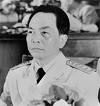


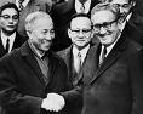










TLW's Vietnam War Historyscope |
By T.L. Winslow (TLW), the Historyscoper™ |
© Copyright by T.L. Winslow. All Rights Reserved. |
Original Pub. Date: Nov. 1, 2012. Last Update: Dec.21, 2024. |



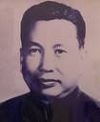


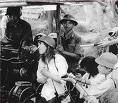
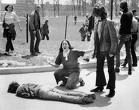

Westerners are not only known as history ignoramuses, but double dumbass history ignoramuses when it comes to the Vietnam War of Nov. 1, 1955 - Apr. 30, 1975. Since I'm the one-and-only Historyscoper (tm), let me quickly bring you up to speed before you dive into my Master Historyscope.
2879 B.C. is the date of the legendary founding of the feudal Van Lang Kingdom in the Red River Delta of Vietnam by the first Hung Vuong (Hung King) (ends -258); the pop. consists of the Chams, a Caucasoid people from India who end up as Muslims.
In 258 B.C.E. the Van Lang Kingdom (begun in -2879) in Vietnam ends, and the Au Lac Kingdom in the S begins (ends -208) (-257 to -179?) - hung, thuc, wang, dong?
In 214 B.C.E. Chinese emperor Qin Shi Huang Di conquers N Vietnam, dividing it into three commandaries; he then orders construction of the the 1.4K-mi.-long Great Wall of China (Wanli Changcheng) (not really visible from space?) to protect it from the Huns of C Asia, who have advanced the art of war with ironware, stirrups, the long-range bow, and stiff military discipline.
In 208 B.C.E. the Au Lac Kingdom in Vietnam (begun -258) ends, and the Trieu Dynasty (ends -111) begins when the gov. of one of the three Vietnamese commanderies conquers it and renames it Nam Viet (Vietnam).
Ta Ta Ta? Vietnam has its Armageddon, followed by a Millennium of Darkness?
In 111 B.C.E. China conquers
Nam Viet AKA
Viet Nam,
ending the Trieu Dynasty (begun -208), and renaming the country
Giao-Chi (Jiaozhi), ruling Vietnam for 1K years (until 938 C.E.).

In 1 C.E. the pop. of N Vietnam (Jiaozhi province of China) is 1M. In 39 C.E. after a Chinese cmdr. rapes Trung Trac and kills her hubby, Vietnamese sister-queens Trung Trac and Trung Nhi rebel against China, forming an army of 80K men and women, setting up their own independent kingdom next year (until 42) extending from the Hue River N to S China, with court at Me-linh on the Hong River, abolishing the hated Chinese tribute taxes. In 42 C.E. the Chinese under Gen. Ma Yuan "the Wave Tamer" (-14 to 49) invade pesky Vietnam and conquer sisters Trung Trac and Trung Nhi, along with their female comrade Phung Thi Chinh (who delivers a baby while leading an army, never skipping a beat), who all commit suicide by jumping into a river, becoming symbols of Vietnamese resistance to the Chinese; Vietnam remains under Chinese control until 938.
In 938 the Chinese-speaking Mongolian Annamese defeat the S Han Chinese at the Battle of Bach Dang, freeing Annam (Vietnam) from Chinese control for 1K years (until 1940, except 1407-1428), adopting the name Dai Co Viet (Great Viet State); the Annamese begin driving the aboriginal Caucasoid Chams to the S. In 939 Ngo Quyen (898-944) declares himself king of Annam (Vietnam). In 968 Dinh Bo Ling (925-79) founds the Red River, Black River kingdom of Dai Co Viet near the S rim of the Red River plain in Vietnam, with capital at Hoa-lu. In 972 Dinh Bo Ling of Vietnam sends his son to China to establish relations and obtain recognition.
In 979 Le Hoan (941-1005), CIC of the armies of Emperor Dinh Bo Linh hooks up with the queen mother, detrones and assassinates him and his son, and proclaims himself king of Annam (Vietnam), then defeats a Chinese expeditionary force, promising them a tribute every three years in exchange for peaceful relations, and founding the Early Le Dynasty (ends 1009), becoming the first attempt to consolidate Vietnam incl. a new road network.
In 1005 Le Hoan dies, and Le Long Dinh (Le Ngoa Trieu) (986-1009), "the reclining emperor" becomes king of Vietnam (until 1009).
In 1009 Le Long Dinh dies, and the Le Dynasty (begun 980) in Vietnam comes to an end after Buddhist monk-raised Ly Cong Uan (Ly Thai-To) (974-1028), cmdr. of the palace guard seizes the throne supported by the Buddhist establishment, founding the Ly Dynasty (ends 1225).
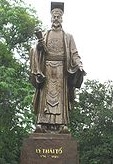
In 1010 Later Ly Dynasty founder-ruler (1009-28) Ly Thai To (974-1028) moves the capital of Dai Viet from Hoa-Lu to Dai La Citadel in La-Thanh, claiming to see a dragon ascending the Red River and renaming it Thang Long ("ascending dragon"), and the former "pacified south province" of China is kicking ass, with its own destiny; in 1397 the capital of Dai Viet is moved to Tay Do (Thanh Hoa), which becomes Dong Do ("Eastern Capital"); in 1802 the Nguyen Dynasty moves its capital to Hue, changing the name to Thang Long ("soaring dragon"); in 1831 Nguyen emperor renames it Hanoi (modern-day pop. 7.6M/16.1M).
In 1028 Ly Thai To (b. 974) dies, and his posth. son Ly Phat Ma (Ly Thai Tong) (1000-54) becomes emperor of Vietnam, going through six reignal titles and proving himself a brilliant leader who knows how to work the bureaucracy and Buddhist clergy.
In 1127 Ly Can Duc dies, leaving no heir, causing Vietnam to degenerate into civil wars for the rest of the cent. (until 1225).
In 1225 the Ly Dynasty in Vietnam ends, and the Tran Dynasty (ends 1400) is founded by the last queen of Ly, from the Tran family of pious Buddhists, who institute a classical Chinese Confucian educational system and compulsory military service.
In 1257 the Mongols attempt to surround the Chinese from the S by invading N Vietnam, but are expelled by next year.
In 1279 Kublai Khan sends an emissary to the Vietnamese emperor in Thang-Long (Hanoi) demanding surrender, and when he refuses he begins a war (ends 1288).
In 1406 Ming Chen Zu sends messengers to Japan, and occupies Vietnam in an attempt to make it a Chinese province (until 1428). In 1407 China conquers Vietnam again for two decades (until 1428).
In 1428 Vietnam regains its independence from China's Ming Empire, with Le Loi (Le Thai-To) (1385-1433) founding the Le Dynasty (ends 1527), calling the country Dai Viet (Great Viet).
In 1527 former royal bodyguard Mac Dang Dung (-1541) deposes the last Le king, seizes the throne of Vietnam, and founds the Mac Dynasty (ends 1692), with the Le (based in Hanoi), Nguyen (based in Hue), and Trinh (based in Hanoi) families vying for power, the latter two pretending to be supporting the Le Dynasty, which nominally continues to rule until 1787.
About 1600 the Nguyen Lords (Chúa Nguyen) begin ruling S Vietnam (Cochin China) (until 1800); N Vietnam is controlled by the Trinh Lords; both go on to gobble up all the land to the point of starving the rest of the pop.

In 1624 Jesuit missionary Alexandre de Rhodes (1591-1660) arrives in Vietnam, and founds a mission in the N in 1627, making 7K converts by the time it closes in 1630; by 1640 there are 82K converts in N (Trinh) Vietnam and 39K converts in S (Nguyen) Vietnam; de Rhodes eventually compiles a Latin-Vietnamese-Portuguese dictionary, using his "quoc ngu" romanization system, which enables missionaries to learn the lingo, and by 1700 there are 45 Roman Catholic priests in Vietnam.
In 1627 the Trinh-Nguyen Civil War in Vietnam begins between the Nguyens in the S and the Trinhs in the N, lasting until 1673, with major campaigns in 1648, 1661, and 1672.
In 1773 the Tay Son brothers of Vietnam capture the city of Qui (Quy) Nhon, freeing merchants from restrictive laws and earning their financial support, scaring the Ngyuen lords, who make peace with Siam and give up some conquered lands, ending the Nguyen War (begun 1770), making Siamese king Taksin go for the title of Great, and causing him to send an envoy to Chinese emperor (since 1736) Qing Qian Long, who recognizes him as king of Siam; too bad, unifying his realm proves so hard that he goes nuts, claiming he's the Buddha and flogging monks who don't worship him?; meanwhile the rival northern Trinh lord Tringh Sam sees his chance and ends a cent. of peace, capturing Nguyen capital Phu Xuan (Hue City), and forcing the Nguyen lords to flee to Gia Dinh (Saigon), allowing the Tay Son brothers to kick butt and gain support.

In Jan. 1789 after the rock-u-like-a-hurricane Tay Son Rebellion sees a Chinese (Qing) army capture Thang Long (Hanoi), the Tay Son army, led by Gen. Nguyen Hue leaves Hue City and scores a V in a surprise attack during the Tet New Year Festival at the Battle of Dong Da Hill in SW Hanoi, uniting N and S Vietnam, after which Hue crowns himself emperor Quang Trung (1753-93) (until 1793), ending the Later Le Dynasty (founded 1428), and founding the romantic Tay Son Dynasty (ends 1802), making 6-tone Vietnamese the official language instead of 5-tone Chinese, distributing land to poor peasants, melting coins to make cannons, and other romantic stuff; too bad, resilient Nguyen leader Phuc Anh's French volunteers arrive in S Vietnam in July, establishing a beachhead and consolidating the area - I love being a Ninja Turtle?

In 1802 Nguyen Phuc Anh ends the Tay Son Dynasty (founded 1789), and founds the orthodox Confucian Nguyen Dynasty in Vietnam (its last) (ends 1945) under the name of Emperor Gia Long (1762-1820), going on to subdue the Trinh Lords, unify the country, and move the capital S from Hanoi to Hue; meanwhile he plays the eager-to-Catholicize French off for military expertise by letting their Roman Catholic missionaries in.
On Feb. 18, 1859 French troops occupy Saigon in an alleged attempt to end 30 years of persecution of Vietnamese Catholics.

In the 1860s the French under Marie Joseph Francis (Francois) Garnier (1839-73) try to find a navigable route up the Mekong (Mae Nam Khong) River into China, but give up after encountering rapids near Kratie, Cambodia, followed by the Khone Falls in S Laos, which has double the water flow of Niagara Falls (most in the world).
On Feb. 25, 1861 a 5K-man French army relieves a blockade of Saigon and gains control of the area after defeating 20K Annamese regulars led by Gen. Nguyen Tri Phuong (1800-73), who had kept 900 French and Spanish troops pinned down; on Nov. 29 former gov. of French Guiana Adm. Louis Adolphe Bonard (1805-67) is given command of French forces in Vietnam, and in Dec. he captures the province of Bien Hoa, decisively defeating Gen. Phuong. In 1862 Vietnamese emperor Tu Duc (pr. doo-yoke) surrenders to the French, who set up the colony of Cochin China (not to be confused with Cochin in SW India).
On Nov. 20, 1873 the French under Francis Garner (b. 1835) take Hanoi, Vietnam; too bad, on Dec. 21 he is killed in a fight with the Black Flags, and the French sign a treaty then abandon Hanoi.
In 1874 there is an internat. fuel shortage, interest rates are sky high, many countries have huge balance of payments deficits, living costs are spiraling upward, retail food prices are too high while farmers are paid too little, and the admin. of the U.S. pres. is riddled with scandal; meanwhile Russian troops are massing along the Chinese border, and Hanoi violates its peace treaties - funny, but the exact same situation occurs in 1974?
In 1874 the seaport of Haiphong (Hai Phong) (Haifong) in N Vietnam in the Red River Delta 20 mi. from the Gulf of Tonkin and 60 mi. E of Hanoi is founded.

Vietnamese cooking is born despite protests by Chinese cooks? On July 17, 1883 Tu Duc dies, and on July 20 his adopted nephew Duc Duc (1852-83) (pr. dzup-duc) becomes Nguyen emperor #5 of Annam (Vietnam), but is executed on trumped-up charges on July 23 after three days, and is succeeded on July 30 by Hiep Hoa (1847-83) as Vietnamese Nguyen emperor #6 (until Nov. 29, 1883); on Aug. 25 the French force the Treaty of Hue, negotiated by Vietnamese PM Nguyen Van Tuong (1824-86), making Annam (Tonkin) (N Vietnam) a French protectorate administered by French residents, disregarding Chinese protests; after a rebellion, on Aug. 30 French ships under Adm. Courbet invade Vietnam, defeating Vietnamese forces outside Hanoi on Sept. 3, and forcing Hoa on Sept. 25 to sign the Harmond Treaty (Convention), a protection treaty; he is then forced to commit suicide on Nov. 29 by regent Don't Do That Yet, er, Ton That Thuyet (1839-1913), and on Dec. 1 Tu Duc's nephew Kien Phuc (1869-84) becomes Vietnamese Nguyen emperor #7 (until July 31, 1884); France fights the Chinese every step of the way and goes on to subdue the remainder of Vietnam and set up three zones: Cochin China (south), the protectorate of Annam (central), and Tonkin (north); meanwhile De Tham (1858-1913) begins a guerrilla war against the French that lasts 30 years.

On May 11, 1884 after Empress Cixi gets pissed-off at their failure to keep the French from taking over Vietnam and dismisses Prince Gong and the grand council, minister Li Hongzhang signs a preliminary convention with French Capt. Francois Ernest Fournier (1842-1934), but that falls through and on June 23 the Chinese defeat the French at the Battle of Bacle (Baclé), leading to an undeclared war; on Aug. 23 the French navy destroys the new Fuzhou arsenal and begins attacking Taiwan. On Aug. 1, 1884 Kien Phuc is poisoned by the regents, and his younger brother Ham Nghi (1872-1943) becomes emperor of French-controlled Vietnam (until July 4, 1885).

On Feb. 3-13, 1885 the Lang Son Campaign sees the Tonkin Expeditionary Corps under Gen. Louis Briere de l'Isle brave logistical difficulties to defeat the Chinese Guangxi Army and capture the strategically-important town of Lang Son, Vietnam. On Mar. 28, 1885 after two French brigades capture Lang Son on the Tonkin border (Upper Tonkin), then send one brigade away to relieve Tuyen-Quang, the Sun Tzu-thumping Chinese kick French butt at the Battle of Lang Son, but too late to keep the French from solidifying control of Vietnam - we're Chinese, we can wait 70 years to get even, right? On July 4, 1885 the Mandarin (Scholar's) Revolt breaks out in Vietnam, and Emperor Ham Nghi and three empresses are kidnapped from the Purple Forbidden City by regent Ton That Thuyet (1839-1913) and taken to the jungle hills around Laos to wage guerrilla war against the French, who install his older brother Dong Khanh (1864-89) as emperor #9 (until Jan. 28, 1889), becoming widely despised; French PM Jules Ferry organizes an expedition to conquer Indochina.
In 1887 the Union Indochinoise is organized by France out of the protectorates of Annam and Tongking in Vietnam.
On Aug. 13, 1888 after being betrayed by his bodyguard and captured by the French, Vietnamese emperor Ham Nghi is sent into exile in Algeria, and ends up marrying French Algerian woman Marcelle in 1904.
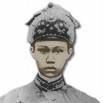
On Jan. 28, 1889 Dong Khanh (b. 1864) dies, and 10-y.-o. older-than-his-years Thanh Thai (1879-1954) becomes emperor of French-controlled Vietnam (until 1907), living through both world wars only to see his own country begin to go down the toilet?
In 1898 the Ecole Francais d'Extreme-Orient is established in Saigon, Vietnam by the French for the study of East Asian culture; moved to Hanoi on Jan. 20, 1900.

In 1907 Vietnamese emperor (since 1889) Than Thai (1879-1954) is arrested by the French when he tries to join a resistance movement, is declared insane and forced to abdicate, and his son prince Nguyen Phuc Vinh San becomes emperor Duy Tan (1899-1945) (until 1916).
In 1911 21-y.-o. Ho Chi Minh (b. 1890) travels from Vietnam to Europe.


On Aug. 4, 1914 - Nov. 11, 1918 the horrific World War I causes 15M deaths and 39M military casualties. and destroys the Old Order of white formerly Christian Europe. On Feb. 26-28, 1915 the Germans first use a Flamethrower (Flame Projector) in the village of Douaumont, France near Verdun, becoming the first of 653 flamethrower attacks in the war. On Apr. 1, 1915 French aviator Roland Garros (1888-1918) becomes the first pilot to shoot down an aircraft using a deflector gear, which allows shooting through the propeller; after more Vs against German aircraft on Apr. 15 and Apr. 18, he is shot down and the Germans capture his plane, after which Dutch designer Anthony (Anton Herman Gerard) Fokker (1890-1939) clones then improves the deflector gear into the synchronization (interrupter) gear, mounting them on the new Fokker E.I. in Aug., beginning the Fokker Scourge as they shoot down nearly every enemy aircraft they encounter and generate the first German aces, incl. Max Immelmann; next year the French counter with the Nieuport 11 Bebe (Bébé), in which the gun is mounted on the top wing clear of the prop, and the British with the F.E.2b and D.H.2 (Feb. 1916), which mount the engine backwards with the prop in back, causing them to be called "pushers", ending the Fokker Scourge by spring 1917. In 1915 arsenic-based vomiting-sneeze gas Adamsite (DM) (diphenylaminechlorarsine) is synthesized by Heinrich Otto Wieland (1877-1958) of Germany; in 1918 Roger Adams of the 1918 duplicates it, and both sides stockpile it, but it is allegedly never used on the battlefield. On Mar. 22, 1916 the British have their first success with their new Depth Charge off the SW coast of Ireland, destroying a German U-boat. Are you used to Hell yet, try this? On Sept. 15, 1916 Winston Churchill's pet project the Tank (Russian Water Closet) (Char-Schneider) is first used by the Brits in the Somme.

On Nov. 3, 1915 after Emperor Duy Than of Vietnam rebels against the French, he is exiled along with his father Than Thai to Reunion Island (until 1945); the French choose Khai Dinh (1885-1925) as the new Vietnamese puppet emperor, and he is enthroned next May 18.

On Dec. 1, 1918 the Central Aerohydrodynamic Inst. (TsAGI) is founded in Moscow by Russian aviation pioneer Nikolai Yegorovich Zhukovsky (Joukovsky) (1847-1921), going on to produce the Yuriev-Cheremukhin TsAGI-1-EA, the first successful single lifting rotor helicopter in 1931-2.

On Jan. 18, 1919 the World War I Peace Congress in Versailles, France convenes on the anniv. of the date in 1870 when the German Empire was proclaimed, with the blockade of Germany continuing to rub salt in their wounds; "There seems to be no limit to French vindictiveness and commercial jealousy" (C.P. Scott); Vietnamese-born Nguyen Ai Quoc (Nguyen the Patriot), who at the start of the war worked in the kitchen of the Carlton Hotel in London (a favorite of David Lloyd George and Winston Churchill) tries in vain to submit a Vietnamese 14 Points paper to Pres. Wilson, later going Commie and changing his name to Ho Chi Minh ("He Who Enlightens") (1890-1969).

On Nov. 6 1925 emperor (since 1916) Khai Dinh (b. 1885) of Annam (Vietnam) dies, and in Jan. 1926 his son assumes the throne under the title Bao Dai ("keeper of greatness") (Nguyen Vinh Thuy) (1913-97), becoming the last emperor of Vietnam (#13) (until Apr. 30, 1955), immediately abolishing the kow-tow - don't bow down to bao dai?
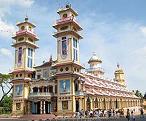
In 1926 the syncretistic monotheistic vegetarian religion of Cao Dai (Vietnamese "high place") is founded in Tay Ninh (55 mi. NW of Saigon), South Vietnam, growing to 4M-6M adherents by modern times, complete with a Roman Catholic Church-like hierarchy and Holy See, building a temple (holy see) in 1933-55, later cloning it in in Dallas, Tex. and other countries.
On Feb. 8, 1930 Ho Chi Minh founds the Indochina Communist Party, and drafts a Program for Vietnamese Communists; on Feb. 9 the Yen Bai Insurrection is quickly quashed, and someof its leaders executed; in 1930 the Nghe Tinh Soviet Uprising begins in Nghe An and Ha Tinh Province in C Vietnam, overthrowing the colonial admin. incl. Vietnamese landlords and the mandarinate and setting up a people's repub.; it is quashed by 1931.
In Oct. 1934 the 100K-man 1st Front Red Army of Mao Tse-tung begins the 6K-mi. Long March (ends Oct. 1936) from their HQ of Juichin in Kiangsi through Kweichow and Szechwan to Yenan (Wuch'ichen) in Shenai, reading their mud-soaked Sun-Tzu all the way while losing 70K men, and making their HQ there for the next 10 years; a 2005 bio. of Mao claims he was carried on the march.

In 1940 the undeclared Japanese war on China causes the Kuomintang Nationalists and the Communists to table their civil war in favor of ousting the Japanese; the Communists have 800K members with a secure base in Yan'an in Shaanxi Province; the Kuomintang are based in Chongqing (Chungking) in Sichuan Province, and mess up by abusing the local pop. while the Communists offer them the moon, and found a univ. at Yan'an to breed anti-Japanese pro-Commie thinkers - facts are not neutral and whoever controls the schools controls the world? On Aug. 20, 1940 the Battle of a Hundred Regiments (ends Dec. 5) pits the Chinese People's Liberation Army under Gen. Peng Dehuai (1898-1974) in a series of assaults on strategic Japanese points in N China; the Japanese beat the Communists back after taking heavy casualties, retaliating against the local pop.

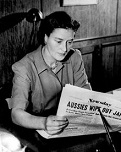

On Sept. 3, 1940 Newsday daily tabloid newspaper is founded in Hempstead, Long Island, N.Y. by Alicia Patterson (1906-63) (daughter of New York Daily News owner Joseph Medill Patterson, who fired her as a writer), who becomes ed.-publisher, and her 3rd husband Harry Frank Guggenheim (1890-1971), who becomes pres. after returning from military duty during WWII, becoming the largest suburban mag. in the U.S., and reaching 450K circ. when it receives the Pulitzer Prize in 1954; after Patterson dies on July 2, 1963, Guggenheim becomes ed.-publisher, hiring his friend John Steinbeck to write a series of letters titled "Letters to Alicia", airing his regret at the moral decline of the U.S. and supporting LBJ's handling of the Vietnam War; in 1967 Hugo, Okla.-born former White House press secy. (1965-7) (since 1965) Billy Don "Bill" Moyers (1934-) becomes ed.-publisher, steering it to the left, hiring writers incl. Saul Bellow, Pete Hamill, and Daniel Patrick Moynihan and winning two more Pulitzer Prizes, and supporting Vietnam War protesters, pissing-off Guggenheim, who supports Richard Nixon while he supports Hubert Humphrey, causing him to sell it to the conservative Times-Mirror Co. despite Moyers offering $10M more, causing him to resign in 1970 and launch the news program Bill Moyers Journal on PBS-TV in 1971-81 and 2007-10.
On Sept. 23, 1940 the Japanese invade Lang Son Province in N Vietnam from S China, and occupy Indochina; the French flee, giving over their military installations to the invaders to avoid destruction of the country; on Sept. 27 a Communist-led anti-French rebellion begins in Bac Son in N Vietnam.
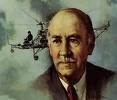

On May 13, 1940 Ukrainian-born Igor Ivanovich Sikorsky (1889-1972) (1889-1972) of the U.S. makes his first free flight in the Vought-Sikorsky VS-300, giving the U.S. heli power.

In Feb. 1941 the Communists in Vietnam reorganize into the First Co. of the Nat. Salvation Army, and are destroyed in an ambush by French troops in Sept. - but the other Commies can't live without their love? On May 19 "Uncle" Ho Chi Minh ("He Who Enlightens") (1890-1969) (Nguyen Sinh Cung) (Nguyen Ai Quoc) (Nguyen the Patriot) (Nguyen That Thanh) (Nguyen Van Thanh) forms the Viet Minh (Viet Nam Doc Lap Dong Minh) (League for the Independence of Vietnam). On July 21 Vichy France yields military control of Indochina to the Japanese while retaining some sovereignty, and on July 28 140K (125K?) troops occupy it, although the French only authorized 40K; on July 29 they occupy Cam Ranh Bay naval base 800 mi. from Manila and Singapore; on July 26 pissed-off FDR seizes all Japanese assets in the U.S., after which the British and Dutch East Indies do ditto, cutting off 75% of Japan's overseas trade and 90% of its oil imports, leaving it a 3-year supply; the Panama Canal is closed to Japanese shipping; Gen. Douglas MacArthur assumes command of U.S. forces in the Far East and Philippines, who face the Japanese in French Indochina across the South China Sea; the Japanese occupy Saigon with Vichy approval.
In 1944-45 Vietnam suffers a famine in which 2M starve to death. On Feb. 9, 1945 the Japanese army in Indochina attacks the French in Saigon, Hanoi, and other major cities, and on Feb. 11 Emperor Bo Dai declares the independence of Vietnam; on Apr. 7 Tran Trong Kim (1883-1953) becomes PM, and picks a cabinet on Apr. 17; in mid-Aug. the puppet regime collapses. On May 9 the Battle of Lang Son in Vietnam is a V over the French by the Japanese, who massacre the survivors.




On Aug. 19, 1945 after being saved by a U.S. unit while helping the Allies, Ho Chi Minh (1890-1969) seizes power, and on Sept. 22 establishes a provisional govt. in Hanoi; on Aug. 22 British aircraft drop Free French paratroopers in S Indochina; on Aug. 23 Emperor Bao Dai abdicates and goes into exile in Hong Kong and China, while the French under Gen. Jean-Etienne Valluy (1899-1970) attempt to reclaim Vietnam by force with an all-out attack on Hanoi, incl. house-to-house fighting, capturing it after killing 1K-20K incl. all the Vietminh snipers; on Sept. 2 Ho proclaims the Dem. Repub. of Vietnam, causing civil war to break out; meanwhile after issuing a Declaration of Independence (DOI) modelled after the U.S. version (which was given to him by Am. writer William Lederer in 1940) Ho's Letters to Truman (starting Feb. 16), citing George Washington and asking for help go unanswered - did he lose face? On Sept. 2 Ho Chi Minh (1890-1969) becomes pres. of the Dem. Repub. of Vietnam (until Sept. 3, 1969). On Sept. 8 Operation Masterdom is launched by the French with British, Indian, and ex-POW Japanese troops led by French Col. Henri Cedile and British Maj. Gen. Sir Douglas David Gracey (1894-1964), becoming the first direct anti-Communist struggle after WWII; on Sept. 22 they overthrow the Communist govt. in Saigon, causing the Commies to regroup and counterattack, killing 100+. Only one day after the world war is named, the Vietnam War begins? On Sept. 26 while searching for missing U.S. pilots and being mistaken for a French officer by Viet Minh guerrillas, OSS Lt. Col. Albert Peter Dewey (b. 1916) (distant relative of N.Y. Gov. Thomas E. Dewey) becomes the first American to die in Vietnam during the fall of Saigon to 14K French troops who were released by the British from internment camps on Sept. 13 and went on a rampage; in Oct. 35K French troops arrive in Vietnam, restoring French rule. On Dec. 15 Vietnamese leader Ho Chi Minh (who earlier in the year had been rescued by U.S. troops when fighting for the Allies) sends a note to the new French PM Leon Blum asking for peace talks.; on Dec. 17 after after three French soldiers are killed in Hanoi, the French land in Haiphong Harbor, with French gen. Jean-Etienne Valluy uttering the soundbyte "If those gooks want a fight, they'll get it." On Dec. 25 deposed Vietnamese emperor (1907-16) Duy Tan (b. 1899) dies in a mysterious plane crash, and his exiled father is allowed to return to Vietnam but remains under house arrest until his death in 1954.
How did the U.S. get to the point of fighting George Washington? On Mar. 6, 1946 after Ho Chi Minh makes the mistake of trusting the French to help him oust 150K Nationalist Chinese who are raping and pillaging in the N, the Mar. Agreement sees France recognize Vietnam statehood within the Indo-Chinese Federation, with Ho Chi Minh as pres.; too bad, they soon renege, and on Dec. 28 they declare martial law, starting the First (French) Indochina War (ends May 7, 1954); meanwhile the history ignoramus Yanks blindly back the Frogs against the George Washington of Vietnam, known for reciting the U.S. Declaration of Independence to his people, who break out in cries of joy, giving the French $2B in aid, throwing Ho and his people into the arms of their ancient enemies the Chinese. On Nov. 23 a French naval fire in Haiphong, Vietnam kills 6K (2K?).

On Jan. 9, 1947 the First (French) Indochina War ramps up as French gen. Jacques Leclerc (b. 1902), CIC of French troops in Indochina breaks off all talks with Vietnam's Ho Chi Minh, and in Feb. is appointed inspector of land troops in North Africa, then on Nov. 28 is killed in an airplane crash at Colomb-Bechar; on Jan. 19 French forces begin a drive on Hue, Vietnam, and go on to take most of the provincial capitals of N and C Vietnam in Jan.; Hue falls in early Feb.; meanwhile the French encircle the Vietminh base at Viet Bac ("North Vietnam"), and almost capture Ho Chi Minh, who escapes through a camouflaged tunnel, after which French gen. Jean-Etienne Valluy decides that his 15K men can't cover 80K sq. mi. of territory to ferret out the 60K Commie troops, and withdraws to a string of forts along Route 4 between Lang Son and Cao Bang, which becomes known as Rue sans Joie (Street Without Joy) after it becomes the scene of regular Vietminh ambushes; meanwhile the SDECE (French military intel) starts working with opium producers in the Golden Triangle to fund its covert operations, which evolves into the French Connection.



The Chinese Civil War ends with Mao painting the town Red? On Jan. 1, 1949 Peking (renamed Beijing next year) is taken by the People's Liberation Army without a fight, thanks to the work of Chinese Communist gen. Peng Zhen (1902-97); the Kuomintang collapses, ending the Chinese Civil War (begun Jan. 1946), and by Dec. Gen. Chiang Kai-shek flees with his 600K-man army to Taiwan, vowing to return one day; on Aug. 28 the U.S. State Dept. produces a White Paper on China, claiming that the U.S. had gone as far as an ally could go and that it's all Chiang Kai-shek's fault, becoming the last non-muddled report the U.S. State Dept. produces?; on Sept. 21 prosperous Chinese peasant's son Mao Tse-tung (1893-1976) proclaims the creation of the People's Repub. of China (PRC), with Zhou En-lai (1898-1976) as PM, finally adopting the Gregorian Calendar; on Oct. 1 Mao raises its very very red flag in a ceremony attended by umpteen zillions in Tiananmen Square, who believe this to be the 2nd greatest event in human history after the 1917 Bolshevik Rev. as they throw off the humiliating yoke of imperialism and capitalism to become slaves of the state?; on Oct. 2 the Soviet Union formally recognizes the PRC; on Dec. 2 Chiang Kai-shek proclaims Taipei, Taiwan as the temporary capital of "real" China; as the years go by, Mao centralizes absolute power to himself, becoming a de facto emperor - the more China changes, the more it stays the same?
In 1949 Emperor Bao Dai is restored to the Vietnamese throne under French control.
On Jan. 2, 1950 reacting to the Viet Minh rebellion in Vietnam, the French grant Vietnam, Cambodia, and Laos full independence within the French Union; the U.S. and U.K. recognize the Vietnamese govt. of Emperor Bao Dai; this doesn't stop Cambodian king (since 1941) Norodom Sihanouk from demanding that the French leave the country, causing him to flee to exile to Thailand in 1952 and work for complete independence; meanwhile Pres. Truman sends Ugly American military advisors to Vietnam to help the French. On Jan. 12, 1950 U.S. secy. of state Dean Acheson delivers his Perimeter Speech, outlining the boundary of U.S. security guarantees vis a vis Asia.
In 1951 Royal Prince Souphanouvong of Laos, half-brother of Prince Souvanna Phouma organizes the Pathet Lao ("Land of Laos") Communist independence movement in North Vietnam.


On Oct. 29, 1952 after Viet Minh guerrilla forces gain control of the countryside in French-controlled Vietnam, French forces launch Operation Lorraine against Viet Minh supply bases in Indochina in order to lure them into an open battle; after they fail to bite, the operation is ended on Nov. 8. On Nov. 29, 1953 after French paratroopers capture it, the French, in a misguided attempt at drawing the Viet Minh insurgents into a death trap establish a garrison camp at Dien Bien Phu in NW Vietnam at the Laos-Vietnam border; in Dec. Paris-born Col. Christian Marie Ferdinand de la Croix de Castries (1902-91) is promoted to brig.-gen. and placed in command of the 250K-man French army in Vietnam and Cochin China, ordering the entrenching of Dien Bien Phu against the 125K-man Communist army under Gen. Vo Nguyen Giap (1911-2013); too bad, the French make the mistake of believing that the Vietnamese can't bring enough troops and arms to that remote point, and end up outnumbered by 4-1.


On Jan. 20, 1953 (two days after the birth of TLW) Repub. 5-star gen. Dwight David Eisenhower (1890-1969) became U.S. pres. #34. Anti-Commie poker-playing Quaker Richard Milhous Nixon (1913-94) became U.S. vice-pres. #36 (youngest so far). Ike was the first U.S. pres. in the 20th. cent. without a double letter in his name, unless you count initials, and the first U.S. pres. to ride in a helicopter. Ike's favorite books were Zane Grey Westerns, since he once considered working as a cowboy in Argentina. Ike's Jehovah's Witnesses background was covered-up. During his administration, the U.S. was the cock of the rock and world policeman, profoundly safe yet suffering from nuclear paranoia and the Red Scare. At least nobody in the U.S. govt. could begin to conspire against the Great White Chief and get to first base.
On Feb. 26, 1954 U.S., British, Soviet, and French foreign ministers meeting in Berlin agree to sponsor a conference on Far Eastern affairs incl. the Korean question, and on Apr. 26 the Geneva Conference convenes (until June 15) to discuss what to do about Korea and Indochina, attended by reps. of 19 states (the Soviet Union and all South Korean war belligerents except South Africa); on June 15 after the Communists demand that a neutral-nation commission supervise Korean elections rather than the U.N., the U.N. delegation walks out; on July 21 (3:42 p.m.) a truce is signed bringing an end to the 8-y.-o. Indochina War.



After 8 years of civil war, Vietnam's problems are over? On May 7, 1954 after 1.5K French KIA and 400 wounded vs. 8K Vietnamese KIA and 15K wounded, French Brig. Gen. Christian Marie Ferdinand de la Croix de Castries (1902-91) surrenders Dien Bien Phu and 10K men to Viet Minh guerrillas under Gen. Vo Nguyen Giap (1911-2013), ending a cent. of French colonialism in Indochina, and giving Vietnamese guerrillas an aura of invincibility (we don't care how good your cuisine is?); in Aug. there is a 9-power conference in Geneva about Korea and Vietnam, where the French agree to pull out of Vietnam after it is divided into North Vietnam and South Vietnam, with Ho Chi Minh as PM of the Dem. Repub. of North Vietnam (ends 1976), devout monklike Roman Catholic staunch anti-Communist Ngo Dinh Diem (pr. ziem) (1901-63) as PM of the Repub. of South Vietnam (ends in 1975), and playboy Emperor Bao Dai remaining in nominal power, with a 2-year deadline for nat. elections to reuinite the country under Ho or Diem; the Communists officially occupy Hanoi to large celebrations; taking advantage of a free migration policy, about 1M mainly Roman Catholic Vietnamese migrate S to escape Ho and the atheistic Viet Minh, while a smaller number move N to join them, later returning as soldiers; the U.S., which paid $2B (about 78% of the French war effort in Indochina) sees red, believing that Ho is just a puppet of Beijing and Moscow, and the first of several dominoes that will soon fall in Indochina, when actually Ho is just the George Washington of Vietnam, putting patriotism above Communism, and the U.S. should have helped Ho oust the French colonizers and declare the entire country independent of France, Russia, and China, becoming a bulwark against the real domino theory, which is that the dominoes are being pushed by Red China in order to later gobble them all up; since for the next few years the North Vietnamese are busy cleaning their own house, Roman Catholic U.S. puppet Diem appears good to the West, Life mag. calling him "the tough miracle man of Vietnam", The Saturday Evening Post calling him "the bright spot in Asia", and a "mandarin in a sharkskin suit who's upsetting the Red timetable"; French forces evacuated from Vietnam are moved to Algeria, where the French-Algerian War (ends Mar. 19, 1962) against the Nat. Liberation Front (NLF) begins on Nov. 1 - the birth of modern Islamic terrorism is the result of Commies in Southeast Asia winning one for Uncle Ho?
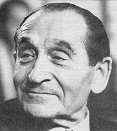
On June 18, 1954 after the defeat at Dien Bien Phu causes Joseph Laniel to resign, Sephardic Jewish Radical Socialist Pierre Mendes (Mendès) (1907-82) becomes PM #143 of France (until Feb. 23, 1955); his ministers incl. up-and-coming Francois Mitterrand; Mendes immediately negotiates an armistice with Ho Chi Minh, and the assembly votes 471-14 for total withdrawal from Indochina despite opposition by the Roman Catholic Church for abandoning Vietnamese Catholics to Commies, plus anti-Semitic reaction against Mendes; Mendes goes on to make an agreement with Habib Bourguiba of Tunisia for independence in 1956, begin discussions for a French withdrawal from Morocco, favor concessions to the Algerian nations, and promote a Western European Union; Bob Denard (Gilbert Bourgeaud) (1929-2007) attempts to assassinate Mendes, and receives a 14-year sentence, later becoming a mercenary and converting to Islam.
On July 14, 1954 after U.S. military intervention in Vietnam is ruled out, Pres. Eisenhower and British PM Winston Churchill sign the Potomac Charter in Washington, D.C., stating that the U.S. and Britain will respect any agreement that preserves the S half of Vietnam and does not exclude the possibility of eventual unification under a non-Communist govt. by peaceful means; in Aug. 1941 Churchill and FDR signed the Atlantic Charter, but that one worked?

In Aug. 1954 after resigning as senior White house adviser in Mar., C.D. Jackson introduces Ike to CIA-connected MIT economists Walt Whitman Rostow (1916-2003) and Max F. Millikan, who recommend that the U.S. boost foreign aid for development from $200M to $2B a year, and he bites despite the difficulty of Congressional approval, which is hampered by Southern Dems. and Repubs., requesting $200M next Apr. for Asia, which they cut in half then eliminate in 1956; meanwhile on May 21 Rostow and Millikan write a letter to CIA dir. Allen W. Dulles, with the soundbyte: "First, any possible salvage of all or part of Indo-China requires that the Indo-Chinese believe we are in Asia to stay, not merely in a military sense, but politically and economically as well." In 1960 Rostow pub. The Stages of Economic Growth: A Non-Communist Manifesto, proposing the Rostovian Takeoff Model of Economic Growth, with five basic stages: traditional society, preconditions for takeoff, takeoff, drive to maturity, and age of high mass consumption; the book impresses pres. candidate JFK, who makes him an adviser, then appoints him as an asst. to nat. security adviser McGeorge Bundy, getting promoted to his job by LBJ and becoming LBJ's main war hawk; too bad, he says that the preconditions for takeoff can be speeded up via not only infusions of Western knowhow and culture to backwards benighted Third World countries, but diffusion of Western culture, triggering anti-Westernism.

In 1954 Ewan MacColl (1915-89), the British Communist father of Kirsty MacColl releases The Ballad of Ho Chi Minh, which becomes a big hit in Vietnam.
The Chinese try to bait the U.S. by giving it a pescadillo, and Ike gets a new power for the presidency to get the U.S. into all kinds of trouble worldwide? On Jan. 18, 1955 after Pres. Eisenhower informs the Chinese that any attack on the Pescadores (64 islets 30 mi. from Formosa in the Taiwan Strait) would be interpreted as a planned invasion of Formosa and resisted by the U.S. Seventh Fleet, the Chinese Communists occupy tiny Yikiang, one of the Tachen Islands 200 mi. N of Formosa while increasing their attacks on Quemoy and Matsu (all 5-10 mi. away from the mainland); Pres. Eisenhower addresses Congress on Jan. 24, asking for authorization to use U.S. armed forces in the defense of Formosa and the Pescadores (deliberately avoiding mention of Quemoy and Matsu), but on his call not theirs; the Senate passes the resolution 85-3 and the House 410-3, and Ike signs it on Jan. 29; Adlai Stevenson observes that Congress has given the pres. a "blank check", which one day might be cashed wihout consulting them again, which proves true in Vietnam. On Oct. 26, 1955 Ngo Dinh Diem wins a rigged plebiscite abolishing the monarchy and proclaiming the Repub. of Vietnam, and Emperor Bao Dai goes into exile in France until his death in 1997.

In 1955 British novelist Graham Greene (1904-91) pub. the novel The Quiet American; if only the U.S. govt. had read it, they might have avoided the Vietnam War?

In Mar. 1956 Am. anti-Communist Roman Catholic physician Thomas Anthony "Tom" Dooley III (1927-61), who volunteered for duty in Vietnam in 1954 and ended up in a refugee camp in Haiphong for 8 mo., and pub. the hit anti-Communist book Deliver Us from Evil resigns from the U.S. Navy under pressure after being investigated for homosexual activities, then builds a hospital in Nam Tha, Laos, followed by Muong Sing, Laos, and founds the Medical Internat. Committee (MEDICO) to aid underdeveloped countries; too bad, he has to hang it up early in life after contracting cancer - hang down your head jokes here?
On July 20, 1956 free unification elections scheduled to be held in Vietnam per the 1954 Geneva agreement are cancelled by Diem, who knows that Ho Chi Minh would easily win; thus are created the Viet Cong and a you know what, though at the time nobody notices.
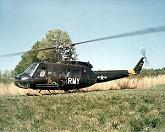
On Oct. 20, 1956 the 2-blade single turboshaft engine Bell UH-1 Iroquois "Huey" (originally HU-1) military heli makes its first flight, turning the Vietnam War into a Huey war, with 7K seeing service; 16K are built by 1986.

In Mar. 1957 Elbridge Durbrow (1903-97) becomes U.S. ambassador to South Vietnam (until Mar. 1961).
On May 6, 1959 the Diem regime in South Vietnam proclaims Law 10/59, which enacts draconian penalties incl. death and confiscation of property for subversive activities, backfiring and spawning uprisings in Quang Ngai Province in the north, where 16K rebels seize 16 villages in Tra Bong district and establish a liberated zone of 50 villages; these uprisings were not directly supported by Hanoi, just local Viet Minh with the Mission: Impossible of pushing the inevitable Communist rev. along, but now Hanoi sees it chance, and on May 19 North Vietnamese Gen. Vo Nguyen Giap establishes Group 559 to begin building the Ho Chi Minh Trail in preparation for invasion of South Vietnam.
On May 19, 1959 the Peoples' Army of Vietnam's Military Transportation Group 559 is formed on the 69th birthday of Ho Chi Minh, resulting in the creation of the Ho Chi Minh Trail.
On July 8, 1959 U.S. military advisors Maj. Dale R. Ruis and MSgt. Chester M. Ovnand are killed and a 3rd wounded by terrorists in Bien Hoa, Vietnam (20 mi. N of Saigon) while watching the Jeanne Crain film The Tattered Dress in a mess hall, after they open fire when a sgt. switches on the lights, becoming the first Americans killed in the Am. phase of the Vietname War.
On Sept. 2, 1959 after the agreement between the royal govt. of Laos and the Communist Pathet Lao breaks down and civil war resumes, with rebel soldiers led by Capt. Kong Lee trying to overturn the pro-Western govt. of PM Tiao Samsonith, Pathet Lao rebels aided by North Vietnam regulars open a major offensive in Laos, capturing 80 villages in the N, causing the govt. to ask the U.N. to send an emergency force to stop "aggression" by North Vietnam; on Sept. 16 a U.N. subcommittee on Laos begins an investigation in Vientiane, which concludes on Nov. 6 that it finds no clear evidence of direct participation by North Vietnamese troops.





On July 30, 1960 60K Buddhist monks march in protest of the pro-Catholic Diem regime in Vietnam. On Nov. 11, 1960 the 1960 South Vietnamese Coup Attempt by a paratroop brigade in Saigon, led by Lt. Col. Vuong Van Dong traps pres. Ngo Dinh Diem in the Independence Palace, after which he stalls them until his own forces have time to arrive and quash them on Nov. 12 (400 casualties on both sides), causing the leaders to flee to Cambodia, after which Diem orders a crackdown, imprisoning former cabinet ministers and critics, and condemning the plotters in absentia to death; after murdering 1.2K of his own govt. officials last year, only to see the Commies keep coming, Diem assumes dictatorial powers to combat them, causing them on Dec. 20 to secretly form the Nat. Front for the Liberation of South Vietnam (NLF), made up from over a dozen different political and religious groups, led by non-Marxist atty. Hua Tho; they announce the 10-Point Program of the NLF, incl. a new regime that "represents all social classes and religions", and the big kicker, free land redistribution to peasants, which causes many peasants to support them; early next year the People's Liberation Armed Forces (PLAF) AKA the Viet Cong (VC) are created as the military arm of the NLF by the North Vietnamese; meanwhile after a power struggle, aging North Vietnamese Communist leader Ho Chi Minh ("He Who Enlightens") (1890-1969) (real name Nguyen Singh Cung et al.) becomes a figurehead pres., and Le Duan (1907-86) becomes the real boss, masterminding the Vietnam War.
Monday morning couldn't guarantee what? On Jan. 17, 1961 (Thur.) U.S. Pres. Eisenhower gives Ike's Farewell Address on radio and TV, saying "I wish I could say tonight that a lasting peace is in sight. Happily, I can say that war has been avoided", and that the Cold War is a "prolonged and complex struggle with liberty at stake"; he then throws conspiracy theorists a bone with "This conjunction of an immense military establishment and a large arms industry is new in the American experience", adding "In the councils of government we must guard against the acquisition of unwarranted influence, whether sought or unsought, by the Military-Industrial Complex. The potential for the disastrous rise of misplaced power exists and will persist", adding "The prospect of domination of the nation's scholars by federal employment, project allocations, and the power of money is ever-present, and is gravely to be regarded. Yet, in holding scientific research and discovery in respect, as we should, we must also be alert to the equal and opposite danger that public policy could itself become the captive of a scientific technological elite"; as Pres. Eisenhower leaves office, there are only 900 "advisers" in Vietnam, almost all of them military men.



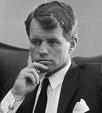

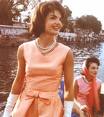









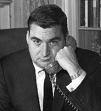
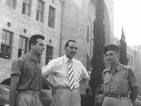



Knocking on Heaven's Door, or Dirty Deeds Done Dirt Cheap, or King Arthur and the Days of Camelot come to the White House, only to be defeated by the mean Dragon of the MIC? On Jan. 20, 1961 (Sun.) 43-y.-o. charisma-maximus Mass.-born Harvard-educated WWII Navy PT-boat hero (first to be knocked-off by the Military-Industrial Complex?) John Fitzgerald "Jack" Kennedy (1917-63) becomes the 35th U.S. pres. (until Nov. 22, 1963) in the 51st U.S. Pres. Inauguration (youngest pres. until?) (first Boy Scout pres.) (first Gemini pres.) (first pres. with an air-conditioned limo) (continues the tradition of all Mass.-born presidents being born in Norfolk County, incl. John Adams and John Quincy Adams); "from a medical standpoint, he was a mess", having been hospitalized more than three dozen times and given last rites 3x; Lyndon Baines Johnson (1908-73) becomes the 37th U.S. vice-pres.; JFK makes wearing hats uncool for decades to come?; the inaug. theme is "World Peace Through New Frontiers"; JFK's Inauguration Address, mainly written by his "intellectual blood bank" advisor Theodore Chaikin "Ted" Sorensen (1928-) (a Nebraskan with a Danish father and Russian Jewish mother), incl. the soundbytes: "The world is very different now, for man holds in his mortal hands the power to abolish all forms of human poverty and all forms of human life. And yet the same revolutionary beliefs for which our forebears fought are still at issue around the globe: the belief that the rights of man come not from the generosity of the state, but from the hand of God. We dare not forget today that we are the heirs of that first revolution. Let the word go forth from this time and place, to friend and foe alike, that the torch has been passed to a new generation of Americans, born in this century, tempered by war, disciplined by a hard and bitter peace, proud of our ancient heritage, and unwilling to witness or permit the slow undoing of those human rights to which this nation has always been committed, and to which we are committed today at home and around the world. Let every nation know, whether it wishes us well or ill, that we shall pay any price, bear any burden, meet any hardship, support any friend, oppose any foe, in order to assure the survival and the success of liberty"; "Can we forge against these enemies a grand and global alliance, North and South, East and West, that can assure a more fruitful life for all minkind? Will you join in that historic effort? In the long history of the world, only a few generations have been granted the role of defending freedom in its hour of maximum danger. I do not shrink from this responsibility, I welcome it. I do not believe that any of us would exchange places with any other people or any other generation. The energy, the faith, the devotion which we bring to this endeavor will light our country and all who serve it, and the glow from that fire can truly light the world. And so, my fellow Americans, ask not what your country can do for you, ask what you can do for you country"; he adds "I now invite all nations, incl. the Soviet Union to join with us in developing a weather prediction program, in a new communications satellite program), and in preparation for probing the distant planets of Mars and Venus, probes which may someday unlock the secrets of the Universe"; on Jan. 21 JFK's brother Robert Francis "Bobby" Kennedy (1925-68) becomes U.S. atty. gen., with JFK explaining that it's "to give him... experience before he goes out to practice law" (which is OK despite nepotism because the Nixon Doctrine says that if the president does it it isn't illegal?); Yale U. grad Burke Marshall (1922-2003) is appointed by RFK as asst. atty. gen. in charge of the U.S. Justice Dept.'s Civil Rights Div. (until Dec. 1964), initially chosen because he's not a known civil rights leader and turning JFK off, who says "I have nothing in common with that man", but who later distinguishes himself by using the U.S. govt. power to regulate interstate commerce as the tool to force black civil rights on states rather than the more obvious 14th Amendment; Dem. Pierre Emil George Salinger (1925-2004) (Jewish father, French Catholic mother) becomes White House press. secy., continuing with LBJ after JFK's death; Repub. Clarence Douglas Dillon (1909-2003) becomes treasury secy. #57 (until 1965); after turning down the treasury secy. job, Oakland, Calif.-born Repub. Robert Strange McNamara (1916-2009) ("an IBM machine with legs") (whose portrait resembles actor James Stewart crossed with a Scottish Terrier and Giant Poodle?) (pres. of Ford Motor Co. for five weeks, first who wasn't a descendant of Henry Ford, one of the Ford Whiz Kids, known for his slicked-back hair, frameless glasses, and statistical-quoting technocrat approach, who made the decision to dump the Edsel, and takes a $3M pay cut to take the $25K-a-year govt. job after visiting JFK in a snowstorm and telling him he has no experience and isn't qualified, to which JFK responds that he had no experience as pres. either but that didn't stop him) becomes U.S. defense secy. #8 (until Feb. 29, 1968) (first to exert civilian control over the military) (the Defense Dept. soaks up 15% of the GDP, and 50% of the federal budget), going on to see the U.S. and Soviet Union come to the brink of nuclear war 3x; "Cold War, hell it was a hot war"; Rockefeller Foundation head (a Dem. from Ga., who only takes the job after he gets a partial pension) David Dean Rusk (1909-94) becomes U.S. secy. of state #54 (until Jan. 20, 1969), JFK snubbing his too-liberal campaign foreign policy advisor Chester Bowles (1901-86) (who becomes undersecy., and is fired before the end of the year) for a conservative figurehead who gives an appearance of not appeasing the Commies, although Rusk is the odd man out in the admin. and a weak secy., and JFK really leans on his 25-year friend William David Ormsby Gore, 5th Baron Harlech (1918-85) (British ambassador to the U.S.) and seems to know more about British than U.S. society and foreign policy, esp. U.S. civil rights, and regards Gore's boss British PM Harold Macmillan as a surrogate father after his own daddy's stroke?; on Jan. 21 Jewish-Am. Dem. Conn. gov. (since 1955) Abraham Alexander Ribicoff (1910-98) becomes U.S. HEW secy. #4 (until July 13, 1962); as Pres. Eisenhower leaves office, there are only 900 "advisers" in Vietnam; JFK goes hatless to his inaguration, and starts the trend toward 2-button suits? easier to get out of when making out?); JFK favors John Wayne Westerns for White House viewing, and his favorite food is tomato soup with sour cream; he is a sex and drug (methamphetamime?) addict, which the press covers up; his two pet cats are named Kitten and Tom; First Lady Jacqueline Lee Bouvier "Jackie" Kennedy (1929-94) (Secret Service codename: Lace) last year hired fashion designer Oleg Cassini (1913-2006) to create her own look, and he decided that she looks Egyptian, "the Cleopatra of the modern era", making use of her broad shoulders, flat chest, thin hips and long torso, causing her to bite big and spend $100K on haute couture clothes this year alone; she smokes cigarettes even though she is never photographed with one; JFK orders a copy of the Robert Preston exercise song Go, You Chicken Fat, Go sent to every U.S. school; in Nov. 1960 UPI correspondent Helen Thomas (1920-) (Greek Orthodox of Lebanese descent) is assigned to the White House, becoming known as "the Sitting Buddha", sitting in the front row and asking the first question, and beginning the tradition of ending all the conferences with "Thank you, Mr. President"; she resigns from UPI on May 17, 2000 after 57 years a day after News World Communications Inc., owned by Rev. Sun Myung Moon acquires it, and joins Hearst Newspapers; after on-camera remarks about Jews needing to leave Palestine and go back to Europe surface, she retires on June 7, 2010. On Feb. 25 Pres. Kennedy appoints egghead (former Harvard dean) McGeorge "Mac" Bundy (1919-96) as nat. security advisor (until 1966); his brother William Putnam "Bill" Bundy (1917-2000) is appointed foreign affairs advisor; both are Yale U. grads, and Mac is a member of Skull & Bones; on Nov. 21, 1963 (1 day before JFK's assassination) McGeorge Bundy drafts sharp escalations to JFK's Vietnam policy called Nat. Security Action Memorandum 273, even though JFK would not have approved them, making him a suspect in the assassination conspiracy too?




On Mar. 15, 1961 U.S. ambassador to South Vietnam (since Mar. 1957) Elbridge Durbrow (1903-97) is replaced by conservative Va. Dem. Frederick E. "Fritz" Nolting Jr. (1911-89) as U.S. ambassador to Vietnam (until June 27, 1963), who arrives in Saigon in May as the Viet Cong begin to dominate the countryside and assassinate village chieftains, changing the U.S. policy from being honest with Diem to being nice to him? On Mar. 23 JFK gives a news conference on Laos, stating that he supports "strongly and unreservedly... the goal of a neutral and independent Laos, tied to no outside power or group of powers, and threatening no one, and free from any domination"; too bad, the Pentagon wants to move in with bombing of Hanoi and China, and even proposes nukes, but he refuses, telling W. Averell Harriman "I want a negotiated settlement in Laos. I don't want to put troops in", and walking out of a meeting with top military advisors after they suggest using nukes in Berlin and Southeast Asia, saying "These people are crazy." In Aug. 1961 JFK's Harvard classmate Theodore Harold White (1915-86) laments about Vietnam that "The situation gets worse almost week by week" and that "Guerillas now control almost all the Southern delta... I could find no American who would drive me outside Saigon in his car even by day without military convoy." In Sept. 1961 Viet Cong guerrillas capture a provincial capital in South Vietnam and execute the gov., causing Pres. Diem to ask the U.S. for a bilateral defense treaty, causing Pres. Kennedy to send hawk Gen. Maxwell Davenport "Max" Taylor (1901-87) and civilian hawk economist Walt Whitman Rostow (1916-2003) as advisors, and they end up writing a report urging Kennedy to send 8K soldiers, but he refuses, saying "It will be just like Berlin"; in Nov. he yields partially, and authorizes a buildup of U.S. strength by sending in support units and advisors, some of which participate in combat; meanwhile JFK requests the military to draw up a plan for withdrawal from Vietnam, stating his determination not to send ground units, citing the French failure as a precedent, desiring Vietnam to be handled by Laos, all of which pisses-off the military, who stonewall. On Nov. 18, 1961 Pres. Kennedy sends 18K military advisors to South Vietnam. On Dec. 11, 1961 the first 100 U.S. military advisors along with 400 soldiers arrive in Vietnam, officially beginning the Vietnam War (ends Apr. 30, 1975); on Dec. 22 James Thomas Davis becomes the first of 90K U.S. military deaths (58K in battle or theater) in Vietnam.
In 1961 the tandem-rotor YHC-1B Chinook Helicopter by Boeing Aircraft begins production, carrying 22.4M people and 1.3M tons of cargo in 161K hours of flying time by 1968 in Vietnam and elsewhere.
In 1962 world pop. officially reaches 3B on Sept. 1. This year the U.S. presence in Vietnam is increased to 11.3K soldiers; between Jan. 18 and 1972 U.S. military tanker planes and helis spray 10M-20M gal. of "Rainbow Herbicides", incl. Agent Orange, Agent Purple, Agent Pink, and Agent Green, plus 375 lb. of Dioxin in Operation Ranch Hand to "deny cover" to Commie forces, causing them to begin hiding in tunnels; in 1984 the Agent Orange Class Action Lawsuit is settled, with a record $180M fund set up for victims, who have to apply by Dec. 31, 1994. This year 50 corps. control the U.S. media, which shrinks to five mega-corps. by the end of the cent.?

On Feb. 16-17, 1962 the leftist Students for a Dem. Society (SDS) and Boston SANE (Greater Boston Committee for a Sane Nuclear Policy) hold the first anti-nuclear march on Washington, D.C., attended by 4K-8K students; on June 15 the Port Huron Statement is issued by the SDS - there is a Garden of Eden? On Feb. 18, 1962 Robert F. Kennedy says that U.S. troops will stay in Vietnam until Communism is defeated; Gen. Paul Donal "Ramrod" Harkins (1904-84) (a past chum and deputy chief of staff of Gen. George S. Patton Jr. in WWII) heads the new Military Assistance Advisory Group (MAAG), which reaches Vietnam this mo.; he defies orders of Pres. Kennedy to tell the plain truth in his reports and instead calls his daily situation reports "The Headway Report"; Harkins and ambassador Frederick Nolting launch the policy of "Sink or Swim with Ngo Dinh Diem", stifling criticism of his regime and torpedoing subordinates who try to tell the truth; on Mar. 22 Harkins begins Operation Sunrise to build a chain of fortified strategic hamlets manned by home defense units run by Pres. Diem's brother Nhu; when guerrilla activity drops, Pres. Kennedy expands his command from 2K to 16K men, and upgrades its name to the Military Assistance Command, Vietnam (MACV). On Mar. 17, 1962 Moscow asks the U.S. to pull out of South Vietnam - what if they say no?

On Apr. 26, 1962 the Lockheed A-12 "Archangel" "Oxcart" "Cygnus" spy plane, designed by Clarence "Kelly" Johnson, using titanium sold unknowingly by the Soviet Union makes its first flight, becoming the first Stealth Aircraft; it can fly at 2K mph and take photos at 90K ft. alt. that can resolve 1 ft. objects on the ground; on May 22, 1967 it is put into service as the successor to the U-2, arriving at Kadena Air Base in Okinawa to begin Operation Black Shield over North Vietnam; too bad, after close calls with North Vietnamese SAMs it is decommissioned next June.

On June 2, 1962 the Internat. Control Commission on Indochina reports that North Vietnam is supplying Viet Cong rebels in violation of the 1954 Geneva Convention on Vietnam; the Polish reps. don't sign the report. On June 22, 1962 King Sisavang Vathana of Laos installs the new coalition govt. under an amended constitution permitting him to bypass the nat. assembly, and new PM Prince Souvanna Phouma declares that Laos no longer recognizes the protection of SEATO; on July 23 the 14-nation Geneva Conference on Laos, co-chaired by Britain and the Soviet Union pledges to guarantee the neutrality and independence of Laos, and forbids the U.S. from invading E Laos, site of the Ho Chi Minh Trail, although nothing prevents them from flying over it and accidentally dropping bombs?; the Pentagon regards JFK's role in the agreement as a surrender to the Communists, and goes on to undermine the declaration of neutrality by supporting Phouma's violations of the ceasefire; on Sept. 17-Oct. 5 the U.S. withdraws its military forces in accord with the Geneva agreement. On Dec. 2, 1962 U.S. Sen. Majority Leader (D-Mont.) Michael Joseph "Mike" Mansfield (1903-2001) becomes the first U.S. official to make an unoptimistic public comment on the progress of the Vietnam War after returning from a visit at JFK's request.

On Jan. 2, 1963 the Battle of Ap Bac in Vietnam sees the Viet Cong kick the ARVN's butt and down five U.S. helis in the Mekong Delta, killing 30, drawing the U.S. further into the war; U.S. Lt. Col. John Paul Vann (1924-72), advisor to ARVN Col. Huynh Van Cao in the C highlands, who directed the battle from a plane attempts to blow the whistle on the ineptness of the military, blaming U.S. Gen. Paul D. Harkins, getting him booted out of the Army within a few mo., then returns in Mar. 1965 as an official for the Agency for Internat. Development (AID) and an adviser to Operation Phoenix, staying on until he dies in a heli crash, and being awarded a Medal of Freedom by Pres. Nixon, and becomes the first civilian in Vietnam to be awarded the Distinguished Service Cross, becoming the subject of the 1988 book "A Bright Shining Lie" by Neil Sheehan. In Mar. 1963 U.S. secy. of state Dean Rusk proposes a pullout plan for Vietnam, which is rejected - early pullout is too Catholic?
On Apr. 2, 1963 Laotian foreign minister Quinim Pholsena (b. 1916) is assassinated in Vientiane by one of his Kong Le Guards, after which fighting erupts between Pathet Lao and neutralist forces; on Apr. 9 the U.S. complains about "a serious violation of the ceasefire" in Laos, and says that there are "indications" that Commie North Vietnamese troops are supporting the Pathet Lao, and on Apr. 10 SEATO calls for pressure against them, and on Apr. 12 U Thant accuses nations of reneging on promises to maintain Laotian neutrality to sell arms to the warring factions, after which the Soviets balk at a British suggestion to join in counseling the neutralist Laos govt.; on Apr. 15 PM Prince Souvanna Phouma negotiates a battlefield truce, breaks down the next day; on Apr. 24 after the U.S. stages naval maneuvers in the Gulf of Siam, hostilities end with an Internat. Control Commission-monitored truce, after which on Apr. 27 Khrushchev agrees that Laos should stay neutral and unified, and issues a joint communique with Kennedy rep. W. Averell Harriman; too bad, the Commies used the opportunity to open a road from the North Vietnamese border to the Pathet Lao military HQ. On Apr. 17 South Vietnamese pres. Ngo Dinh Diem broadcasts a clemency offer to the Commie guerrillas, then flip-flops on Apr. 18, saying that all card-carrying Commies must be destroyed.


On May 6, 1963 the first evidence is claimed by the U.S. that Communists have been parachuting supplies to the Viet Cong guerrillas; meanwhile the U.S. Pacific Command finally gives JFK a plan for withdrawal from Vietnam, but its extended timeline pisses-off defense secy. Robert S. McNamara, who orders them to draw up plans for withdrawing 1K military personnel by the end of the year. On May 7 a U.S. Army Lt. and two South Vietnamese soldiers are killed in an ambush by Communist guerrillas in the back country near Saigon. On May 8 Buddhist monks assemble in Hue, Vietnam to celebrate the 2,527th birthday of Buddha, defying a law against displaying their own non-nat. flags, causing the police to shut them down, firing +into the crowd, killing one woman and eight children, pissing off the monks and causing them to begin protesting the Damn Roman Catholic Diem Regime in South Vietnam, led by monk Thich Tri Quang (1924-); too bad, this only pisses them off and causes more repression as Diem claims that Buddhists are Commies and stations troops around pagodas. On June 5 South Vietnamese troops use gas grenades to end Buddhist demonstrations. On June 9 Communist forces led by North Vietnamese officers menace the HQ of Laotian Gen. Kong Le, causing U.S.-made ammo to be parachuted to him. Siddhartha of Gasoline? On June 11 after the Diem regime steps up persecution of Buddhist monks, and hunger strikes fail to stop it, 60-y.-o. Buddhist superior monk Thich Quang Duc (Lam Van Tuc) (b. 1897) sends a message to Diem: "Enforce a policy of religious equality", and then immolates himself to death with gasoline in a main street of Saigon, causing an internat. uproar, and leading to withdrawal of support for Diem by the U.S., on which he was dependent, believing that as a Catholic God was on his side?; on Aug. 5 after thousands of monks are arrested. a 17-y.-o. Buddhist monk immolates himself in Saigon, followed by four more by the end of the mo., causing Diem's brother's wife Madame Nhu (Tran Le Xuan) (1924-2011) to call them "barbecues" and laugh them off; on Aug. 29 Henry Cabot Lodge Jr. sends a secret telegram to Dean Rusk saying "We are launched on a course from which there is no respectable turning back, the overthrow of the Diem government."
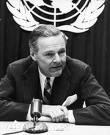
On June 27, 1963 Henry Cabot Lodge Jr. (1902-85) is appointed U.S. ambassador to South Vietnam, taking office on Aug. 26 (until June 28, 1964), soon finding out how corrupt the Diem regime is, and later after his fall fails to find a suitable replacement, recommending that the U.S. make South Vietnam a protectorate to avoid having to pull out entirely, nding up serving from Aug 25, 1965 until Apr. 25, 1967.
In July 1963 the CIA pub. the secret KUBARK Counterintelligence Interogation Manual for use in Vietnam, teaching "coercive techniques" incl. "threats and fear", "pain" (electric shocks), and "debility" (isolation and sensory deprivation); in 1983 they pub. Human Resource Exploitation Training Manual; adopted by the Church of Scientology for brainwashing of members?
On Aug. 21, 1963 the South Vietnamese Army arrests 100+ Buddhist monks in Saigon; on Aug. 24 Pres. Kennedy allows a cable to be sent to ambassador Henry Cabot Lodge Jr. in Vietnam that backs a military coup against Pres. Diem; on Aug. 26 orders come from Washington to destroy all cables sent to Saigon back to Aug 24. On Sept. 2 JFK holds an interview with Walter Cronkite of CBS-TV, answering questions about the Vietnam War, uttering the soundbyte "With changes in policy and perhaps with personnel I think it can" be won; he holds another interview on Sept. 9, with the soundbyte "I don't think that unless a greater effort is made by the government to win popular support that the war can be won out there", and "In the final analysis, it is their war. They are the ones who have to win it or lose it. We can help them, we can give them equipment, we can send our men out there as advisors, but they have to win it, the people of Vietnam, against the Communists"; after referring to "the end of the tunnel" and the fact that the situation goes back 10 years, he concludes with "We can't carry out a direct assault on the government, we have to deal with the government that is there", and endorses the Domino Theory. On Oct. 2 U.S. defense secy. Robert S. McNamara (a Repub.) returns from a tour of Vietnam, which is being called "McNamara's War", and tells Pres. Kennedy in a cabinet meeting that "We need a way to get out of Vietnam", and suggests replacing the 16K U.S. advisors with Canadians within two years (end of 1965); 1K are pulled out by the end of 1963, until the Diem Coup changes everything? On Oct. 11 after Robert S. McNamara returns from a trip to South Vietnam, JFK signs Nat. Security Action Memorandum 263, calling for withdrawal of 1K U.S. military personnel by the end of the year, followed by training the Vietnamese to take over completely by the end of 1965; JFK sent McNamara on the trip in order to recommend what he already wanted?
On Nov. 1-2, 1963 the U.S.-backed Diem Coup in Saigon, led by Gen. Duong Van "Big" Minh (1916-2001) (known for the soundbyte "They had to be killed... Pres. Diem was too much respected among simple, gullible people in the countryside") overthrows the Diem govt., causing South Vienamese pres. (since 1954) Ngo Dinh Diem (b. 1901) and his younger brother Ngo Dinh Nhu (b. 1910) (the brains of the outfit) to escape to the suburb of Cholon, where they are offered safe conduct out of the country, then shit in the back of an armored personnel carrier over Saigon by Capt. Nguyen Van Nhung (1919-64), after which the pop. goes wild with joy, tearing down the statues and photos of Diem and his BBQ-loving sister-in-law Madame Ngo Nhu; "The name I would write under his portrait is the Patriot Ruined by the West" (Graham Greene); the Diem brothers were adamantly opposed to full-scale U.S. military involvement beyond the 16K combat advisers already there?; from now on the U.S. owns Vietnam, and pesky JFK can finally go?; on Nov. 2-3 JFK meets with Defense Dept. and State Dept. officials to discuss the situation.
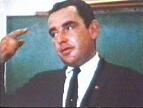
On Nov. 21, 1963 JFK and Jackie begin a 2-day tour of yee-haw Tex.; JFK fails to rehearse for a press conference the next day because his mind is on Vietnam, telling asst. press secy. Malcolm MacGregor "Mac" Kilduff Jr. (1927-2003), "I've just been given a list of the most recent casualties in Vietnam. We're losing too damned many people over there. It's time for us to get out. The Vietnamese are not fighting for themselves. We're the ones who are doing the fighting. After I come back from Texas that's going to change. There is no reason for us to lose another man over there. Vietnam is not worth another American life"; at 9 p.m. JFK gives a speech at the Rice Hotel in Houston at a gala given by the League of United Latin Am. Citizens (LULAC), where they are filmed on 8mm film by Roy Botello (1922-), who keeps the film in his drawer for almost 47 years before releasing it to the public; Jackie gives a speech in Spanish; LBJ says "But I know I speak for all of you when I say that we are very proud and very happy that we have our beloved president and our lovely First Lady here with us tonight."
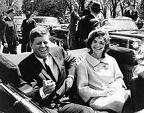

If the government's so perfect, why did it send me a license saying I'm a woman? The You Always Remember Where You Were Day? The Day the U.S. Constitution Died Like That, 1-2-3? A turning point in U.S. history, as the most forked-up official coverup in Illuminati history offers the old One Lucky Plucker Theory, which seems on closer inspection like one of them Japanese magic shows with black ninjas? The JFK Assassination is like a dark alley, with a stand in front holding a voluminous official story, which you are told to accept by the government, while if you try to go in the alley to see for yourself, you will end up dead, and all historyscopers can do is hope to shine a little light in the alley while looking downstream and seeing who had the power to do it, who benefitted, and who had the power to cover it up? The Mighty U.S. comes to a stop for a month, during which who knows what's going on behind the scenes during the nonexistent coup d'etat? "And I saw one of his heads as it were wounded to death; and his deadly wound was healed; and all the world wondered after the beast" (Rev. 13:3)? On Nov. 22, 1963 (11-22-33, er, 11-22-63) (6+3=9 and 22-11=11, thus the first real 9/11?) (Fri.) U.S. pres. (since Jan. 20, 1961) (34 mo., 2 days) after approving a probe to see whether relations with Fidel Castro can be improved earlier this mo., John Fitzgerald Kennedy (b. 1917) is assassinated in Dealy Plaza in Dallas, Tex. From the get-go the U.S. govt. closes ranks, claiming it wasn't a coup d'etat, er, conspiracy, allowing the stink of one to cover it until ? LBJ becomes U.S. pres. #36, immediately ramping the Vietnam War up. On Nov. 29 LBJ signs Nat. Security Action Memo 273, reversing JFK's pullout of U.S. troops from Vietnam, or at least advisors.


On Jan. 8, 1964 LBJ's First State of the Union Address (first to be shown on prime time TV), contains the soundbyte "This administration today, here and now, declares unconditional war on poverty in America", launching his War on Poverty; on Mar. 16 LBJ submits his $1B War on Poverty Program to Congress (ends 1968), designed by economist Walter Heller (1915-87) (not to be confused with "Catch-22" author Joseph Heller), who suggested it to him the day after JFK's assassination; he signs it on Aug. 20, but when LBJ escalates the Vietnam War without raising taxes, Heller resigns; "Wars on nations change maps; war on poverty maps change" (Muhammad Ali) - war on spare change maps national poverty? On Jan. 10 Pres. Johnson holds a meeting with U.S. defense secy. Robert S. McNamara, after which he approves covert operations against North Vietnam. On Jan. 30 a bloodless coup ousts Duong Van Minh, who is replaced as PM of South Vietnam by Gen. Nguyen Khanh (1927-), with Minh allowed to remain as a figurehead chief of state; on July 19 Khanh calls for expanding the war into North Vietnam, after which on Sept. 13 an attempted coup is crushed by air marshal Nguyen Cao Ky, and on Sept. 26 Khanh is demoted to army CIC in favor of Saigon mayor Tran Van Huong (1902-82), who becomes PM of South Vietnam (until Jan. 27, 1965).
On Feb. 1, 1964 Pres. Johnson rejects Charles de Gaulle's plan for a neutral Vietnam - it's black and white, like dominoes? On Feb. 4 the South Vietnamese attack a Cambodian village, pissing-off Norodom Sihanouk, who charges the U.S. with "great responsibility", and asks the U.S. to finance truce observation posts along the border; on Feb. 11 he proposes an internat. conference to guarantee Cambodia's neutrality, and on Feb. 19 suggests that Thailand, South Vietnam and the U.S. sign an agreement on it. On Feb. 9 the U.S. embassy in Moscow is stoned by Chinese and Vietnamese students. On Feb. 27 the Pathet Lao captures strategic positions in the Plaine des Jarres in Laos, causing a conference between the three main factions, resulting on Mar. 16 in an agreement to halt "all military activities" there; on Apr. 19 two rightist generals try to take over the cabinet, causing protests by the Western powers, the Soviet Union and China, and PM Souvanna Phouma agrees to revamp the coalition govt., but the Pathet Lao drops out and resumes fighting by May 16, then on June 1 withdraws all officials from Vientiane, cutting its ties with Phouma's govt.; on June 12 U.S. recon flights find North Vietnamese troops in Laos, and the U.S. finally is resigned to Laos being a Commie haven containing the Ho Chi Minh Trail; the only cheery news for the U.S. is the training of Meo tribesmen to fight them; meanwhile the U.S. begins 580K bombing missions over Laos, dropping 2.3M tons of bombs by 1973, after which dud bombs kill 200 a year until ?.
On Mar. 2, 1964 LBJ holds a conversation with Robert S. McNamara, who tells him that the signs coming from Vietnam are "disturbing", to which LBJ responds that he wants a plan to "kill some of them". On Mar. 10 a Communist delegation leaves Beijing and Moscow to negotiate arms purchases with Cambodia; on Mar. 11 Cambodians attack the U.S. and British embassies in Phnom Penh, causing Norodom Sihanouk to express regret and withdraw his demand for a 4-power conference to guarantee his country's borders; on Mar. 24 Cambodia and South Vietnam formally end their border talks, and Sihanouk unwithdraws his demand, causing the Soviets to request the British to co-chair the conference with them, which the British rejects, and Pres. Charles de Gaulle to promise to use his influence with the U.S. and Britain to get the conference set.
Car toys, a better way to go? On Mar. 26, 1964 U.S. defense secy. Robert S. McNamara delivers a speech reaffirming U.S. support of South Vietnam against the Commies; meanwhile Pres. Johnson signs a document accepting Predelegation of Authority, authorizing senior military cmdrs. to use nukes if the U.S. is attacked by nukes and the pres. cannot be reached, as satirized in the 1963 Stanley Kubrick film "Dr. Strangelove".
On Mar. 29, 1964 the U.S. increases aid to South Vietnam by $50M a year.
In spring 1964 LBJ turns down an offer by U.S. atty. gen. Robert F.Kennedy to go to Vietnam as an envoy or ambassador, countering with an offer to be ambassador of any other country - he should have offered him Dean Rusk's secy. of state job like Obama later does Hillary Clinton?
On May 2, 1964 the first anti-Vietnam War protesters take to the streets in the U.S., incl. 400-1K in Times Square, New York City, 700 in San Francisco, Calif., and smaller groups in Seattle, Wash., Boston, Mass., and Madison, Wisc., spawning the Members of the May 2nd Movement (M2M).
On May 27, 1964 LBJ holds a taped conversation with U.S. nat. security advisor McGeorge Bundy about the Vietnam War, telling him that "It's just the biggest damned mess that I ever saw", that it's not worth fighting for, and that if we went in bigtime we couldn't pull out; at this point there are 16K U.S. troops there and only about 200 have been killed.

I love the smell of napalm in the morning, play the Wagner music, please? On June 20, 1964 S.C.-born gen. William Childs "Westy" Westmoreland (1914-2005) (who in 1956 at age 42 became the youngest maj. gen. in the U.S. Army) succeeds Gen. Paul Harkins as CIC of U.S. forces in Vietnam (until 1968), using his WWII experience leading a fast-moving artillery battalion to orchestrate a "mammoth logistical buildup, various tactical expedients and innovations, the Advisory effort, civic action programs... But perhaps the most impressive of all was the accomplishment for the first time in military history of a true air mobility on the battlefield" (Westmoreland); he goes on to become the U.S. gen. who "won every battle until he lost the war" (Neil Sheehan) - a half head shorter than LBJ?

On June 23, 1964 Henry Cabot Lodge Jr. resigns as the U.S. ambassador to Vietnam, and is succeeded by Kennedy favorite Gen. Maxwell Davenport Taylor (1901-87) (until 1965). On July 8 the U.S. announces that its casualties in Vietnam have risen to 1,387 incl. 399 dead and 17 MIA. On July 14 the U.S. sends 600 more troops to Vietnam. On July 27 Pres. Johnson sends an additional 5K military advisors to South Vietnam, bringing the total to 21K - who are they advising?
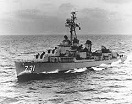
It's our turn to get some Honkin Tonkin joy in Vietnam? On July 30-31, 1964 (midnight) the U.S. Navy fires on the North Vietnamese islands of Hon Ngu and Hon Me; on Aug. 2 (afternoon) destroyer USS Maddox is allegedly attacked in the Gulf of Tonkin by three Vietnamese PT boats from Hon Me, who score one bullet, after which it retreats, then returns on Aug. 3 accompanied by the USS C. Turner Joy, after which on Aug. 3-4 (night) U.S. ships from Danang shell two points on the North Vietnamese mainland; on Aug. 4 (night) both destroyers fire after radar blips indicate a 2nd torpedo boat attack, after which on Aug. 5 carrier USS Ticonderoga helps them sink one gunboat and chase two others, while Operation Pierce Arrow, a bombing of North Vietnam by planes from USS Ticonderoga and USS Constellation takes out a major petroleum storage facility in Vinh; too bad, Navy Lt. Everett Alvarez Jr. (1937-) is shot down and captured in beautiful Ha Long (Chin. "Descending Dragon") Bay, becoming the first U.S. naval aviator captured by the North Vietnamese, and the 2nd longest-held POW in U.S. history (released in 1973 after 8.5 years); on Aug. 5 in response to the 2nd Tonkin Gulf Incident, LBJ gives a U.S. Policy on Southeast Asia Speech at Syracuse U., with the soundbytes "The attacks were deliberate, the attacks were unprovoked, the attacks have been answered", and "There an be no peace by aggression, and no immunity from reply"; on Aug. 7 after U.S. defense secy. Robert Strange McNamara strangely deceives LBJ about the nature of the attack, and the North Vietnamese are characterized as the aggressors despite a report from USS Maddox Capt. John J. Herrick that "freak weather effects" caused false radar readings and that no North Vietnamese patrol boats had been sighted, the U.S. Gulf of Tonkin Resolution is passed 414-0 in the House and 88-2 in the Senate, giving Pres. Johnson virtually unlimited war powers; it is repealed on Jan. 13, 1971; the no votes are from Sens. Wayne Lyman Morse (1900-74) (D-Ore.) (1945-69) and Ernest Henry Gruening (1887-1974) (D-Alaska) (1959-69); in 1971 it is revealed that the U.S. boats violated Vietnamese territorial waters and were the real aggressors; the real aggressors; the Gulf of Tonkin Resolution is LBJ's payback to the CIA for helping him take out JFK?; in 2001 NSA historian Robert J. Hanyok finds that there was no 2nd attack, and that NSA officers deliberately distorted intercepts (the NSA covers this up until 2005); on Jan. 28, 1973 Turner Joy becomes the ship to fire the last official shot of the Vietnam War for the U.S. On Sept. 18 U.S. destroyers fire on hostile targets in Vietnam.


On Oct. 1, 1964 the Berkeley Free Speech Movement (FSM) is launched at the U. of Calif. at Berkeley (UCB) by physics student Mario Savio (1943-96) when police arrest CORE volunteer Jack Weinberg (1940-) for setting up an unauthorized table to distribute political material in Sproul Plaza then failing to show an ID, and 3K students surround the police car in a standoff that lasts 32 hours; on Dec. 2 Mario Savio makes a speech on behalf of the FSM that causes hundreds of students to take over Sproul Hall in Berkeley, incl. then soundbyte "There comes a time when the operation of the machine becomes so odious, makes you so sick at heart, that you can't take part, you can't even passively take part. And you've got to put your bodies on the gears, and upon the wheels, upon the levers, upon all the apparatus, and you've got to make it stop"; on Dec. 3 police move in and arrest 780 (largest mass arrest in U.S. history), causing a student strike and protest rally on Dec. 4 by 10K, with speakers incl. Willie Brown and John Burton, after which on Dec. 8 the UC academic senate passes resolutions affirming the rights of students to participate in political activity, causing the regents on Dec. 18 to forbid Vietnam War protests on school property; next Mar. 12 the San Francisco FBI sends a secret 33-page report on Savio to the main HQ.
On Oct. 16, 1964 China explodes its first A-bomb in Lop Nor (Nur), a lake in the Gobi Desert, and becomes nuclear nation #5 (U.S., Soviet Union, Britain, France), and the first Asian country with nukes; China now has some muscle to challenge Russia for leadership of the Communist bloc of nations; Indonesia announces its intent to pursue a nuclear weapons program - the U.S. hope of winning in Vietnam dies right here?
On Nov. 1, 1964 North Vietnamese mortar fire on the USAF base in Bien Hoa 10 mi. from Saigon in South Vietnam kills four and wounds 72 U.S. servicemen, and destroys five of 30 B-57 jet bombers (deployed on Aug. 4) plus other planes.
On Nov. 10, 1964 Australia begins a draft to fulfill its commitment in Vietnam as well as handle the Indonesians. On Nov. 28 the U.S. Nat. Security Council incl. Robert S. McNamara, Dean Rusk, and Gen. Maxwell Taylor agree on a 2-stage plan to escalate bombing in North Vietnam, and recommend it to Pres. Johnson, who agrees to it on Dec. 1 - glad that pesky JFK is out of the way?
In 1964 the Ho Chi Minh Trail is improved into a real road that can handle trucks; meanwhile U.S. WWII-era Douglas C-47 Skytrain "Gooney Bird" cargo planes (modified DC-3s) are modified for side-firing use in Vietnam, becoming known as "Puff the Magic Dragon" for their super firepower, and "Spooky" for their callsigns.

In 1964 the lightweight air-cooled gas-operated steel-aluminum-plastic 5.56mm (.223 Remington cartridge) M16 rifle, designed by Eugene Morrison Stoner (1922-97) of Armalite Corp. as the AR-15 then sold to Colt enters USAF service, replacing the M14 adopted in 1957, giving soldiers a firepower of 650-700 rounds per min., although magazines only hold 19 rounds; the U.S. Army begins using it in Vietnam next year, and officially adopts the M16A1 on Feb. 28, 1967; too bad, they don't use the recommended new clean-burning gunpowder, making it susceptible to jamming.

In 1964 New York Times journalist David Halberstam (1934-2007) wins a Pulitzer Prize for his reporting on the Vietnam War, incl. his eyewitness account of the self-immolation of Thich Quang Duc; it is later revealed that the FBI tracked him from the mid-1960s until the late 1980s, compiling a 98-page dossier as he gets most of his info. from secret North Vietnamese agent Pham Xuan An (1927-2006) AKA Hai Trung and Tran Van Trung.
On Jan. 22, 1965 Buddhists demonstrate against the South Vietnamese govt. at the U.S. embassy in Saigon, and a 17-y.-o. Buddhist girl immolates herself in protest, causing a power struggle between gen. Nguyen Khanh and Buddhist leader Thich Tri Quang.

On Jan. 23, 1965 U.S. Sen. (D-Ark.) (1945-74) J. William Fulbright (1905-95) pub. the book The Arrogance of Power, which criticizes LBJ's Vietnam policy, calling it imperialist, and advocates direct peace talks between Saigon and the Viet Cong, with the soundbytes: "Many Senators who accepted the Gulf of Tonkin resolution without question might well not have done so had they foreseen that it would subsequently be interpreted as a sweeping Congressional endorsement for the conduct of a large-scale war in Asia", "Gradually but unmistakably America is showing signs of that arrogance of power which has afflicted, weakened, and in some cases destroyed great nations in the past. In so doing, we are not living up to our capacity and promise as a civilized example for the world. The measure of our falling short is the measure of the patriot's duty of dissent", "One detects in Europe a growing uneasiness about American policy, a feeling that the United States is becoming unreliable and that it may be better - safer, that is - to keep the Americans at a distance"; "After twenty-five years of world power the United States must decide which of the two sides of its national character is to predominate - the humanism of Lincoln or the arrogance of those who would make America the world's policeman", and "If the war goes on and expands, if that fatal process continues to accelerate until America becomes what she is not now and never has been, a seeker after unlimited power and empire, then Vietnam will have had a mighty and tragic fallout indeed", shattering the elite consensus that the war is necessary, and energizing the anti-Vietnam War movement; LBJ responds by calling him and other critics incl. RFK names such as "sunshine patriots" and "Nervous Nellies"; Fulbright fires back next year with the speech The Price of Empire, warning how the U.S. is becoming more imperialist than ever, and containing the soundbyte "Some of our policy makers do not understand that it is ultimately self-defeating to 'fight fire with fire', that you cannot defend your values in a manner that does violence to those values without destroying the very thing you are trying to defend." "ill-defined discontent, especially among students and intellectuals, with the accepted and approved modalities of social thought... the views of 'The Establishment'".


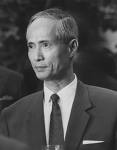

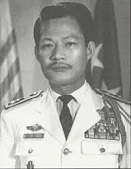
On Jan. 25 serious disturbances in Hue, South Vietnam cause martial law to be imposed. The original Wrath of Khanh without Captain Kirk? On Jan. 27 a bloodless military coup led by Lt. Gen. Nguyen Khanh ousts the civilian govt. of Tran Van Huong in Saigon; on Feb. 9 Khan names Harvard-educated economist Nguyen Xuan Oanh (1921-2003) as acting PM of South Vietnam; on Feb. 19 a coup in Saigon against Khanh by several gens. causes him to flee to Da Lat, where he obtains the support of air marshal Nguyen Cao Ky (1930-2011) and threatens to bomb Saigon incl. Tan Son Nhut Airport if rebels troops aren't withdrawn, after which U.S. gen. William Westmoreland talks him out of it, and on Feb. 15 Ky appoints Buddhist physician Phan Huy Quat (1908-79) as PM, who lasts 111 days; on June 14 Ky and Gen. Nguyen Van Thieu (1923-2001) stage a coup against Khanh (9th since Diem's assassination), and on June 19 Ky becomes PM (youngest ever), and Thieu becomes pres. of South Vietnam (until 1967), ecoming the 10th govt. in 20 mo.; meanwhile on Feb. 22 Khanh is replaced as army CIC by Maj. Gen. Sylvain Tran Van Minh (1923-2009) (called Little Minh to distinguish him from physically large Duong Van Minh, who is called Big Minh), and on Feb. 25 Khanh becomes an ambassador to France as a coverstory to being exiled, uttering the soundbytes: "I left my country in honor that day, not like Thieu, who fled later. My cabinet, my troops, the whole diplomatic corps were there at the airport to bid me farewell", "I am bringing a handful of dirt from the homeland, and will definitely return someday" (copying U.S. gen. Douglas MacArthur), "China believes it is the center of the Universe, just look at its flag, one big star surrounded by satellite stars - arrogance!", and "Vietnam is the next dragon in Asia"; in 1977 Khanh and his family emigrate to the U.S., and on Jan. 2, 2005 he is elected chief of state of the anti-Communist Govt. of Free Vietnam, headquartered in Little Saigon, Westminster, Calif. On Jan. 27 White House nat. security advisor McGeorge Bundy asks to visit Vietnam as JFK's eyes and ears, and arrives in the first week of Feb., where he soon discovers he can't stand the sight of blood - you're now free to move about the country?
Warriors, come out to pleiku? On Feb. 5, 1965 after the USAF sets up Pleiku Air Base in the mountains of the central highlands of Vietnam in Jan., the Battle of Pleiku begins, lasting 15 min., during which eight U.S. soldiers die and 126 are wounded in a sneak attack by the Viet Cong, who destroy or damage 16 U.S. helis and six aircraft in an attempt to provoke the U.S.; Pres. Johnson responds with a "strike for strike" policy, ordering Navy jets to attack the Viet Cong staging area at Dong Hoi Barracks (40 mi. N of the 17th parallel) on Feb. 7 in Operation Flaming Dart (ends Feb. 24), declaring the Pleiku attack "a test of will", and on Feb. 8 orders the installation of Hawk air defense missiles along with the evacuation of 1.8K U.S. govt.-sponsored dependents from South Vietnam (completed on Feb. 19), who along with the wounded soldiers from Pleiku begin returning to the U.S. with mucho publicity, with the news soundbyte "It seems no longer a war of local skirmishes"; McGeorge Bundy later visits Pleiku and makes up his mind to become a hawk - he should have made up his mind to become a pluck-pluck chicken and got the U.S. out while the gettin's good?
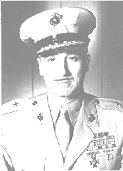
On Feb. 6, 1965 the U.S. and South Vietnamese begin bombing the rural North Vietnamese comm center in Vinh Linh District in Quang Tri Province in the NC coastal region of Vietnam, causing them to begin digging the Vinh Moc Tunnels in Quang Tri on the North-South Vietnamese border, an underground village which becomes a favorite tourist trap after the war. No regrets on your decision to fly business class? On Feb. 10 the Viet Cuong Hotel (not Viet Cong Hotel?) in the Annamese (C Vietnamese) port of Qui Nhon (used as a U.S. soldier barracks) is blown up by the Viet Cong, killing 23 and injuring 21, causing Pres. Johnson ("we're in the 4th quarter and it's 78 to nothing") to order a 3-hour bombing of Chanh Hoa and other depots in North Vietnam; on Feb. 11 the Viet Cong hit Qui Nhon again, and after a 48-hour hesitation Johnson scraps the strike-for-strike B.S. and orders Operation Rolling Thunder, the systematic bombing of North Vietnam, launched from Da Nang Air Base (on the South China Sea coast 50 Mi. SE of Hue), which begins on Mar. 2 with 150 U.S. South Vietnamese planes bombing two North Vietnamese bases, and over the next 3.5 years (until Nov. 2, 1968) drops 2x-3x as many bombs on North Vietnam as were dropped in all of WWII; on Mar. 6 LBJ commits 3.5K U.S. Marines to defend the base, becoming the first U.S. ground troops committed to the Vietnam War, landing on Mar. 8 at Nam O Beach in Danang Bay (10 mi. NW of Danang), led by USMC Brig. Gen. Frederick Joseph Karch (1917-2009), where they are greeted by 10 smiling local girls with flowers, then join 23K U.S. so-called military advisers; when asked why he never smiles, Karch utters the soundbyte: "If I had to do it over, that picture would have been the same. When you have a son in Vietnam and he gets killed, you don't want a smiling general with flowers around his neck as leader at that point"; the troop introduction causes demonstrations in Moscow and the U.S.; Robert S. McNamara later says that all the U.S. errors in Vietnam were committed in the late spring of this year (75K troops committed) in the hope that the South Vietnamese can stand by themselves by the end of the year, after which there was no way out.
On Feb. 16, 1965 the Vung Ro Bay Incident sees the largest Viet Cong weapons cache so far seized from a 100-ton North Vietnamese naval trawler at Vung Ro Bay in Dong Hoa District at the end of the Ca Pass Mts., leading to more U.S. Navy involvement in the Vietnamese War. On Feb. 19 USAF B-57s attack the Viet Cong in Binh Dinh Province in the SC coastal region, becoming the first use of U.S. jets in South Vietnam. On Feb. 19 14 Vietnam protesters are arrested in New York City for blocking doors to the U.N. On Feb. 25 South Korea sends 600 ROK troops to aid South Vietnam, causing North Korea on Mar. 26 to announce its readiness to aid the Communists in Vietnam; South Korea sends 143K troops by next year and 300K by the end of the war; in 1998 it expresses regret to Hanoi for participating in the war.
On Feb. 27, 1965 the U.S. State Dept. white paper Aggression from the North accuses the North Vietnamese of a deliberate campaign of aggression against the south, justifying U.S. intervention, with the soundbyte: "The war in Vietnam is a new kind of war, a fact as yet poorly understood in most parts of the world. Much of the confusion that prevails in the thinking of many people, and even governments, stems from this basic misunderstanding. For in Vietnam a totally new brand of aggression has been loosed against an independent people who want to make their way in peace and freedom. Vietnam is not another Greece, where indigenous guerrilla forces used friendly neighboring territory as a sanctuary. Vietnam is not another Malaya, where Communist guerrillas were, for the most part, physically distinguishable from the peaceful majority they sought to control. Vietnam is not another Philippines, where Communist guerrillas were physically separated from the source of their moral and physical support. Above all, the war in Vietnam is not a spontaneous and local rebellion against the established government. There are elements in the Communist program of conquest directed against South Vietnam common to each of the previous areas of aggression and subversion. But there is one fundamental difference. In Vietnam a Communist government has set out deliberately to conquer a sovereign people in a neighboring state. And to achieve its end, it has used every resource of its own government to carry out its carefully planned program of concealed aggression. North Vietnam's commitment to seize control of the South is no less total than was the commitment of the regime in North Korea in 1950. But knowing the consequences of the latter's undisguised attack, the planners in Hanoi have tried desperately to conceal their hand. They have failed and their aggression is as real as that of an invading army" - duh, Vietnam is one country, and they're just ousting you foreign invaders from halfway around the world?
On Mar. 1-9, 1965 the Indochinese People's Conference in Phnom Penh discusses Norodom Sihanouk's plan for neutralization of the whole Indochinese region, but makes no progress. On Mar. 6 LBJ orders U.S. Marines to invade Vietnam, with the soundbyte "My answer is yes, but my judgment is no" - a new twist on see no evil speak no evil? On Mar. 8 (during the Selma fuss) the first 3.5K U.S. Marines (9th Marines, 3rd Battalion) (first of 25K in five battalions) land in Da Nang, South Vietnam, later causing Pres. Johnson and MLK to split ranks on the war; on Mar 15 Highway 19 from Qui Nhon to Pleiku is reopened after almost 2 mo.; on Mar. 19 the 716th MP Battalion arrives to provide security for U.S. installations. On Mar. 11 Operation Market Time to indict the flow of North Vietnamese troops and war material into South Vietnam along its 1K-mi. coast begins; in Oct. the first of 193 Swift Boats (Patrol Crafts Fast) arrive in Vietnam for use as coastal patrol craft; the U.S. Navy begins boarding Vietnamese junks looking for smuggled arms; later the Swift Boats are deployed in the Mekong Delta and Ca Mau Peninsula in the S tip of Vietnam.
On Mar. 16, 1965 82-y.-o. pacifist Alice Herz (b. 1882) immolates herself Buddhist monk-style on a street corner in Detroit, Mich. to protest the Vietnam War, becoming the first U.S. activist to do it; after passersby rescue her, she dies 10 days later after saying that she had tried all the other protest methods in vain.
On Mar. 21, 1965 the U.S. govt. confirms that riot control agents have been used in South Vietnam. On Mar. 21 U.S. aircraft attack their first North Vietnamese radar site. On Mar. 22 the U.S. govt. admits that chemical warfare agents are being used against the Viet Cong in South Vietnam - kill them in the tunnels like rats? On Mar. 30 (10:55 a.m.) a car bomb goes off in front of the U.S. Embassy in Saigon, killing 17 employees; on Mar. 31 U.S. planes retaliate with their 15th raid across the North Vietnamese border since Pleiku, bombing six radar installations, incl. Dong Hoi Airfield, becoming the first North Vietnamese airfield hit; the Viet Cong counter by exploding a bicycle bomb in front of the My Canh Floating Restaurant on the Saigon River, killing 44 incl. 12 Americans.
On Apr. 2, 1965 Canadian PM Lester B. Pearson accepts the Temple U. World Peace Prize at Temple U. in Philly, giving a speech criticizing U.S. bombing of Vietnam, with the soundbyte: "There are many factors which I am not in a position to weigh, but there does appear to be at least a possibility that a suspension of such air strikes against North Vietnam, at the right time, might provide the Hanoi authorities with an opportunity, if they wish to take it, to inject some flexibility into their policy without appearing to do so as the direct result of military pressure", pissing-off LBJ, who takes him to task on Apr. 3 at Camp David, causing Pearson to apologize for the speech. On Apr. 4 the first U.S. planes are shot down by MiGs over North Vietnam.
On Apr. 5, 1965 the new Central Rural Reconstruction Council is created to run the South Vietnamese pacification program, which is renamed the rural reconstruction program. On Apr. 7 Pres. Johnson gives his Peace Without Conquest Speech at John Hopkins U., declaring that the U.S. is ready for "unconditional discussions" with the North Vietnamese, and proposing a multi-billion dollar Marshall Plan with a TVA Project for the Mekong Delta to modernize Southeast Asia incl. North Vietnam, saying "We cannot and must not wait for peace to begin this job", and privately telling his aides "Old Ho can't turn that down"; too bad, he spoils the plan by ruling out participation in negotiations by the Bicycle Bombing Viet Cong, causing them to summarily reject it?
On Apr. 14, 1965 the USAF flies its first night attack mission over North Vietnam; on Apr. 16 the first North Vietnamese SAM (surface-to-air-missile) site is begun near Hanoi. On Apr. 15 U.S. and South Vietnamese bombers drop 1K tons of bombs on Viet Cong positions. On Apr. 17 the Students for a Dem. Society (SDS) hold their first Vietnam War protest in Washington, D.C., the March Against the Vietnam War, drawing 25K. On Apr. 20 LBJ's top aides Robert S. McNamara, Gen. William Westmoreland, William Bundy et al. meet in Honolulu, Hawaii, and agree to recommend to LBJ that he send another 40K combat soldiers to Vietnam, after which in late Apr. LBJ meets with South Vietnamese gens. Nguyen Cao Ky and Nguyen Van Thieu in Honolulu for two days, and decides to raise U.S. aid to Saigon from 207M to 330M clamboombas and send 40K more U.S. soldiers to the Asian paradise; Pres. Johnson claims that the war will be won in 6 mo., while Ky claims it will take "four or five Hitlers"; meanwhile his admin. "inched their way across the Rubicon without even admitting it" (David Halberstam), going from protecting airfields to 'getting' the guerrillas? On Apr. 24 LBJ announces that Americans fighting in Vietnam are eligible for combat pay. On Apr. 29 Charles de Gaulle condemns foreign involvement in Vietnam, while Australia announces that it's sending troops there.
On May 3, 1965 Cambodia severs relations with the U.S. (until 1969); meanwhile the first 3.5K U.S. Army combat troops, all from the 173rd Airborne Brigade arrive in Vietnam - where's the 2-buck chuck? On May 4-5 Operation Rolling Thunder is halted in order to conduct aerial photo recon missions over North Vietnam. On May 6 the South Vietnam Armed Forces Council dissolves itself and votes confidence in PM Phan Huy Quat. On May 7 U.S. Marines and Seabees begin construction of Chu Lai (Vietnamese "harbor of big ships") Airfield 56 mi. SE of Da Nang in Dung Quat Bay on the South China Sea, becoming the first USMC airfield of the Vietnam War; it becomes operational on June 1, and grows to a major U.S. base. On May 11 the 10th U.S. F-105D is shot down over Xien Khouong, Laos. On May 11-12 2.5K Viet Cong troops attack the provincial capital of Song Be, along with other sites in Phuoc Long Province (N of Saigon) and C South Vietnam, finally withdrawing after fierce battles. On May 13 the U.S. announces its first bombing pause in Operating Rolling Thunder (until May 19) in hopes of getting the North Vietnamese to negotiate, but they use the time to repair air defenses and send more troops S on the Ho Chi Minh Trail; ditto for six more pauses. On May 13 the Viet Cong attack a U.S. Special Forces camp in Phuoc Luong; 2nd Lt. Charles Q. Williams (1933-82) is wounded 4x knocking out a Viet Cong machine gun and guiding rescue helis, receiving a Medal of Honor.

On May 21-23, 1965 the first Teach-In on Vietnam is held at the U. of Calif. campus in Berkeley, featuring Polish-born Jewish atheist Trotskyist historian Isaac Deutscher (1907-67) (who was against Zionism until the Holocaust, then admits the "historic necessity" of establishing Israel, but insists on calling himself a "non-Jewish Jew"); later he comments on the 1967 Six-Day War: "This latest, all-too-easy triumph of Israeli arms will be seen one day... to have been a disaster... for Israel itself." On May 23 the New York Herald Tribune first uses the phrase "credibility gap" to describe Pres. Johnson's growing deviousness over his Vietnam buildup in the face of his peace promises in the 1964 campaign.
On June 9-13, 1965 the Battle of Dong Xoai (Xai), sees a full Viet Cong regiment overrun a South Vietnamese Army district HQ and U.S. Special Forces camp 60 mi. N of Saigon, after which 1.2K U.S. paratroopers of the 173rd Airborne and 1.6K South Vietnamese and Australians pursue Viet Cong guerrillas in their first "search and destroy" mission, which emphasizes enemy dead over territory gained; 19 U.S. paratroopers are KIA; Gen. William Westmoreland later calls this the point that the enemy won the war, as their spring offensive causes him to ask for and not receive 44 new battalions; in 1991 Westy says "Because President Johnson was afraid of bringing in China and starting a world war, we weren't allowed to enlarge the battlefield", leaving the North Vietnamese with sanctuaries in N Vietnam, Cambodia, and Laos. On June 17 27 U.S. B-52s bomb Viet Cong outposts in South Vietnam, losing two planes. On June 27 Gen. William C. Westmoreland launches the first full-scale combat offensive by U.S. ground troops in Vietnam, sweeping into enemy territory NW of Saigon. On June 28 CBS demigod Walter Cronkite departs for a 3-week tour of South Vietnam, becoming the first network news anchor to visit the war front.
During summer 1965 several hundred protesters try to stop Vietnam troop trains on the Santa Fe tracks in West Berkeley, Calif.; in Oct. after a silent vigil on Mar. 19-23, 10K+ stage a march from the Berkeley campus to the Oakland Army Terminal.
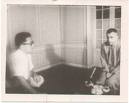
On July 1, 1965 the Viet Cong stage a mortar attack on Da Nang Air Base, destroying three aircraft, after which seven U.S. Marines are killed while searching for them. On July 8 Henry Cabot Lodge Jr. is reappointed as U.S. ambassador to South Vietnam, taking office on July 31 (until Apr. 28, 1967). On July 17 Pres. LBJ meets with his military advisors in Camp David for the weekend and decides to raise the number of U.S. troops in Vietnam to 50K, despite objections by Clark Clifford and Mike Mansfield - Super Nanny will teach those gooks a lesson? On July 18 U.S. Cmdr. (later rear Adm. and U.S. Repub. Ala. Sen. in 1981-7) Jeremiah Andrew Denton (1924-2014) is shot down over Thanh Hoa, Vietnam, and becomes a POW for eight years; in 1966 he is interviewed on North Vietnamese TV and blinks the word "torture" in Morse Code with his eyes, disobeying his captors' orders to knock the U.S. in order to utter the Stephen Decatur-like soundbyte "I don't know what is happening now in Vietnam, because the only news sources I have are Vietnamese, but whatever the position of my government is, I believe in it, I support it, and I will support it as long as I live", making him a big hero in the U.S.; he is released on Feb. 12, 1973.
On July 21-28, 1965 Pres. Johnson meets with top aides to decide what in the, er, the future course of action in Vietnam, and on July 28 he gives a noon press conference announcing that he will send yet another 44 combat divs., increasing the troop level from 75K to 125K, while doubling monthly draft calls to 35K, with the soundbytes "We did not choose to be the guardians at the gate, but there is no one else", "I have asked the commanding general, General Westmoreland, what more he needs to meet this mounting aggression. He has told me. And we will meet his needs. We cannot be defeated by force of arms. We will stand in Vietnam", and "I do not find it easy to send the flower of our youth, our finest young men, into battle. I have spoken to you today of the divisions and the forces and the battalions and the units, but I know them all, every one. I have seen them in a thousand streets, of a hundred towns, in every state in this union, working and laughing and building, and filled with hope and life. I think I know, too, how their mothers weep and how their families sorrow"; meanwhile U.S. defense secy. Robert Strange McNamara decides that the war will be over by June 30, 1967 (the end of the fiscal year) so that his budget will come out even?

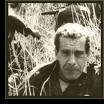
In July 1965 former Peace Corps assoc. dir. of public affairs and LBJ special asst. (since 1963) Billy Don "Bill" Moyers (1934-) becomes LBJ's new White House press secy. (until Feb. 1967) - get on the honker and tell your friends in the networks to fill the fall prime time schedule with wacky comedies? On Aug. 2 Canadian-born CBS-TV newsman Morley Safer (1931-2016) films the burning of the Vietnamese village of Cam Ne by U.S. Marines, sending the first journalistic report from Vietnam saying that the U.S. is losing, which is aired on Aug. 5, pissing-off LBJ and causing him to call CBS and demand that they fire Safer for someone more safer; CBS pres. Frank Stanton decides he can frankly stand, er, stay on. On Aug. 4 Pres. Johnson asks Congress for an additional $1.7B for the war on poverty, er, Vietnam War; knowing they can afford it now, on Aug. 5 the Viet Cong destroy 2M gal. of fuel in storage tanks near dagnabbit Da Nang.
On Aug. 17-24, 1965 Operation Starlite sees U.S. Marines stage a preemptive strike on 1.5K Viet Cong gathering to attack Chu Lai Air Base based on intel from a Viet Cong deserter, becoming the first all-U.S. offensive ground military action of the Vietnam War, killing 614 Viet Cong and taking 9 POWs vs. 45 U.S. forces killed and 120 wounded; on Aug. 19 the Viet Cong stronghold of Van Tuong is destroyed; the whole operation is the first decisive U.S. V, boosting troop morale. On Aug. 28 the U.S. military routs the Viet Cong in the Mekong Delta, killing 50+. On Aug. 31 Pres. Johnson signs the U.S. Draft Card Burning Law making it crime punishable by five years in jail and a $1K fine to burn or mutilate a draft card, which only makes it more popular since it gets the attention of the media at anti-Vietnam War rallies? - burning your own ghetto is okeedokee if you're black, though, cause we got HUD? In Aug. the U.S. Marines form the first Combined Action Platoons, using South Vietnamese militia units to root out Viet Cong guerrillas and protect villages.
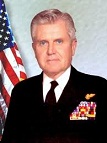
On Sept. 9, 1965 U.S. Navy pilot James Bond Stockdale (1923-2005) is shot down over North Vietnam, and spends 7.5 years as a POW, incl. four in solitary confinement; as the highest-ranking naval officer in captivity, he works with fellow Hanoi Hilton POW John McCain to organize a culture of defiance, and in the fall of 1969 slits his wrist to psych out his captors? Here come the guys from Apocalypse Now? On Sept. 15 the 16K-man 400-helicopter U.S. 1st Cavalry Div. (Airmobile) (1st Air Cav) (AKA Sky Soldiers and First Team) arrives in South Vietnam, and is stationed at An Khe, becoming the first full-strength army div. to be ordered to Vietnam, turning the Vietnam War into a heli war; it sees its first combat on Oct. 23 on the North Vietnamese 33rd Regiment near Plei Mei, freaking and routing them; by the end of the war it loses 926 heli pilots and 2,005 crewmen. On Sept. 18-19 the Battle of An Ninh sees the 1st Cavalry Div. of the U.S. 101st Airborne Brigade mauled by the Viet Cong at their new Camp Radcliffe (AKA the Golfcourse) in An Khe, Vietnam, losing 226 KIA vs. 13 Ams. On Sept. 20 seven U.S. planes are downed in one day over wacky Vietnam.

On Sept. 28, 1965 U.S. Marine PFC Robert Russell Garwood (1946-) is captured near China Beach, and stays in Vietnam until 1979 after being released in 1973, ending up being convicted of collaborating with the enemy on Feb. 5, 1981, while claiming innocence and that other POWs have been left behind.
On Oct. 10 up-and-coming Repub. leader Ronald Wilson Reagan (1911-2004) gives a speech at Coalinga Junior College in Calif., calling for an official declaration of war in Vietnam - in Vietnam his job was to kill, period?
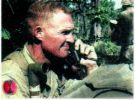



The U.S. finds that the Play Misty for Me Stone Age Vietnamese Commies can actually cause heavy GI casualties despite all their vaunted hi tech? On Oct. 19-25, 1965 a U.S. Special Forces (Green Beret) camp at Plei Me in Misty Vietnam 40 mi. S of Pleiku is sieged by the Viet Cong for several days, and after they withdraw they are pursued to the Ia Drang Valley, beginning the 35-day Oct.-Nov. Battle of Ia Drang Valley (pr. ee-YAH DRAHNG) near Chupong Mt. 7 mi. from the Cambodian border (200 mi. N of Saigon's central highlands), becoming the first time U.S. troops meet North Vietnamese regulars; the battle culminates on Nov. 14-16 as the 1st Air Cav unknowingly lands 450 troops of the 1st Battalion, 7th Cavalry (of George Armstrong Custer fame) on LZ X-Ray near the elite 4K-man North Vietnamese 66th Regiment, getting ambushed and mauled by alien slant-eyed troops yelling "Kill GI!", causing B-52s to be called in to assist losing, er, needy U.S. combat troops for the first time, eventually making the NVA retreat into the jungle; Lt. Col. (later Lt. Gen.) Harold Gregory "Hal" Moore Jr. (1922-2017), cmdr. of the 1st Battalion troops becomes a hero after 1K-2K North Vietnamese are killed vs. 155 U.S. soldiers KIA and 124 wounded; on Nov. 17 the NVA does it again, ambushing 500 more troops of the 7th Cavalry at LZ Albany in the Ia Drang Valley, causing 60% casualties and killing 30% of them; Jack P. Smith (1945-2004), son of ABC-TV journalist Howard K. Smith is wounded, going on to follow in daddy's footsteps; British-born 2nd Lt. Cyril Richard "Rick" Rescorla (1939-2001) survives the assault into LZ Albany, and later dies in the WTC on 9/11; total U.S. war casualties now stand at 1,335 dead and 6,131 wounded; on Nov. 14 U.S. Army heli pilot Maj. Bruce Perry Crandall (1933-) flies repeatedly in and out of the thick of the action to support the troops, and wins a Medal of Honor in 2007; Am. journalist Joseph Lee "Joe" Galloway (1941-) wins a Bronze Star and becomes known as a fair pro-GI journalist; filmed in 2002 as We Were There, starring Mel Gibson as Hal Moore.
On Oct. 30, 1965 25K march in Washington, D.C. in support of the Vietnam War effort, incl. five Medal of Honor recipients - flags waving high on their wheelchairs? In Oct. the 57-mo. Izangi Boom (named for the god who created Japan) begins in Japan (ends July 1970) as U.S. orders for the Vietnam War fuel a buildup of industry.

On Nov. 2, 1965 after handing his 1-y.-o. daughter Emily to passersby, Baltimore Quaker Norman Morrison (b. 1933) immolates himself with kerosene outside the Pentagon office of U.S. defense secy. Robert Strange McNamara to protest the Vietnam War, leaving a note to his wife Anne Welsh saying "Know that I love thee, but I must go to help the children of the priest's village", causing him to become a hero in North Vietnam under the name Mo Ri Xon, with a street and a postage stamp issued in his honor, which U.S. citizens are prohibited from owning because of the U.S. embargo; on May 9, 1967 demonstrators hold a vigil for him before their 4-day occupation of the Pentagon; in 1999 Morrison's widow and two daughers visit Vietnam; in 2007 Vietnamese pres. Nguyen Minh Triet visits the site and reads the poem Emily, My Child by Vietnamese Communist poet To Huu (Nguyen Kim Thanh) (1920-2002). On Nov. 5 U.S. Marine Corps Capt. Harland P. Chapman (1934-) of the USS Oriskany is shot down over North Vietnam in his Vought F-8E Crusader, and becomes a POW; meanwhile after taking off from the USS Oriskany, Duke Mitchell is shot down and killed in his F-4 Phantom II in North Vietnam, and framed for misconduct, causing his son Lt. Pete "Maverick" Mitchell to be denied entrance to the academy and end up as a naval pilot with a chip on his shoulder; both of Maverick's parents loved Otis Redding's "(Sittin' On) The Dock of the Bay", even though it's not written until Nov. 1967 - 1986 film "Top Gun" :) Speaking of black out? On Nov. 9 22-y.-o. former Catholic seminarian Roger Allen LaPorte (b. 1943) (member of the Catholic Worker Movement) immolates himself Buddhist monk-style in front of the U.N. to protest the Vietnam War.
On Nov. 11, 1965 (night) the First Battle of Ap Bau Bang in Vietnam along Thunder Road (Nat. Route 13) involving the U.S. 1st Infantry Div. becomes the first major U.S. battle of the Vietnam War using armored vehicles. On Nov. 14 90K more soldiers are sent by the U.S. to Vietnam. On Nov. 17 the 66th North Vietnamese Regiment ambushes a U.S. battalion while moving E toward Plei Mei, killing 30% of the force, with 60% casualties.
On Nov. 27, 1965 (Sat. after Thanksgiving) 20K-35K anti-Vietnam War protesters march in Washington, D.C., circling the White House then marching to the Washington Monument for a rally, becoming the first use of the chant, "Hey! Hey! LBJ! How many kids did you kill today?"; marchers incl. Dr. Benjamin Spock, novelist Saul Bellow, sculptor Alexander Calder et al. - everything's here down to the last hitchin' post? On Nov. 30 U.S. defense secy. Robert S-for-Strange McNamara privately warns LBJ that U.S. casualty rates of up to 1K KIA per mo. can be expected. On Dec. 3 the Nat. Council of Churches (NCC) calls on the U.S. govt. to halt the bombing of North Vietnam.

On Dec. 7, 1965 U.S. defense secy. Robert S. McNamara tells JFK that the North Vietnamese "believe that the war will be a long one, that time is their ally, and their staying power is superior to ours" - they fought the Chinese for a thousand years, so the U.S. ain't nothing? On Dec. 8 the U.S. 11th Ranger Battalion is ambushed in the Que Son Valley in South Vietnam by the 70th Viet Cong Battalion, causing Operation Harvest Moon to be launched (ends Dec. 20), killing 407 and capturing 33 while suffering 45 U.S. killed and 218 wounded; the ARVN suffers 90 killed, 91 missing, and 141 wounded. On Dec. 9 the New York Times pub. an article claiming that the U.S. is unable to stop the flow of North Vietnamese soldiers and supplies into the south despite massive bombing. On Dec. 15 the U.S. drops 12 tons of bombs on industrial bldgs. near Haiphong. On Dec. 18-20 Pres. Johnson holds another meeting with top aides to decide the future course of action in Vietnam. On Dec. 21 four pacifists are indicted in New York City for burning their draft cards. On Dec. 22 the U.S. EF-105F Wild Weasel, which baits enemy radars to illuminate it then tracks them back to their source makes its first kill over Vietnam. On Dec. 24 U.S. troops levels in Vietnam reach 184,300. On Dec. 25 Pres. Johnson orders the 2nd bombing halt, and sends out feelers for peace negotiations, causing Hanoi to denounce peace talks as a "trick" and "sheer, groundless fabrication"; the pause lasts for 37 days, giving the Commies a nice chance to get well? On Dec. 25 blonde actress and pin-up Chris Noel (1941-) gives her first USO perf. at two Calif. VA hospitals, going on to host her own Armed Forces Network radio show for the GIs in Vietnam while visiting dangerous areas, marrying a Green Beret capt. and becoming the GIs' favorite entertainer; too bad, after the war she and her hubby suffer from postwar trauma.

In 1965 Dow Chemical Co. begins making horrible Napalm, which burns at 2K F, and later becomes the symbol of the Vietnam War to the anti-war movement. In 1965 anti-war protest singer Phil Ochs (1940-76) releases his album #2 I Ain't Marching Anymore, which incl. I Ain't Marching Anymore ("It's always the old who lead us to the war/ It's always the young who fall/ But look at all we've won with a saber and a gun/ Tell me is it worth it all?/ I ain't marching any more, no I ain't marching anymore"), Draft Dodger Rag ("Oh I'm just a typical American boy from a typical American town/ I believe in God and Senator Dodd and akeepin' old Castro down,/ And when it came my time to serve I knew, better red than dead,/ But when I got to my old draft board, buddy, this is what I said,/ Sarge, I'm only eighteen, I got a ruptured spleen,/ And I always carry a purse/ I got eyes like a bat, and my feet are flat, and my asthma's getting worse"), That Was the President (tribute to JFK) ("The bullets of the false revenge have struck us once again/ As the angry seas have struck upon the sand,/ And it seemed as though a friendless world had lost itself a friend/ That was the president and that was the man"), Talking Birmingham Jam ("You see, Alabama is a sovereign state/ With sovereign dogs and sovereign hate/ They stand for the Bible, for the Constitution/ They stand against the Communist revolution/ They say, It's pinkos like you that freed the slaves"), Links on the Chain ("Come you ranks of labor, come you union core/ And see if you remember the struggles of before,/ When you were standing helpless on the outside of the door/ And you started building links on the chain/ On the chain, you started building links on the chain").
In 1965 Lionel Rogosin's film Good Times, Wonderful Times debuts, inspired by "Hiroshima Mon Amour" about the horrors of war intercut with a posh London party becomes a hit with college students just as the Vietnam War goes into full swing.
At the beginning of 1966 U.S. troop levels in Vietnam are 184,300; 90K South Vietnamese soldiers deserted last year, while 35K North Vietnamese soldiers infiltrated to the S along the Ho Ho Ho Chi Minh Trail; up to 50% of the South Vietnamese countryside is under some degree of Viet Cong control. Early in 1966 Pres. Johnson decides not to raise taxes even though the Vietnam War will cost $27B this year, causing a $23B deficit; New York Times correspondent Edwin Dale Jr. (1924-99) calls this the single most irresponsible pres. act in his 15 years of covering Washington, D.C.


On Jan. 1, 1966 during the 37-day truce, Pope Paul VI issues an encyclical asking for an end to hostilities in Southeast Asia. On Jan. 2 U.S. soldiers move into the Mekong Delta of Vietnam for the first time. On Jan. 3 Cambodia warns the U.N. of retaliation unless the U.S. and South Vietnam end their intrusions. On Jan. 7 a delegation from the Soviet Union in Hanoi expresses solidarity and wishes their Commie bro's an early V over the pesky Yankee imperialists in South Vietnam. On Jan. 7-13 the U.S. launches Operation Crimp (Buckskin) with 8K troops (largest operation so far), targeting the Viet Cong HQ for the Saigon sector in the district of Chu Chi, which is laced with tunnels, starting with a B-52 bombing raid that turns the landscape into a lunar wasteland; too bad, they don't make a dent on the tunnels, which continue to be used throughout the war, ensuring a U.S. defeat, despite the enlistment of "tunnel rats" to go after the "gooks" mano a mano.

On Jan. 10, 1966 black activist Julian Bond (1940-) is denied his seat in the Ga. legislature for opposing the Vietnam War; in 1968 he becomes the first black Dem. candidate for U.S. vice pres.
On Jan. 12, 1966 LBJ's Third State of the Union Address claims that the U.S. should stay in Vietnam until Communist aggression there is ended, and that the U.S. could have both "guns and butter", admitting that this war is unlike anything the U.S. has faced before, but adding the soundbyte "Yet, finally, war is always the same. It is young men dying in the fullness of their promise. It is trying to kill a man that you do not even know well enough to hate... Therefore, to know war is to know that there is still madness in this world"; draft quotas are raised 10x (from 5K in 1965), causing the anti-Vietnam War protest to escalate 100x? - God you remind me of myself when I was your age? On Jan. 18 8K more U.S. soldiers arrive in Vietnam, bringing the total to 190K. On Jan. 24-Mar. 6 Operation Masher (later changed to Operation White Wing by LBJ for PR purposes), starting on Jan. 28 with the Battle of Bong Son (ends Feb. 12) in the Bon Son Plain in coastal South Vietnam becomes the first large-scale U.S. search-and-destroy operation against the pesky Viet Cong and NVA, featuring the Apocalypse Now 1st Air Cav whooping it up, killing 1,342 Commies vs. 228 Yanks killed and 788 wounded; vs. 228 Yanks killed and 788 wounded; too bad, the main goal ends up as often-inflated body counts of Commies, ensuring that the top brass never knows what's really going on; "Furthermore, as the only 'indicator of progress,' it suggested that death and destruction had some absolute value in terms of winning the war. That the enemy might continue to recruit, rearm, and rebuild (often with the help of people enraged by the American destruction) did not seem to enter into the calculations." (Frances FitzGerald). On Jan. 25 Japanese PM Eisaku announces an internat. peace mission to Vietnam.

On Jan. 26, 1966 Australian Liberal PM (since Dec. 19, 1949, also Apr. 26, 1939-Aug. 26, 1941) Sir Robert Gordon Menzies retires after a total of 18 years 5 mo. and 12 days in office (a record until ?), and Liberal Party treasurer Harold Edward Holt (1908-67) becomes PM #17 of Australia (until Dec. 17, 1967), becoming known for his soundbyte "All the way with LBJ" as he ramps up Australian involvement in the Vietnam War. Too bad, on Dec. 17, 1967 "All the way with LBJ" Australian PM (since 1966) Harold Edward Holt (b. 1908) goes swimming in heavy seas at Cheviot Beach, Victoria off Portsea and is never seen again; rumors persist that he was really a Chinese spy, and was picked up by a sub.

In Jan. 1966 the Johnson admin. abolishes automatic student deferment from the draft, inflaming college student anger against the war, causing 300 new SDS chapters to be formed on U.S. college campuses, and causing education-loving Senate Foreign Relations Committee chmn. James William Fulbright (1905-95) on Jan. 28 to challenge the legality of U.S. military intervention in Vietnam and hold televised hearings in Feb., during which U.S. defense secy. Robert S. McNamara states that the U.S. objectives are "not to destroy or overthrow the Communist government of North Vietnam. They are limited to the destruction of the insurrection and aggression directed by North Vietnamese against the political institutions of South Vietnam" - he's fully bright?
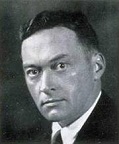
On Feb. 3, 1966 Am. newspaper columnist Walter Lippmann (1889-1974) criticizes LBJ's Vietnam strategy, saying "Gestures, propaganda, public relations and bombing and more bombing will not work", and predicting that the war will divide the U.S. as combat causalities mount. On Feb. 21, 1966 the U.S. resumes bombing raids on North Vietnam; B-52 bombers are used for the first time on Apr. 12.


On Mar. 1, 1966 a U.S. Senate attempt to repeal the 1964 Gulf of Tonkin Resolution led by Sen. Wayne Lyman Morse (1900-74) (D-Ore.) (one of the original two no votes) fails by 92-5; Morse later gives a great interview criticizing how the U.S. news media keeps uncritically backing the govt. in war after war, and claiming that foreign policy belongs to the Am. people not to the president alone. On Mar. 2 U.S. defense secy. Robert S. McNamara announces that there are 215K U.S. troops in Vietnam - 215K wasted lives? On Mar. 3 former Green Beret Donald W. Duncan (1930-), author of "I Quit! - The Whole Thing Was a Lie!" speaks at the city hall in Manhattan, N.Y., telling of atrocities and injustices he witnessed in Vietnam. On Mar. 5 the Battle of Lo Ke sees the Viet Cong 9th Div. 272nd Regiment attack the U.S. 3rd Brigade, and withdraw after a U.S. air strike; on Mar. 7 the Viet Cong try it again on the U.S. 1st Brigade, with the same results. On Mar. 9 the U.S. admits that it destroyed 20K acres of food crops in suspected Viet Cong villages, causing a firestorm of criticism from U.S. univs. On Mar. 10 (26?)-June 8 the Buddhist Uprising of 1966 is sparked by the dismissal of Buddhist South Vietnamese gen. Nguyen Chanh Thi (1923-2007), after which widespread demonstrations in the N take over radio stations in Da Nang and Hue on Apr. 1, causing PM Nguyen Cao Ky on Apr. 3 to claim that Da Nang is under Communist control and vow to liberate it, personally leading two marine battalions (3K men) on Apr. 5, find the roads blocked, and talk the U.S. military into ending its neutrality and join the conflict on Apr. 9, after which Ky leads his men into Da Nang on May 14 and clears it of renegade South Vietnamese Buddhist troops (causing a new wave of Buddhist monk self-immolations), then takes Hue back on June 8, ending the Buddhist "Struggle Movement" as a political force, while Buddhist complaints to LBJ result in the soundbyte that the immolations are "tragic and unnecessary".
On Mar. 26, 1966 Vietnam War protests are held in New York City, Washington, D.C., Chicago, Philly, Boston, and San Francisco, Calif. On Mar. 27 20K Buddhists march in South Vietnam to protest the Catholic-run govt. On Mar. 29 the 23rd Communist Party Conference convenes in the Soviet Union; Leonid Brezhnev demands that the U.S. pull out of Vietnam while admitting that Sino-Soviet relations suck. On Mar. 31 four clean-cut men in suits and ties burn their draft cards on the steps of the South Boston Courthouse in Mass., getting attacked by a mob, while the police make no arrests - don't burn your court documents or we'll refuse to make any new ones? In Mar. U.S. defense secy. Robert S. McNamara agrees to the bombing of North Vietnamese POL (petroleum, oil, and lubricant) supplies.

On Apr. 8, 1966 Buddhists protest over the failure of the South Vietnamese govt. to set a date for free elections, causing them to cave in on Apr. 14 and promise elections within 5 mo. On Apr. 11 USAF paratrooper William Hart "Bill" Pitsenbarger (b. 1944) is killed by a sniper after parachuting and heroically aiding pinned-down soldiers near Cam My (E of Saigon), becoming the first enlisted recipient of the Air Force Cross in 1966, after which he becomes the first AF enlisted man since WWI to be awarded a Medal of Honor, although it takes until 2008 for the men of his co. to convince them. On Apr. 12 the U.S. uses B-52 bombers for the first time against the North Vietnamese, targeting military and industrial installations - you mess with the bull, you get the horns? On Apr. 29 U.S. troops in Vietnam reach 250K.
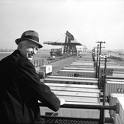
In Apr. 1966 transatlantic container ship service begins with the sailing of the SS Fairland from Port Elizabeth, N.J., reaching Rotterdam four weeks earlier than previous ships, causing a rev. in shipping with rectangular containers that can be hauled by trucks or trains, although it costs a lot of dockworkers their jobs; the containerization concept is from trucking co. magnate Malcom (Malcolm) Purcell McLean (1913-2001), who designed the first container in 1956 but took a decade to get ports built with enough cranes in N.J., Rotterdam, Bremen, and Grangemouth, Scotland; next year they begin service to South Vietnam, which produces 40% of their revenues until 1969, when they are acquired by R.J. Reynolds Co. and expand to Hong Kong and Taiwan, followed by Singapore, Thailand, and the Philippines in 1971, reaching 27K containers with 36 ships and 30 ports; on May 10, 1968 SS Fairland is hit by rockets in the Long Tau River shipping channel 31 mi. from Saigon, sustaining light damage, and again on May 15, but the supply line keeps on truckin'.
In Apr.-May, 1966 Operation Birmingham sees 5K U.S. troops plus large numbers of helis and armored vehicles sweep the area N of Saigon for three weeks, killing only 100 Viet Cong, and proving how lame the U.S. is if it won't try to go into them *!?*! tunnels and take them on. On May 2 U.S. defense secy. Robert S. McNamara privately reports that 4.5K North Vietnamese are infiltrating to the S each mo. On May 15 tens of thousands of anti-Vietnam War demonstrators picket the White House and rally at the Washington Monument. On May 16 Rev. Martin Luther King Jr. delivers his first public speech on the Vietnam War, coming out against admin. policy. On May 16 students at the U. of Wisc. stage a sit-in to protest draft deferment exams. On May 17 Pres. Johnson attends a Dem. fundraising dinner in Chicago, Ill., giving his Nervous Nellies Speech, railing against "Nervous Nellies" who "will turn on their leaders and on their country and on our fighting men". On May 18 U.S. defense secy. Robert S. McNamara delivers the speech Security in the Contemporary World in Montreal, advocating economic development rather than military assistance as the solution to Third World turmoil - do the math and save? In May-June the Battle of Dong Ha sees 10K North Vietnamese cross the DMZ and take on the U.S. Marine 3rd Div., who on July 7 launch Operation Hastings, driving them back with 8.5K Marines and 3K South Vietnamese ARVN troops by July 25, becoming the largest combined allied military operation so far.

In May 1966 Megan Terry (1932-) debuts her play Viet Rock at the Open Theater in New York, becoming the first rock musical, and the first anti-Vietnam War play.
On June 4, 1966 a 3-page anti-Vietnam War ad pub. in The New York Times is signed by 6.4K teachers and profs. On June 29 ending their self-imposed moratorium, the U.S. bombs fuel storage facilities in Hanoi and Haiphong from Tan Son Nhut Air Base outside Saigon, then attacks North Vietnamese forces inside the DMZ on July 22, but refrains from invading Hanoi for fear of retaliation from China and the Soviet Union. On June 30 the Battle of Route 13 sees U.S. forces brutally attacked by the Viet Cong on the road that links Vietnam to the Cambodian border until aircraft and artillery drive them back.
On July 4, 1966 the Beatles are attacked and get into deep doo-doo in the Philippines after mistakenly snubbing pres. Ferdinand Marcos' wife Imelda Marcos before a concert; meanwhile despite criticism Marcos sends troops to Vietnam. On July 4-6 a conference of Warsaw Pact countries sees Romanian dictator Nicolae Ceausescu propose dissolution of both NATO and the Warsaw Pact, and demand that all nations withdraw their troops from the soil of other nations; it ends with a promise to support their brothers in North Vietnam. On July 6 52 captured U.S. pilots are paraded through the streets of Hanoi amid loud jeers, becoming known as the Hanoi March; meanwhile their brother pilots intensify bombing raids on the Ho Chi Minh Trail in Laos, causing Ho Chi Minh on July 17 to order a partial mobilization to guard against air strikes. On July 12 new Indian PM (since Jan. 24) Indira Gandhi visits Moscow, followed on July 16 by British PM Harold Wilson, who wants the Soviets get them to begin Vietnamese war peace negotiations; too bad, they tell him to fuck off, and on July 24 U.N. secy.-gen. U Thant visits Moscow, announcing on Sept. 1 that his efforts to obtain a peace in Vietnam are kaput and he will not seek reelection, but changes his mind on Dec. 2. On July 30 having driven them out of Quang Tri Province, the U.S. bombs NVA troops in the DMZ for the first time.
On Aug. 9, 1966 U.S. jets attack two villages in South Vietnam by mistake, killing 63 and wounding 100 civilians. On Aug. 16 the House Un-Am. Activities Committee holds a meeting to investigate Americans who are aiding the Viet Cong, and are disrupted by anti-Vietnam War demonstrators; 50 are arrested. On Aug. 18 the Battle of Long Tan in Phuoc Tuy Province sees the 6th Battalion of the Royal Australian Regiment defeat a 4x larger Viet Cong force, who lose 245 out of 2.5K vs. 36 Australians killed and 24 wounded. On Aug. 30 Hanoi announces that Red China will provide it with economic and technical assistance.
On Sept. 1, 1966 French pres. Charles de Gaulle visits Phnom Penh, Cambodia and calls for U.S. withdrawal from Vietnam. On Sept. 12 500 U.S. planes attack NVA supply lines and coastal targets in the heaviest air raid of the Vietnam War so far. On Sept. 14-Nov. 24 Operation Attleboro sees 20K U.S. and South Vietnamese solders stage a search-and-destroy mission 50 mi. N of Saigon near the Cambodian border, uncovering a hidden base camp with a huge weapons cache in the jungle; North Vietnamese losses are 1,106 vs. 155 allied soldiers killed and 494 wounded. On Sept. 16 South Vietnamese Buddhist leader Thich Tri Quang ends a 100-day hunger strike. On Sept. 23 the U.S. admits that it defoliates jungles near the DMZ with sprayed chemicals.
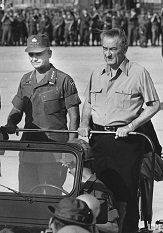
On Oct. 2-24, 1966 Operation Irving sees the U.S. 1st Air Cavalry clear NVA troops from mountainous areas near Qui Nhon. On Oct. 3 the Soviet Union announces that it will join Red China in providing economic and military assistance to North Vietnam. On Oct. 19-Nov. 2 Pres. Johnson visits Southeast Asia, incl. New Zealand, Australia, the Philippines, South Vietnam, Thailand, Malaysia and South Korea; on Oct. 24-25 the Manila Summit Conference in Philippines of seven nations headed by Johnson, incl. allies Australia, Philippines, Thailand, New Zealand, South Korea, and South Vietnam pledges to withdraw from Vietnam within 6 mo. if North Vietnam withdraws from the south, and to support Johnson's war otherwise. On Oct. 26 Pres. Johnson visits U.S. troops at the deepwater Cam Ranh Bay (finest deepwater shelter in SE Asia) in South Vietnam 180 mi. NE of Saigon, becoming his first of two pres. visits to the country; too bad, he gets his old buddies Brown and Root (founded 1910) of Houston, Tex. billions of dollars in contracts to dredge the bay as part of a 4-co. consortium that builds 85% of the infrastructure needed by the Navy for the Vietnam War, causing anti-Vietnam War protesters to call it "Burn and Loot". On Oct. 27 China test-fires its first guided missile capable of carrying a nuclear warhead - Vietnam is saved for Communism?

On Nov. 7, 1966 Jean-Claude van Itallie (1936-) debuts his play America Hurrah at the Pocket Theater in New York (640 perf.), which consists of the expressionistic mini-plays "Interview", "TV", and "Motel: Masque for Three Dolls", and shocks audiences with nudity and an anti-Vietnam War message, becoming the first major play of the Vietnam anti-Vietnam War movement; features a woman doll putting lipstick on her nipples; "What about us grills?"
On Nov. 7, 1966 U.S. defense secy. Robert S. McNamara visits Harvard U., and is confronted by 800 student protesters organized by the SDS; 25 lie down under his car to prevent him from leaving, calling him a fascist and a murderer. On Nov. 12 the New York Times reports that 40% of U.S. economic aid sent to Saigon ends up stolen or ends up on the black market. On Nov. 13 the ACLU appeals to U.S. college and univ. presidents to block efforts by the House Un-Am. Activities Committee to obtain membership lists of anti-Vietnam War campus orgs.
On Dec. 24, 1966 a military-chartered plane crashes into a village in Binh Thai, South Vietnam, killing 129. On Dec. 26 the U.S. Defense Dept. finally admits that some North Vietnamese civilians may have been bombed accidentally. On Dec. 27 the U.S. stages a large-scale air assault on Viet Cong positions in the Mekong Delta using bombs and napalm; meanwhile the CBS News Special Report: Westmoreland on Vietnam is aired on CBS-TV, with Charles Collingwood and Morley Safer interviewing Gen. William Westmoreland on the negative military situation in Vietnam - duck, you sucker? Vietnamese Buddhist monk Thich Nhat Hanh (1926-) is exiled, founding the Order of Interbeing, and embarking on a tour of the U.S., where he convinces Martin Luther King Jr. to oppose the war in Vietnam.

In 1966 conservative Hudson Inst. think-tank founder Herman Kahn (1922-83) becomes a consultant to the U.S. Dept. of Defense (until 1968), opposing direct negotiations with North Vietnam in favor of sharp escalation, arguing that if the latter is not done then the U.S. needs an exit strategy; he also argues against starting a counterinsurgency, but after it begins he gives advice on how to wage it after noting that historically all successful wars required an effective police force in place first, which South Vietnam doesn't have.
U.S. troops in Vietnam at the start of 1967: 389K, with 5,008 combat deaths and 30,093 wounded, with over 50% of casualties caused by Viet Cong snipers and ambushes, along with booby traps and mines; ARVN troops: 45K; Australian troops: 7K; 89K North Vietnamese troops infiltrated South Vietnam via the Ho Chi Minh trail last year; U.S. battle deaths in Vietnam avg. 1K per mo. this year, 33% higher than in 1966; there are more U.S. deaths this year than in all of the war's previous years; cumulative civilian deaths total 53K; in 1967-1969 31,508 (14%) of all wounded U.S. soldiers in Vietnam are mine victims; by the end of the year 8.8K men per mo. move down the Ho Chi Minh Trail.
On Jan. 2, 1967 Operation Bolo sees 28 USAF F-4 Phantom jets (each with 8 missiles) use an electronic Trojan Horse to lure 16 MiG-21s (each with 2 missiles) into a dogfight over Hanoi, shooting down seven, leaving only nine in their air force; too bad, U.S. pilots are prohibited from attacking North Vietnamese MiG bases. On Jan. 8 16K U.S. and 14K South Vietnamese ARVN troops launch Operation Cedar Falls (until Jan. 26), the biggest combined offensive so far against the tunnel-laced Iron Triangle_(Vietnam) between the Saigon River and Route 13 25 mi. NW of Saigon, which has been a Communist stronghold for 20 years, using tunnel rats for the first time; on Jan. 18 the Viet Cong district HQ of Chu Chi is captured, along with 500K documents, incl. plans for a failed assassination attempt on Robert S-for-Strange McNamara; too bad, the stupid Yankees arrive and leave by heli after cleaning out the area, allowing them to return and rebuild, and continue it throughout the war. On Jan. 10 U.N. secy.-gen. Thank U, er, U Thant expresses doubts that Vietnam is essential to Western security.
On Jan. 10, 1967 LBJ's 4th State of the Union Address starts out "I have come here tonight to report to you that this is a time of testing for our nation. At home, the question is whether we will continue working for better opportunities for all Americans, when most Americans are already living better than any people in history. Abroad, the question is whether we have the staying power to fight a very costly war, when the objective is limited and the danger to us is seemingly remote. So our test is not whether we shrink from our country's cause when the dangers to us are obvious and dose at hand, but, rather, whether we carry on when they seem obscure and distant - and some think that it is safe to lay down our burdens. I have come tonight to ask this Congress and this nation to resolve that issue, to meet our commitments at home and abroad, to continue to build a better America, and to reaffirm this nation's allegiance to freedom"; after lasting seemingly forever, it ends "Whether we can fight a war of limited objectives over a period of time, and keep alive the hope of independence and stability for people other than ourselves, whether we can continue to act with restraint when the temptation to get it over with is inviting but dangerous, whether we can accept the necessity of choosing a great evil in order to ward off a greater, whether we can do these without arousing the hatreds and the passions that are ordinarily loosed in time of war - on all these questions so much turns" - a president of state of the hot air?


On Feb. 2, 1967 Pres. Johnson says that there are "no serious indications that the other side is ready to stop the war". On Feb. 5 The Smothers Brothers Comedy Hour debuts on CBS-TV (until Sept. 15, 1969), combining great comedy and music with boundary-pushing political criticism of the LBJ regime and the Vietnam War, going on to beat "Bonanza" for the top audience ratings and host top rock groups incl. the Beatles until LBJ pulls strings with his personal friend and CBS head William S. Paley and gets the show summarily cancelled, using a comic sermon by Canadian Jewish comedian David Steinberg (1942-) as an excuse, when he said, "The Old Testament scholars say that Jonah was swallowed by a whale. The Gentiles, the New Testament scholars say, 'Hold it, Jews, no'. They literally grabbed the Jews by the Old Testament" - why does every one of TLW's favorite shows always get cancelled? On Feb. 8-10 a Fast for Peace is held by U.S. religious groups; meanwhile on Feb. 8-12 a truce is observed in Vietnam over the lunar New Year Tet, after which on Feb. 13 Pres. Johnson announces the resumption of full-scale bombing of North Vietnam, causing the 50K Chinese advisors and engineers repairing damage done by the Yankees to roll up their sleeves? On Feb. 14 an article by Sol Stern in the liberal Catholic San Francisco mag. Ramparts mag. reveals that the CIA has been subsiziding the Nat. Student Assoc. (NSA), representing student govts. on over 300 U.S. campuses with $200K+ a year for almost 15 years, shocking college students, causing both to be discredited, and causing mag. sales to zoom to 200K, after which the mainstream media quits protecting the CIA and other nat. intel agencies and bests them at their own act? On Feb. 15 2.5K women organized by Women Strike for Peace (WSP) (founded 1961) storm defense secy. Robert Strange McNamara's office at the Pentagon demanding to see "the generals who send our sons to die". On Feb. 22-May 14 Operation Junction City sees 45K U.S. and ARVN troops thrusting into Zone C near Tay Ninh Province near the Cambodian border in a successful effort to capture the Viet Cong main HQ for South Vietnam, featuring the only U.S. parachute assault of the war, and ending with 2,728 Viet Cong KIA and 34 captured vs. 282 allied KIA and 1,576 wounded, after which the NVA relocate their main HQ inside Cambodia; 240 helis are used, along with defoliant herbicides; Lt. Gen. Alexander M. Haig commands the 1st Battalion, 26th Infantry at Ap Gu.


In Feb. 1967 after NYT correspondent Harrison Evans Salisbury (1908-93) becomes the first well-known respected U.S. journalist to come out against the Vietnam War after a visit to North Vietnam, White House press secy. (since July 1965) Bill Moyers leaves after expressing doubts about the Vietnam War, pissing his boss and fellow Texan LBJ off and causing him to circle the wagons more; James Barrett "Scotty" Reston (1909-95), Washington bureau chief for the New York Times writes that Moyers left because LBJ had been "wounded at Credibility Gap".
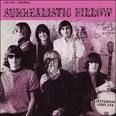
In Feb. 1967 the album Surrealistic Pillow by the Jefferson Airplane is released, launching the "San Francisco Sound", and giving the scads of newly-minted hippies their own masturbatory music to accompany their new "counterculture" of drugs and sex (with the pill) in the upcoming Summer of Love while their country goes to pot over Vietnam, as Baby Boomers are easily recruited right in their maximum hormone years with the looming draft putting a candle under their asses; meanwhile the movement has a dark side, as "underground comics" such as Zap Comix (first issue pub. in Nov., 25 cents) by R. (Robert) Crumb (1943-) give them visual lessons in drug-taking and unmarried promiscuous sex, incl. "humping", "69", etc.; the unlucky males who were drafted into Vietnam are made to feel bad about forever missing the experience of having a free-loving pot-smoking birth-control-popping hippie girl who puts out and/or shacks up without a wedding ring on her finger (and just disappears into smoke when they want to split), even though they partially make up for it with disease-filled Vietnamese "love you long time" hookers.

On Mar. 6, 1967 Pres. Johnson announces his plan for a draft lottery, issuing an executive order prohibiting draft deferments for post-graduate study except for men pursuing medical or dental degrees. On Mar. 8 the U.S. Congress authorizes $4.5B for the Vietnam War. On Mar. 10 after their F-4 Phantoms are hit by AA fire en route to bombing a steel mill N of Hanoi, North Vietnam, USAF Capt. John R. "Bob" Pardo (1935-2024) uses the novel Pardo's Push to save his wingman by pushing his tailhook, extending flight time to make it to safety in Laos. On Mar. 15 Ho Chi Minh responds to LBJ's proposal for direct peace talks by demanding an end to bombing and withdrawal of U.S. troops from South Vietnam; on Apr. 5 LBJ names Ellsworth Bunker (1894-1984) as the new ambassador to South Vietnam, replacing Henry Cabot Lodge Jr. (since July 31, 1965) on Apr. 28 (until May 11, 1973). On Mar. 19 Pres. Johnson meets in Guam with South Vietnamese PM Nguyen Cao Ky and pressures him to hold nat. elections. On Mar. 19 (night) the Second Battle of Ap Bau Bang is a V for the U.S. 5th Cavalry Regiment over two battalions of Viet Cong, who lose 227 KIA and three taken POW. On Mar. 22 the U.S. announces that Thailand has given permission to use their bases for B-52 bombers now based in Guam.

On Apr. 4, 1967 after urging by exiled Vietnamese Zen Buddhist monk Thich Nhat Hanh (1926-), Martin Luther King Jr. gives his Beyond Vietnam: A Time to Break Silence Speech at the Riverside Church in New York City, breaking his silence over Vietnam and splitting ranks with LBJ, attacking U.S. weapons sales to foreign countries, encouraging draft evasion, and proposing a merger between the civil rights and anti-Vietnam War movements, with the soundbyte "I knew that I could never raise my voice against the violence of the oppressed in the ghettos without having first spoken clearly to the greatest purveyor of violence in the world today, my own government... Somehow this madness must cease"; King nominates Hanh for the 1967 Nobel Peace Prize but makes the mistake of revealing it and making a "strong request" to pick him, causing them to not award the prize at all - so you wanna be the black JFK?
On Apr. 14, 1967 Richard Nixon visits Saigon, and says that the anti-Vietnam War protesters are "prolonging the war". Back when the young needed a political excuse to go out in a park and strip and have sex? On Apr. 15 the Spring Mobilization to End the War, organized by the Nat. Mobilization Committee to End the War in Vietnam (MOBE) (which also pushes black liberation) sees 50K-75K hold a anti-Vietnam War demonstration in San Francisco, Calif, and another 100K-400K in New York City; a protest at the U. of Calif. is dealt with by Gov. Reagan, who sees a radical that he had seen before in the 1949 Hollywood strike, and shouts "I knew you, Popsky!"; meanwhile Martin Luther King Jr. states that the Vietnam War is undermining Pres. Johnson's Great Society, with the soundbyte "The pursuit of this widened war has narrowed the promised dimensions of the domestic welfare programs, making the poor white and Negro bear the heaviest burdens both at the front and at home" - bang, you're dead? On Apr. 20 the U.S. bombs Haiphong Harbor in North Vietnam for the first time. On Apr. 24 U.S. Gen. William Westmoreland sounds off against U.S. anti-Vietnam War demonstrators, with the soundbyte that they give the North Vietnamese soldier "hope that he can win politically that which he cannot accomplish militarily"; meanwhile he privately tells Pres. Johnson that "the war could go on indefinitely." On Apr. 24-May 11 the Battle of Khe Sanh 10 mi. from North Vietnam near the Laos border sees U.S. 3rd Marines fight in the hills with the NVA, killing 940, while losing 155 killed and 425 wounded.

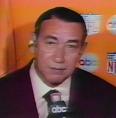

On Apr. 28, 1967 world heavyweight boxing champ Cassius Clay (1942-) (a newly-converted Black Muslim who changed his name to Muhammad Ali) refuses induction into the U.S. Army on the grounds that he is a Muslim minister, uttering the soundbytes "I only fight to expand the territory ruled by Sharia", er, "I ain't got no trouble with the Viet Cong"; "Why should they ask me to put on a uniform and go 10,000 miles from home and drop bombs and bullets on brown people in Vietnam while so-called Negro people in Louisville are treated like dogs and denied simple human rights? No, I'm not going 10,000 miles from home to help murder and burn another poor nation simply to continue the domination of white slave masters of the darker people the world over. This is the day when such evils must come to an end. I have been warned that to take such a stand would cost me millions of dollars, but I have said it once and I will say it again. The real enemy of my people is here... If I thought the war was going to bring freedom and equality to 22 million of my people, they wouldn't have to draft me, I'd join tomorrow. I have nothing to lose by standing up for my beliefs. So I'll go to jail, so what? We've been in jail for 400 years"; he is indicted on May 8, and convicted by a jury in Houston on June 20 of violating U.S. Selective Service laws when he again refuses induction into the U.S. Army after being denied conscientious objector status; sportscaster Howard William Cosell (Cohen) (1918-95) publicly supports his hero's decision, while sportscaster Walter Wellesley "Red" Smith (1905-82) disses him, saying "Cassius makes himself as sorry a spectacle as those unwashed punks who picket and demonstrate against the war"; he is given the maximum 5 years and $10K fine, but released on a $5K bond, then appeals to the U.S. Supreme Court and wins 8-0 on June 29, 1971, after he is stripped of his boxing title and his career ruined by Uncle Honky Sam; the WBA stages an 8-man tournament to crown a successor, which is won next Mar. 4 by Joe Frazier after former champ Floyd Patterson loses a controversial 12-round decision to Jerry Quarry - slapped down like any uppity nigger by the Man? By the end of Apr. the U.S. has 480K men in Vietnam, more than the peak number in the Korean War.
On May 2, 1967 Norodom Sihanouk of Cambodia assumes special powers as head of a provisional govt., which gives full recognition to the Vietnamese Nat. Liberation Front (Viet Cong) and North Vietnam. On May 2 Bertrand Russell holds the mock Russell Vietnam War Crimes Tribunal in Stockholm, Sweden, condemning the U.S. for the Vietnam War. On May 11 the siege of Khe Sanh ends with the base still in U.S. hands. On May 13 70K march in New York City in support of the Vietnam War; the leader is a fire capt. On May 18-26 U.S. and South Vietnamese troops enter the DMZ for the first time and fight the NVA, with both sides suffering heavy losses. On May 20-21 the Spring Mobilization Conference in Washington, D.C. sees 700 anti-Vietnam war activists meet to evaluate their Apr. 15 demonstrations in New York City and San Francisco, Calif., forming the Nat. Mobilization Committee to End the War (MOBE), with plans for a big demonstration in the fall. On May 22 Pres. Johnson publicly urges the North Vietnamese to offer a peace compromise. In May U.S. secy. of defense Robert S. McNamara sends a memo to LBJ opposing "still another request from Gen. William Westmoreland to escalate" by sending an additional 200K troops to Vietnam.
Baby boomers torn from their bedrooms to the jungles turn into animals trading ears for beers? In May-Nov. 1967 the 45-man Tiger Force (founded Nov. 1965), an elite U.S. Army "recondo" paratrooper unit of the 1st Battalion, 327th Infantry, 101st Airborne Div. in the Central Highlands of South Vietnam (motto: "out-guerrilla the guerrillas") go ape after being hit by snipers in the Song Ve Valley, and Lt. James Hawkins gives the order "Shoot anything that moves"; by Aug., under squad leaders Sgt. William Doyle and James Barnett they begin massacring entire villages, with Pvt. Sam Ybarra killing infants and keeping scalps and ears as trophies, while unit cmdr. Lt. Col. Gerald "Ghost Rider" Morse confuses the civilians with Viet Cong, asking for ever-more "kills"; in 1974 after a 4-year investigation the Army Criminal Investigation Div. (CID) issues a report by Austrian-born warrant officer Gus Aspey implicating individual soldiers in atrocities and accusing cmdrs. of turning a blind eye, but in Nov. 1975 new defense secy. Donald Rumsfeld orders it covered up; in Oct. 2003 journalists Michael D. Sallah and Mitch Weiss of the Toledo Blade expose it, winning the 2004 Pulitzer Prize.
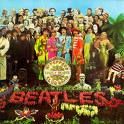
Da Summer of Love, Da Summer of Love? On June 1, 1967 the Beatles' album Sgt. Pepper's Lonely Hearts Club Band is released in the U.K., followed by the U.S. on June 2, being certified gold the day of release; the album photo incl. an image of Marlon Brando from 1953's "The Wild One", and writer Terry Southern; it holds the #1 slot in Britain for 27 weeks and in the U.S. for 19 weeks; the Hippie theme is just right for the Summer of Love, which begins in the U.S. as the Hippie (Hippy) Movement arrives bigtime; on June 25 the 2.5-hour Our World Satellite Broadcast, with performers from 19 nations and an audience of 400M features the Beatles singing "All You Need is Love" along with an orchestra and invited friends incl. the Rolling Stones, Eric Clapton, Marianne Faithfull, Keith Moon, and Graham Nash - Baby Boomer activism begins with masturbating to Beatles music in white suburban bedrooms, then progresses to becoming hippies and moving into cheap lodgings, parks and communes and driving VW buses while getting high and practicing free love, after which the 1960s end and they get real, pair up and join the corporate ladder-climbing world and become Yuppies, changing everything they touch, all with the Vietnam War as their Judge? On June 7 in response to the hordes of infected crotches flooding San Francisco for the Summer of Love, Am. physician David Elvin Smith (1939-) founds the Haight Ashbury Free Clinics at Haight St. at 509 Clayton St. with $500 in seed money from Rev. Leon Harris, pastor of All Saints Episcopal Church; the facility spawns a nationwide movement as bushy-tailed utopian Baby Boomers begin to suffer the reality of side effects of drug abuse and VD and expect free help?
In June 1967 the Mobile Riverine Force of U.S. Navy Swift boats becomes operational in the Mekong Delta, with the mission of halting Viet Cong usage of the inland waterways.; meanwhile U.S. Gen. William Westmoreland requests 200K more troops on top of the 475K scheduled already, but Pres. Johnson only gives him 45K more, for a total of 520K. In June the Vietnam Veterans Against the War (VVAW) is founded in New York City by six Vietnam War vets incl. David Braum, Jan "Barry" Crumb (1943-), and Mark E. Donnelly, who marched together in the Apr. 15 Spring Mobilization to End the War.
On July 2, 1967 the U.S. Marine Corps launches Operation Buffalo in response to the North Vietnamese Army's efforts to seize the Marine base at Con Thien in the DMZ; on July 3 North Vietnamese soldiers attack South Vietnam's only producing coal mine at Nong Son. On July 7 the North Vietnamese begin planning for the Tet Offensive on South Vietnamese cities, which will be preceded by attacks against remote border areas to draw the Yankees away from the cities, after which they are counting on a gen. uprising to precede an all-out invasion. On July 29 (10:52 a.m.) after a McDonnell Douglas F-4B Phantom mistakenly fires a Zuni rocket that strikes an external fuel tank of an A-4 Skyhawk, fire sweeps the aircraft carrier USS Forrestal in the Gulf of Tonkin, killing 134 servicemen and injuring 161, doing $72M damage, becoming the worst U.S. naval accident since WWII; survivors incl. future U.S. Sen. John MccAin and future U.S. adm. Ronald J. Zlatoper. On July 30 Gen. William Westmoreland claims that he is winning the war in Vietnam but needs more men; on Aug. 3 Pres. Johnson announces plans to send 45K more troops to Vietnam despite a speech by defense secy. Robert S. McNamara before a congressional committee opposing Westmoreland's plan for an expanded air war.
On Aug. 6, 1967 the Peace Torch Marathon sees a torch lighted in Hiroshima, Japan, then flown to San Francisco, Calif. on Aug. 27 before being run to Washington, D.C., arriving on Oct. 21 in time for the March on the Pentagon. On Aug. 9 the Senate Armed Services Committee holds closed-door hearings on the influence of civilian advisors on military planning in Vietnam; defense secy. Robert S. McNamara tells them that only "the virtual annihilation of North Vietnam and its people" via bombing can stop them.


On Aug. 15, 1967 the CIA under orders of Pres. Johnson begins Operation CHAOS (MHCHAOS), setting up a special ops group headed by Richard Ober (1921-) to spy on the U.S. anti-Vietnam War student movement and uncover possible foreign influence, compiling files on 7.2K Americans, and an index of 300K civilians and 1K groups, all in violation of their 1947 statutory authority, pointing to Ike, who told them it was okay in 1959 with Cuban refugees; by the time it ends in 1974, the operation spies on 13K people, incl. 7K U.S. citizens, incl. Jane Fonda and Benjamin Spock, and builds a database of 300K names, all without objections by Congress or a public outcry; on Nov. 15 CIA dir. Richard Helms tells LBJ that the CIA has found "no evidence of any contact between the most prominent peace movement leaders and foreign embassies in the U.S. or abroad", and does ditto in 1969; after the Watergate break-in, the operation is closed in 1973, and the New York Times exposes it on Dec. 22, 1974 with an article by Seymour M. Hersh.
On Aug. 17, 1967 U.S. atty. gen. Nick Katzenbach testifies before the Senate Foreign Relations Committee that the Tonkin Gulf Resolution of 1964 authorizes the pres. "to use the armed forces of the United States in whatever way necessary"; when Sen. Fulbright asks, "You think it is outmoded to declare war?", he replies, "I think the expression of declaring a war is one that has become outmoded in the international arena", causing Minn. Sen. Eugene McCarthy to storm out, declaring "There is only one thing to do, take it to the country" - name a fruit that begins with the letter P? On Aug. 18 Calif. gov. Ronald Reagan calls for the U.S. to get out of Vietnam because "too many qualified targets have been put off-limits to bombing". On Aug. 21 the Chinese shoot down two U.S. fighter-bombers who strayed across their border during North Vietnamese air raids. On Aug. 23 NBC-TV devotes several hours to live coverage of the return of U.S. POWs from Korea, mostly centered in San Francisco, Calif. In Aug. LBJ utters the immortal soundbyte: "Our forces will not be defeated. A Communist military takeover is no longer just improbable. As long as the U.S. and our brave allies are in the field, it is impossible."


On Sept. 1, 1967 North Vietnamese PM Pham Van Dong announces that they will "continue to fight". On Sept. 3 after nat. elections cause an 83% turnout, Lt. Gen. Nguyen Van Thieu (1923-2001) is elected as pres. #1 of South Vietnam's Second Repub. under the new anti-Communist 1967 South Vietnamese Constitution, and is sworn-in on Oct. 31 (until Apr. 21, 1975); ; his vice-pres. is Nguyen Cao Ky (1930-), the pair winning only 35% of the vote. On Sept. 4 Mich. gov. George Romney (1907-95) tells a TV interviewer that he'd undergone a "brainwashing" by U.S. officials during a 1965 visit to Vietnam, which damages his bid for the Repub. pres. nomination - plus the fact that he's a, ahem, Mormon? On Sept. 11. the Battle of Con Thien (ends Oct.) 2 mi. S of the DMZ sees U.S. Marines sieged by the NVA, who fire 42K artillery rounds at them, while the Marines respond with 281K rounds plus B-52 strikes, killing 2K NVA. On Sept. 11 Operation Wheeler, an extreme search-and-destroy operation begins in Vietnam (ends Nov. 11, 1968); the elite 45-man paratrooper Tiger Force of the 101st Airborne Div. (formed in Nov. 1965) murders hundreds of civilians and mutilates corpses, receiving a Pres. Unit Citation next Nov. by Pres. Johnson for its work at Dak To in June 1966. On Sept. 23 the Soviets sign a pact to send more aid to Hanoi. On Sept. 26 Hanoi rejects a U.S. peace proposal.

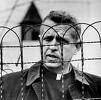


On Oct. 5 the North Vietnamese accuse the U.S. of dropping anti-personnel bombs on a school. On Oct. 16 5K rally on Boston Common in Mass., and after anti-Vietnam War speeches 280 burn their draft cards; after the open letter A Call to Resist Illegitimate Authority is signed by Presbyterian Yale U. chaplain-activist Rev. William Sloane Coffin Jr. (1924-2006) (who unsuccessfully tries to get Battell Chapel at Yale U. declared a sanctuary for draft resisters), Benjamin Spock et al., the nitwits in the govt. get the Boston Five indicted next Jan. 5 for conspiring to "counsel, aid and abet draft resistance"; only seminary student Michael Ferber is an actual draft resister; four of them are found guilty by the govt. machine court, but after they get attys. their convictions are overturned in 1970. On Oct. 16-17 after 1.6K hungry Viet Cong troops stay in the area to find rice, the Battle of Ong Thanh in the Iron Triangle 40 mi. SW of Saigon, Vietnam sees U.S. 160 men of Alpha, Bravo, and Delta Cos. of the First Infantry Div. uncover and attack their underground base, only to be ambushed, losing 64 KIA and almost all the rest wounded; Lt. Col. Terry Allen is KIA; the U.S. press attempts to cover up that it was an ambush, playing it up as their troops finally contacting some of the elusive VC and bringing the war to them with a big V, killing 300; Gen. Westmoreland visits the survivors and congratulates them, getting told that he should be congratulating the VC. On Oct. 16-21 Stop the Draft Week sees 10K riot in downtown Oakland, Calif. in an attempt to shut down the Oakland Induction Center, battling police while attempting to block buses carrying draftees to military bases, resulting in 125 arrests, incl. singer Joan Baez (who gets 45 days for disturbing the peace); on Oct. 16 draft card turn-ins are held across the U.S., while others paste eight draft cards to the door of the U.S. embassy in London; on Oct. 16 others occupy the U. of Chicago admin. bldg. for three days; on Oct. 17 Roman Catholic priest (1955-73) Philip Francis Berrigan (1923-2002) and three others splatter Selective Service records at the Baltimore Customs House in Md. with red liquid partly made of their own blood; on Oct. 21 50K-150K students march to the steps of the Pentagon "to confront the warmakers", causing 647 arrests by 2.5K federal troops and marshals- tomato paste is survival food? On Oct. 17 an anti-Vietnam War protest at the U. of Wisc. in Madison focuses on Dow Chemical Co. and their horrible napalm, with 300 peaceful protesters shouting "Down with Dow" while attempting to block recruiting interviews, causing campus officials to invite 30 local police onto the campus, who brutalize the peaceful mainly students, resulting in 65 being hospitalized with billy club and tear gas injuries, after which the press attempts to cover it up, claiming that the police were attacked by outside agitators and were defending themselves, pumping up the anti-war movement, resulting in a strike that shuts down the univ., becoming the first violent anti-Vietnam War protest, launching a new phase. On Oct. 21 the March on the Pentagon, organized by the 150-member Nat. Mobilization Committee to End the War in Vietnam (MOBE) sees 50K-70K anti-Vietnam War protesters march in Washington, D.C. to "Confront the War Makers", becoming the first of the bi-annual anti-Vietnam war demonstrations by the counter-culture, becoming the prototype for the demonstrations at the 1968 Dem. Convention in Chicago; Jerry Rubin is the project dir.; the biggest rally is held at the Lincoln Monument, featuring speaker Dr. Benjamin Spock - you had me at hell no I won't go? On Oct. 26 U.S. Navy pilot John Sidney McCain III (1936-2018) (later U.S. Repub. Sen. from Ariz. in 1987-2018), whose father and grandfather are 4-star adms. is shot down in his A-4 over North Vietnam, spending 5.5 years in prison, two in solitary confinement; he is forced to sign a confession admitting to being a war criminal; USAF pilot George Everette "Bud" Day (1925-) (shot down on Aug. 26, later becoming the most decorated U.S. service member since Gen. Douglas MacArthur) shares a cell with McCain, and later becomes a political backer. On Oct. 31 Pres. Johnson reaffirms U.S. commitment to support South Vietnam despite a poll indicating that 46% of Americans believe the Vietnam War to be a mistake, and a majority saying that the U.S. should "win or get out"; meanwhile Life mag. flip-flops on support for Pres. Johnson's war policies.

On Nov. 1, 1967 U.S. defense secy. Robert S. McNamara sends a memo to Pres. Johnson stating his conviction that the Vietnam War is unwinnable. On Nov. 3-Dec. 1 the Battle of Dak To along the border of Cambodia and Laos becomes the longest and most violent in the South Vietnamese highlands since the Battle of Ia Drang, with 1,644 NVA vs. 289 U.S. troops KIA, causing U.S. Gen. William Westmoreland to issue the soundbyte "Along with the gallantry and tenacity of our soldiers, our tremendously successful air logistic operation was the key to the victory." On Nov. 7 after getting pissed off at Arlo Guthrie's hit song "Alice's Restaurant", U.S. Selective Service dir. (1941-70) Lewis Blaine Hershey (1893-1977) announces that college students arrested in anti-Vietnam War demonstrations will no longer be eligible since they're convicted criminals, er, will lose their draft deferments and become eligible immediately, issuing the Hershey Directive to 4,088 U.S. draft boards, ordering them to reclassify all protesters against military recruiters as 1-A, causing a flood of draft evaders to Canada (10K total), where they receive help from the Students Union for Peace Action in Toronto (where they can get anything they want?); on Jan. 2, 1970 the U.S. Supreme Court in Nat. Student Assoc. v. Lewis B. Hershey rules his directive an unconstitutional violation of the right to free speech. On Nov. 11 Pres. Johnson makes another peace overture to Hanoi, which they reject; on Nov. 17 Pres. Johnson addresses the nation on TV, uttering the soundbyte "We are inflicting greater losses than we're taking... We are making progress"; meanwhile U.S. Gen. William Westmoreland tells Time mag. "I hope they try something because we are looking for a fight". On Nov. 24 Cambodian triple-agent Inchin Hai Lam (AKA Jimmie) is murdered; U.S. Special Forces Capt. John J. McCarthy is accused and later convicted in a court in Vietnam, but ultimately freed.

On Nov. 27, 1967 after he pisses him off with hs doubts about the Vietnam War, Pres. Johnson summarily dumps pesky secy. of defense #8 (since Jan. 21, 1961) Robert Strange McNamara (1916-) (who claims he doesn't know if he quit or was fired), and gives him a golden parachute by appointing him pres. of the World Bank, and on Nov. 29 he announces his resignation, with the soundbyte "Mr. President... I cannot find words to express what lies in my heart today"; his last day at the Pentagon is Feb. 29, 1968, where at his retirement ceremony he breaks down speechless, causing LBJ to put his around his shoulder and lead him out of the room; on the verge of a nervous breakdown at first, he serves two terms at the World Bank until 1981, believing that improving lives is a more promising path to peace than building up armies, tripling its loans to developing countries and changing its emphasis from large industrial projects to rural development, and in 1995 he voices his conclusion that "we were wrong, we were terribly wrong" about the war.

On Nov. 30, 1967 anti-Vietnam War Minn. Dem. Sen. Eugene J. McCarthy (1916-2005) announces his candidacy for U.S. pres., with the soundbyte "We are involved in a very deep crisis of leadership, a crisis of direction and a crisis of national purpose... The entire history of this war in Vietnam, no matter what we call it, has been one of continued error and misjudgment."

On Dec. 4-7, 1967 protests against the Vietnam War and the draft in New York City result in the arrests of 585, incl. 260 (incl. Allen Ginsberg and Benjamin Spock) on Dec. 5 at the U.S. Army Induction Center. On Dec. 5 the Viet Cong murder 252 of 2K anti-Communist Montagnard civilians in the hamlet of Dak Son, killing most of them with flamethrowers, then shooting 60 of the 160 survivors and taking most of the rest hostage, which the U.S. announces on Dec. 6, and Time mag. calls the "worst atrocity yet committed in the Vietnam War" in its Dec. 15 issue - somehow them peace demonstrators can't wrap their minds around this? On Dec. 8 the Battle of ?, the biggest battle yet in the Mekong Delta, 365 Viet Cong are killed - listed as killed? On Dec. 23 Pres. Johnson arrives in Cam Ranh Bay (2nd and last trip to Vietnam), uttering the soundbyte "All the challenges have been met. The enemy is not beaten, but he knows that he has met his master in the field"; meanwhile U.S. Navy SEALs are ambushed during an operation SE of Saigon. On Dec. 26 the South Vietnamese govt. threatens to pursue Communist troups into Cambodia if they are using it as an infiltration base; on Dec. 29 Beijing tells Cambodia that it will support it against any U.S. military operations; meanwhile the Cambodian Khmer Rouge Communists, led by Paris-educated Pol Pot (Saloth Sar) (1928-98) begin a peasant uprising in NW Battambang Province to protest a rice tax, which is suppressed by next year - since I got in the loop, heads started to roll? In Dec. 14 anti-Communist Am. scholars incl. Harvard historian Oscar Handlin pub. a report for the Freedom House Public Affairs Inst. claiming that disaster would strike the U.S. if it withdrew from Vietnam.


On Jan. 3, 1968 a savage U.S. assault in the Queson Valley of South Vietnam kills 329 North Vietnamese - on paper? On Jan. 5 the U.S. launches Operation Niagara to map NVA positions around Khe Sanh and provide an air umbrella (ends Mar.); meanwhile the U.S. loses its 10,000th plane over Vietnam - I found a giant jawbone, I found a shoe? On Jan. 13 the U.S. shifts most of its air targets from North Vietnam to Laos; Richard Etchberger dies in Laos, and his Medal of Honor is delayed until Sept. 4, 2010 because LBJ won't officially admit that the U.S. has troops there. On Jan. 15 former U.S. Mont. Rep. Jeannette Rankin (1880-1973) (first female U.S. Rep., known for voting against U.S. entry into WWI and WWII) leads 5K women of the Jeannette Rankin Brigade in a march on Capitol Hill in Washington, D.C. to protest the Vietnam War and show some woman power - does that make you cra-a-a-zy? On Jan. 17 LBJ's Fifth State of the Union Message touches on the Vietnam War, unemployment, poverty, crime and urban decay. On Jan. 18 black entertainer Eartha Kitt (1927-2008) links the high U.S. crime rate to the escalation of the Vietnam War at a White House luncheon given by Lady Bird Johnson for about 50 white and black women to discuss urban crime, with the soundbyte "You send the best of this country off to be shot and maimed, and they rebel in the street." On Jan. 19 Colombia and the Soviet Union resume diplomatic relations for the first time since 1948. On Jan. 19 Cambodia claims that U.S. and South Vietnamese troops crossed their border and killed three Cambodians.

I'll kill you, I'm not gonna crack? On Jan. 20-21, 1968 (night) after the U.S. deliberately lets the North Vietnamese build its forces up around the strategic 5K-man U.S. Marine base at Khe Sanh (which commands a major road junction and infiltration route S of the DMZ) so they will have more to shoot at, the Battle of Khe Sanh begins as 16-20K North Vietnamese troops under Gen. Vo Nguyen Giap (1911-2013) (who kicked French butt at Dien Bien Phu in 1954) go on the attack, causing the U.S. to withdraw on Jan. 21-22 under a heavy artillery barrage, which gets lucky and hits the main ammo dump, killing 18, wounding 40, and destroying 90% of the ammo, turning the Marines into cornered rats, while the U.S. press compares them to Dien Bien Phu; on Apr. 1 after Pres. Johnson tells the Joint Chiefs of Staff "I don't want any damn Dinbinfoo", and issues orders to the Marines to hold the base while demanding a guarantee "signed in blood" from the JCS to help them, Operation Pegasus begins to relieve the base, with three B-52s dropping 110K tons of bombs 24/7; on Apr. 6 the siege is lifted after 76 days.
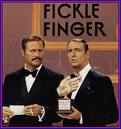





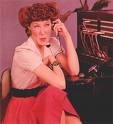
U.S. evening TV becomes a political veapon? On Jan. 22, 1968 (Mon.) Rowan & Martin's Laugh-In debuts on NBC-TV for 140 episodes (until May 14, 1973) to cheer up a jittery America, hosted by stand-up comedians Dan Rowan (1922-87) and Dick Martin (1922-2008), who begin the standing joke format (later adopted by the Smothers Brothers) of pretending not to be too obvious about being against the Vietnam War as well as totally politically and socially liberal, despite the jokes ridiculing the KKK, NRA, Pentagon et al.; the anti-establishment show makes a star of ditzy blonde Goldie Jeanne Hawn (1945-) ("My I.Q. has never been questioned; come to think of it, it has never been mentioned"), along with Arthur Stanton Eric "Arte" Johnson (1929-) ("Ve-e-e-ry interesting, but stupid"), Ruth Buzzi (1936-), Judy Carne (Joyce Audrey Botterill) (1939-2015) "Sock it to me!", JoAnne Worley (1937-) ("Is that a chicken joke?"), and Mary Jean "Lily" Tomlin (1939-), introducing "Look that up in your Funk and Wagnalls", "You bet your bippy", and "Heah come de judge" to the Am. lexicon; what uncanny luck debuting eight days before the Tet Offensive?; "Say good night, Dick"; "Good night Dick".


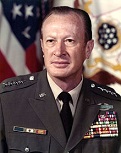


On Jan. 25-31, 1968 Soviet PM Kosygin visits India, resulting in a joint declaration calling for an unconditional end to U.S. bombing in North Vietnam. On Jan. 29 "extensive enemy build-up" causes South Vietnam to cancel the Tet (Lunar New Year) truce. Tut tut tut, it's Tet? On Jan. 30 (night)-Mar. 7 the surprise Tet Offensive sees 84K Viet Cong guerrillas and NVA troops attack all U.S. bases in Vietnam (36 South Vietnamese provincial capitals, 60 towns and five large cities); Saigon is attacked, incl. the airfield, pres. palace, and U.S. embassy by 17 Viet Cong commandos (Jan. 31), freaking out the TV-watching U.S. public after years of TV news assuring them that the enemy is almost kaput; luckily U.S. Col. (later Gen., last cmdr. of U.S. military ops in Vietnam in 1972-3) Frederick Carlton "Fred" Weyand (1916-2010) (a WWII vet) sensed the attack and had troops positioned to protect Saigon, and on Feb. 1 they drive the North Vietnamese out of Tan Son Nhut Airport, stopping a possible capture of the South Vietnamese military HQ; on Feb. 1 Saigon police chief Gen. Nguyen Ngoc Loan (1921-98) executes a plaid-shirt-wearing Viet Cong Lt. with a Nazi-style pistol shot to the head in the street in a scene captured in a famous News Photo of a 1968 Street Execution of a Captured Viet Cong (The Saigon Execution) by AP photographer Eddie Adams (1933-2004) (along with color footage by NBC cameraman Vo Suu), which becomes a crystallizer of popular opposition to the war, saying everything about the senseless chaos and why the U.S. has no business being halfway around the world, although the real story that the whole week was marked by thousands of insurgents being killed while the latter do their bad deeds also, wreaking atrocities on civilians incl. beheading of women and children, and that the VC Lt. was the leader of a terrorist gang who killed the family of one of Loan's deputy cmdrs. is lost in the confusion of mass change of public opinion balance; "Two people died in that photograph; the general killed the Viet Cong; I killed the general with my camera" (Adams); the same day (Feb. 1) Elvis and Priscilla Presley give birth to their daughter Lisa Marie Presley (1968-); Nguyen Ngoc Loan leaves Vietnam in 1975, and opens a pizza restaurant in Va. until public disclosure causes him to close it in 1991; all 105 cities attacked are successfully defended by Mar. 7, with 11K total dead, but it is a psychological V for the Viet Cong, causing the U.S. pop. to begin turning against the war irreversibly, helped on Feb. 8 by Robert F. Kennedy (always at the forefront?) publicly stating that the U.S. cannot win the war; meanwhile during the Tet Offensive anti-Vietnam War activists Rev. Daniel Berrigan (1921-) (a Jesuit) and historian Howard Zinn (1922-2010) visit Hanoi, getting three U.S. POW airmen released (first of the war); Zinn goes on to edit "The Pentagon Papers" for Daniel Ellsberg - a shoe-in to win the pres. nomination now?
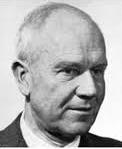

On Feb. 6-7, 1968 Langvei U.S. Special Forces Base in South Vietnam for special ops into Laos and North Vietnam falls to the Communists after an 18-hour siege and tank battle, killing half of the 500 defenders. On Feb. 19 Harvard U. historian Clarence Crane Brinton (1898-1968), author of "The Anatomy of Revolution" (1938) testifies at the Fulbright Senate hearings on the Vietnam War, saying that Americans love revolutions but not Commie ones before dying on Sept. 7. On Feb. 24 the ancient capital city of Hue is finally cleansed of Viet Cong, although it is reduced to rubble, becoming the last major North Vietnamese stronghold cleared, and halting the Tet Offensive (begun Jan. 30). On Feb. 27 Walter Cronkite comments on his nightly news broadcast that "To say we are mired in a stalemate [in Vietnam] is the only if not satisfactory conclusion." On Feb. 29 after getting pissed-off at the Tet Offensive, U.S. defense secy. (since 1961) Robert Strange McNamara (1916-2009) resigns to become pres. of the World Bank (until 1981), and on Mar. 1 is succeeded by Kan.-born Clark Clifford (1906-98), who becomes U.S. defense secy. #9 (until Jan. 20, 1969), working to extricate the U.S. from that "wretched conflict in Vietnam". On Mar. 7 the Battle of Saigon ends. On Mar. 9 Gen. Westmoreland requests 206K more troops for Vietnam.


On Mar. 12, 1968 peace candidate Wisc. Sen. "Clean Gene" Eugene McCarthy (1916-2005) gets 42% of the vote and comes within 230 votes of ousting incumbent LBJ in the N.Y. Dem. primary after economist John Kenneth Galbraith breaks with LBJ over the Vietnam War and switches to him, after which Jewish-Am. writer Jeremy Larner (1937-) becomes his speechwriter.
On Mar. 16, 1968 Pres. Johnson decides to send another 35K-50K troops to Vietnam. By spring there are 30 college demonstrations taking place a month throughout the U.S., and even high schools and junior highs are joining in; in Feb. hundreds of 8th graders take over Junior High School 258 in the Bedford-Stuyvestant section of Brooklyn and set off fire alarms to demand better food and more dances - everybody hates Chris?




On Mar. 16, 1968 in South Vietnam's Quang Ngai Province the My Lai (Song My) Massacre of 350-500 men, women, and children carried out by U.S. troops of the 11th Infantry Brigade of the Am. Div., C Co., 1st Battalion, 20th Infantry, under orders of Army Lt. William Laws "Rusty" Calley Jr. (1943-) (William callously breaks the laws?) in retaliation for the Viet Cong killing of a popular sgt. stinks up the U.S. name in Vietnam, although it is buried, er, covered-up for a year; La.-born warrant officer Hugh C. Thompson Jr. (1943-2006) and his recon heli crew try to stop the massacre, landing and rescuing a dozen villagers, then get ostracised for it; after two soldiers write their congressmen about it, the U.S. Army puts up-and-coming African-Am. Maj. Colin Luther Powell (1937-) in charge of an investigation, who later writes "In direct refutation of this portrayal is the fact that relations between American soldiers and the Vietnamese people are excellent."
On Mar. 17, 1968 after a rally by 10K in Trafalgar Square in London, a demonstration by 8K in Grosvenor Square against U.S. involvement in the Vietnam War sees actress Vanessa Redgrave permitted to enter the U.S. Embassy with three supporters to deliver the message, after which the protest grows violent, and 91 police are injured while arresting 200+; Mick Jagger writes Street Fighting Man to commemorate it.


On Mar. 18, 1968 encouraged by the Mar. 12 results of Eugene McCarthy, Mass. Dem. Robert Francis "Bobby" Kennedy (1925-68) joins the U.S. pres. race, with Frank Mankiewicz (1924-) (son of "Citizen Kane" screenwriter Herman Mankiewicz) as his press secy. - hey, my name is on the space center in Fla.?
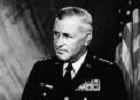

On Mar. 22, 1968 Gen. William C. Westmoreland is relieved of his duties in the wake of the Tet disaster, returning to the U.S. as Army chief of staff until his 1972 retirement, and on June 11 he is succeeded by Lloyd Bridges lookalike Gen. Creighton Williams Abrams III (1914-74), who reverses Westmoreland's aggressive strategy of attrition of enemy forces, ending major search-and-destroy missions (which have been given a bad name by the press) and focusing on the nicer-sounding protection of pop. centers; meanwhile on July 1 William Egan Colby (1920-96) takes charge of the CIA pacification campaign known as the Phoenix Program to help the South Vietnamese govt. root out (don't say search) and pacify (don't say destroy) the civilian infrastucture supporting the Viet Cong, eventually assassinating 20K-60K suspected Viet Cong in Vietnamese villages (ends 1972) - justice the American way? On Mar. 28 the U.S. loses its first aircraft in Vietnam, an F-111 - first that it will admit to?


JFK was right all along and we had him bumped off for nothing? On Mar. 31, 1968 (Sun. evening) Pres. Johnson orders an end to bombing of North Vietnam N of the 20th parallel, and asks Ho Chi Minh "to respond positively and favorably to this new step toward peace"; Gen. William C. Westmoreland utters the soundbyte "The enemy has been defeated at every turn"; Johnson then stuns the nation by announcing that "I shall not seek and I will not accept the nomination of my party as your president"; he did it to concentrate on the Vietnam War, or because he realized that JFK was right about Vietnam and they killed him for nothing?; the next day the stock market soars, and on Apr. 3 North Vietnam agrees to schedule preliminary peace talks with the U.S.; LBJ's advisor Arthur Hobson Dean (1898-1987) is instrumental in persuading him to halt the bombing and not run for reelection; Jewish New York civil-rights atty. and anti-Vietnam War activist Allard Kenneth Lowenstein (1929-80) leads the public opposition to another term for LBJ. On Apr. 5 U.S. army units relieve the Marines at Khe Sanh after 76 days, and on Apr. 6 the siege is officially declared ended; evacuation is complete by June 27. On Apr. 15-17 Pres. Johnson confers with the U.S. military cmdr. of South Vietnam and Pres. Park Chung-hee of South Korea in Honolulu; meanwhile on Apr. 15 the North Koreans shoot down a U.S. intelligence plane 90 mi. off the coast, raising tensions near the war point. On Apr. 16 the Pentagon announces the "Vietnamization" (coined by Herman Kahn) of the war, claiming that U.S. troops will be coming home - alive or in coffins?





The no-king rule rules brainy King's College? On Apr. 23, 1968 an 8-day sit-in begins at the 17.5K-student campus of Columbia U. in New York City, incl. students, the SDS, and black activists H. Rap Brown and Stokely Carmichael, protesting the you know what war as well as the construction of a gym in an area they claim is needed for low-cost housing, causing construction to halt on Apr. 25, after which the students, led by Mark William Rudd (1947-) of the SDS take over five bldgs. in a week-long sit-in, holding several officials hostage for 24 hours, and trashing the offices of pres. #14 (since 1958) Grayson Louis Kirk (1903-97), demanding amnesty for protesters, causing provost (since 1967) David Bicknell Truman (1934-) (who has already let them have a 2-week break between classes and finals and allowed men to close their dorm room doors when their babes are present) to call in the pigs on Apr. 30, who make 628 arrests; on May 5 classes are suspended, and a 2nd occupation of Hamilton Hall starting on May 17 ends with a police raid on May 22, with 17 pigs and 81 students injured, and 177 students arrested; 30 students end up suspended, and a number of students walk out of the graduation ceremony; Canadian-born people's choice semanticist Samuel Ichiye "S.I." Hayakawa (1906-92) is named the new pres., and reopens the campus on Dec. 2, then closes it early for the Christmas vacation to avoid having high school students join the protest; a commission appointed by the faculty concludes that "the seizure of the buildings was not simply the work of a few radicals" but "involved a significant portion of the student body who had become disenchanted with the operation of their university"; a commission appointed by the faculty concludes that "the seizure of the buildings was not simply the work of a few radicals" but "involved a significant portion of the student body who had become disenchanted with the operation of their university"; before the ruckus started, French-born historian Jacques Martin Barzun (1907-)2012 (provost and dean of the graduate school and faculties since 1955) was ridiculed for claiming that the liberal arts are "dead or dying".



On Apr. 30-May 3 the North Vietnamese sieges Dong Ha Combat Base in the Battle of Dai Do, with 81 U.S. Marines KIA vs. 600+ PAVN guerrillas; Capt. James E. Livingston and Capt. Jay R. Vargas are awarded the Medal of Honor. On May 1-15 the U.S. sieges Nhi Ha, Vietnam. On May 5 Communists shell 110 towns and military areas in a new offensive in South Vietnam. On May 13 prelminary peace talks on Vietnam begin in Paris, with U.S. chief delegate W. Averell Harriman (1891-1986) calling for restraint by North Vietnam in return for a total U.S. bombing halt, and North Vietnamese chief delegate Xuan Thuy (1912-85) talking about the "monstrous crimes" of the U.S. On May 17 10K gather in Sproul Plaza in Berkeley, Calif. for a special commencement for the graduating class who are about to be sent to Vietnam as "cannon fodder". On May 25 the Communists open another major attack on Saigon after Viet Cong infiltrate in large numbers. On May 28 former PM (1964-5) Tran Van Huong (1903-82) replaces Nguyen Van Loc as PM of crumbling South Vietnam (until Sept. 1, 1969).
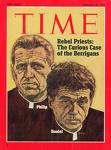
On May 27, 1968 U.S. Memorial Day is celebrated on the last Monday of the month rather than on the 30th for the first time; perhaps to rub it in, on May 27 the U.S. Supreme Court rules in U.S. v. O'Brien that burning, destroying or mutilating a draft card is a crime as stated in a 1965 amendment to the U.S. Selective Service Act, and rejects arguments of unconstitutionality; a few days later brother Jesuit priests Philip Francis Berrigan (1923-2002) and Daniel Berrigan (1921-), with seven other Catholic activist priests enter a draft board office in Catonsville, Md., and seize nearly 400 files on young men classified 1-A, then burn them with homemade napalm made from an army recipe, becoming known as the Catonsville Nine; they are all sentenced to prison terms of 2-3.5 years, but Daniel Berrigan escapes and speaks out against the war and writes the 1970 play "The Trial of the Cantonsville Nine" until his Aug. 1970 rearrest - they said it would be illegal to burn draft cards, not draft files?
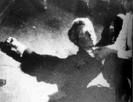

Another great American what-if? On June 4, 1968 U.S. pres. candidate (D.-N.Y.) Robert Francis "Bobby" Kennedy (b. 1925) wins the Calif. Dem. pres. primary, beating Eugene McCarthy (Hubert Humphrey was not entered) and giving him a total of 174 delegate votes, incl. those won in Ind. and Neb., and his loss in Ore.; too bad, on June 5 (Wed.) (12:50 a.m. PDT) he is shot as he exits through the kitchen after a campaign speech at the Ambassador Hotel in Los Angeles, Calif. (opened in 1921) (where he stands beside UFW leader Dolores Huerta, and utters the soundbyte "Fear not the path of truth for the lack of people walking on it") by Jerusalem-born Jordanian Christian Sirhan Bishara "Sol" Sirhan (1944-), who lived in the U.S. since the 1950s; he dies 26 hours later on June 6 in Good Samaritan Hospital; singer Andy Williams (a friend of the Kennedy family) is present at the speech, and Bobby had asked him to be a delegate for him even though he is a Repub.; RFK's bodyguards incl. Rafer Johnson and Rosey Grier; Sirhan uses a snub-nose 8-shot .22-cal. Iver-Johnson revolver (Model 55SA), given to him by his big brother Munir "Joe" Sirhan, an employee at Nash's Dept. Store, originaly purchased for $31.95 in Aug. 1965 by a Los Angeles resident for protection during the Watts Riots; Sirhan receives the death sentence, which is commuted to life in priz in 1972 when the Calif. Supreme Court invalidates the death penalty; in 2006 he comes up for parole at a time when gov. Arnold "Terminator" Schwarzenegger is married to Maria Shriver, daughter of Eunice Kennedy Shriver, RFK's sister, and is denied; singer Rosemary Clooney is present at the assassination; ABC-TV journalist Howard K. Smith is anchoring coverage of the Calif. pres. primary at 3 a.m. as the closing credits are airing when word comes in of the shooting, causing him to leave the camera showing a wide shot of the newsroom for several min. while he goes backstage to confirm the story and return with a special report, continuing to air reports of RFK's condition for several hours; the RFK assassination turns Jackie Kennedy against the U.S., with the soundbyte: "I hate this country. I despise America and I don't want my children to live here anymore. If they're killing Kennedys, my children are number one targets... I want to get out of this country"; was the CIA behind the assassination because the fatal shot came from behind RFK, perhaps from security guard Eugene Cesar, while Sirhan was standing in front, and they couldn't let RFK become pres. and figure out that they were behind the muddah of his bruddah?; 11 bullets were found that supposedly came from Sirhan's 8-bullet gun?; the coroner found powder burns on RFK's ear next to the fatal shot in the back of his head and testified that the gun had to be only 2-3 in. away for that effect, but that Sirhan fired his pistol in front of RFK and was 3-6 ft. away?; an expert on hypnotism hypnotizes Sirhan in prison, and says he could have been programmed under hypnotism prior to the assassination?; how did Sirhan know that RFK would be sneaking through the pantry?; Bobby's brother Edward More "Ted" Kennedy (1932-2009) becomes the target of constant death threats, incl. a $1M reward offered by Sirhan Sirhan to a jailmate to kill him (which he declines), causing him to delay his run for U.S. pres. for 12 years; liberal Jewish-Am. U.S. rep. (D-N.Y. (1969-71) Allard Kenneth Lowenstein (1929-80) later exposes the anomalous forensic evidence on William F. Buckley Jr.'s PBS-TV show Firing Line in 1975. On June 6 Pres. Johnson signs legislation extending Secret Service protection to major pres. and vice-pres. candidates - closing the what after the what gets out?
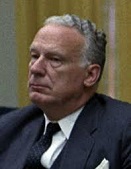


On June 7-14, 1968 the U.S. conducts Operation Swift Saber in Elephant Valley, a VC infiltration route 10 mi. NW of Da Nang Valley in Vietnam. On June 19 Pres. Nguyen Van Thieu signs the first gen. mobilization law in South Vietnam history, permitting the drafting of males age 16-50. On June 26 former undersecy. of state for economic affairs in the Kennedy admin. (1961-8) George Wildman Ball (1909-94), known for Ball's Rule of Power "Nothing propinks like propinquity", and who was called crazy by JFK for suggesting that the Vietnamese War one day might need up to 300K troops, then helped overthrow Pres. Ngo Dinh Diem replaces resigning Arthur J. Goldberg as U.S. ambassador to the U.N. #7 (until Sept. 25). On July 3 Gen. William C. Westmoreland succeeds Gen. Harold K. Johnson as U.S. Army Chief of Staff (until 1972). On July 7 Vietnam protesters in London's Grosvenor Square take their cues from Americans and play for media coverage, vending big gross venal signs and placards such as "Take own your gun, buddy and go home", causing Walter Cronkite and others to begin to question the role of TV in shaping events. On July 19-20 Pres. Johnson confers with South Vietnamese Pres. Thieu in Honolulu. On July 23 Robert Franklin "Bo" Worley (b. 1919) becomes the first and only U.S. gen. to be killed in Vietnam when his RF-4C Phantom jet crashes in Thua Thien Province 65 mi. NW of Da Nang Air Base after being hit by enemy fire. On July 26 South Vietnamese opposition leader Truong Dinh Dzu, who ran on a peace platform last Sept. is sentenced to five years of hard labor for advocating a new coalition govt. to try to end the war, becoming the first person convicted under a 1965 decree prohibiting interference with the "government's struggle against Communism" - he gave me that hard sandwich, and I fell in love? On Aug. 21 the Medal of Honor is posth. awarded to PFC James Anderson Jr. (1947-67), becoming the first African-Am. U.S. Marine to get one.

On July 24, 1968 the Newport, R.I. Folk Festival makes Arlo Guthrie (1947-), son of folk singer Woody Guthrie a star with his performance of his 1967 hit Alice's Restaurant (Massacree), which becomes the new 18 min. 34 sec. anti-Vietnam War anthem, with cool lyrics about his Stockbridge, Mass. arrest on Thanksgiving 1965 and the fun of draft evasion at 1 Whitehall St., New York City, where his criminal record gets him send to "Group W bench 'cause you want to know if I'm moral enough to join the army, burn women, kids, houses and villages after bein' a litterbug?"; the conclusion is that when facing the draft one should tell the military pshrink "Shrink, you can get anything you want at Alice's Restaurant" and walk out; the Thanksgiving dinner is actually held at her home in Great Barrington, Mass. (6 mi. N of Stockbridge), a former church, which later becomes the Guthrie Center; the real restaurant is at the E end of Main St. in Stockbridge, W Mass. near the Housatonic River S of I-90 (40 mi. SE of Albany, N.Y.); Norman Rockwell lived there for the last quarter of his life and his studio was also on Main St.; the Dump is 1 mi. W of town on Glendale Middle Rd. (closed in 1965); the foot of the 15-ft. cliff where he dumped the garbage later becomes the site of a house; the town of Lee 6 mi. E up Rt. 7 is where the blind judge fines Guthrie $50 in a red brick courthouse; Trinity Church (by the railroad tracks), where Alice and Ray (and Fasha the dog) live in the bell tower and serve their holiday meal and stash their garbage is in Van Deusenville 4 mi. SW of the Dump; the song is the same length as the 18.5 min. Watergate tape gap?

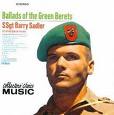
On June 19, 1968 John Wayne's The Green Berets (Batjac Productions), based on the 1965 Robin Moore novel stars Wayne as a you know what, and David Janssen as a skeptical journalist who follows him around and comes to realize that the Vietnam War is good; the only major Hollywood film to support the war?; shocks Wayne worshipper Phil Ochs, and spawns the hit song Ballad of the Green Berets by Green Beret SSgt. Barry Allen Sadler (1940-89); watch trailer - if they were only fighting Apaches instead?


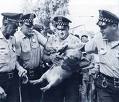
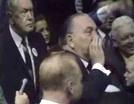









On Aug. 22-30, 1968 the 1968 Dem. Nat. Convention in Chicago, Ill. is the scene of mass protests by militant yippies and hippies, which are ruthlessly quashed by police, Nat. Guardsmen, and federal troops with tear gas and clubs, incl. the Festival of Life in Grant and Lincoln Parks, attended by 10K militants protesting the rising death toll in Vietnam by staging rock concerts (by MC5, etc.) in front of marijuana-smoking, nude public-lovemaking, draft-card-burning Baby Boomers, which is crushed on Aug. 25 by 16K Chicago pigs, 4K state pigs, and 4K Nat. Guardsmen armed with tear gas and nightsticks, cracking heads at mayor Richard Daley's orders to prevent them from overnighting; 308 are arrested, and later eight cops are indicted for use of excessive force (all acquitted); NBC-TV journalists Edwin Newman, John Chancellor, Frank McGee, and Sander Vanocur wear technologically advanced backpacks on the convention floor to conduct the first-ever live interviews with delegates, earning the title "Four Horsement of the Apocalypse"; on Aug. 27 CBS-TV journalist Dan Rather (1931-) is punched in the stomach while covering the convention; after convention chmn. (House Majority leader) Carl Bert Albert (1908-2000) fails to gain control of the rowdy delegates, LBJ calls U.S. Dem. Ill. rep. (1959-95) Daniel David "Dan" Rostenkowski (1928-2010) to take over, pissing Albert off and turning him into an enemy for life, starting by passing him over for House whip for Tip O'Neill when he becomes House Speaker a few weeks after the convention, after which Rostenkowski's own party refuses to nominate him for a 3rd term as chm. of the Dem. Caucus; on Aug. 28 Conn. Dem. U.S. Sen. (1963-81) Abraham Alexander Ribicoff (1910-98) gives a speech nominating George McGovern, ad-libbing the soundbyte "If George McGovern were president, we wouldn't have these Gestapo tactics in the streets of Chicago", after which the TV cameras pan in on mayor Richard J. Daley, who allegedly mumbles "Fuck you, you Jew son of a bitch"; Julian Bond gives a well-received Seconding Speech for Eugene McCarthy, which is written by McCarthy's speechwriter Jeremy Larner, launching Bond's nat political career; leaders of the protest incl. Yippie leaders Abbie Hoffman and Jerry Rubin, who get in a fight on Aug. 22 after deciding to run a pig for president, with Hoffman wanting a small and cute pig and Rubin wanting a big and ugly pig (they end up with a 200-lb. porker purchased by Phil Ochs et al. named Pigasus); other leaders incl. Rennard Cordon "Rennie" Davis (1941-), Thomas Emmet "Tom" Hayden (1939-) of Students for a Dem. Society (SDS), Black Panther leader Bobby Seale, and civil rights advocate David "Dave" Dellinger (1915-2004) (head of Mobe). On Aug. 27-29 Gore Vidal (1925-2012) and William Frank (Francis) "Bill" Buckley Jr. (1925-2008) engage in a series of televised debates during the 1968 Dem. Nat. Convention, with Vidal against the Vietnam War and Buckley for it, disagreeing over the actions of the Chicago police against the protesters et al.; on Aug. 28 when discussing the raising of the Viet Cong flag by the protesters, Vidal says that many think the Viet Cong are right, and calls Buckley the "only proto-crypto-Nazi I can think of", and Buckley replies "Now listen, you queer, stop calling me a crypto-Nazi or I will sock you in your goddamn face, and you'll stay plastered." On Aug. 28 while police and demonstrators clash outside, the Gettysburg, er, Dem. Nat. Convention nominates vice-pres. Hubert H. Humphrey for pres., and Maine Sen. Edmund Sixtus "Ed" Muskie (1914-96) for vice-pres.; Humphrey becomes the first nominee who doesn't win a majority of votes in the primaries (because of RFK's death); too bad, the spectacle of scruffy not-so-white street protesters and respectable and not so respectable Dems. at each other's throats, combined with Humphrey's unwillingness to repudiate the admin.'s unpopular war policies makes the normally scary Repubs. a shoe-in with the white Silent Majority sitting in front of their TV sets eating their Swanson TV dinners?

In Aug. 1968 U.S. Gen. George S. Brown (1918-82) begins overseeing the Vietnamization of the air war; U.S. troop numbers in Vietnam reach 541K this mo.


On Sept. 15, 1968 Rev. Billy Graham carries word to Pres. Johnson from Richard Nixon that he will give Johnson a share of the credit when the Vietnam War is settled; Johnson later becomes convinced that Nixon is using Beijing-born Anna Chennault (Chen Xiangmei) (1925-), widow of WWII "Fighting Tigers" cmdr. Lt. Gen. Claire Lee Chennault (1893-1958) to persuade Pres. Nguyen Van Thieu to sabotage the Paris peace talks by promising him a better deal after he gets elected. On Sept. 29-30 the USS New Jersey, the world's only active battleship goes into combat off the coast of North Vietnam - now we admit we're losing? On Oct. 8 the U.S. launches Operation Sealord, an attack on North Vietnamese supply lines and base areas in the Mekong Delta. On Oct. 14 the U.S. Dept. of Defense announces that 24K Marines and soldiers will be sent back to Vietnam for involuntary second tours. On Oct. 31 (Thur.) Pres. Johnson announces a complete cessation of "all air, naval, and artillery bombardment of North Vietnam" N of the 20th parallel (AKA Operation Rolling Thunder) effective Nov. 1, and begins withdrawing troops from Vietnam. On Oct. 31 a Communist rocket attack on Saigon kills 21 civilians; Hue and My Tho are also attacked.

On Nov. 11, 1968 the U.S. begins Operation Commando Hunt (ends 1972) to interdict men and supplies on the Ho Chi Minh Trail through Laos into South Vietnam, eventually dropping 3M tons of bombs on Laos without seriously disrupting trail operations. On Nov. 14 Nat. Turn In Your Draft Card Day caps off a day of protest rallies on U.S. campuses as the Vietnam War U.S. death toll reaches 30K and U.S. troop strength reaches its peak of 550K. On Nov. 26 South Vietnam ends its boycott of the Vietnam peace talks, and their delegation arrives in Paris on Dec. 8, but insists that the Viet Cong not be recognized as separate from the North Vietnamese delegation. On Nov. 26 Bell UH-1F heli pilot USAF 1st Lt. James Philip Fleming (1943-) rescues a 6-man Army Special Forces unit pinned down by Viet Cong fire near Duc Co (30 mi. W of Pleiku), later receiving a Medal of Honor. On Dec. 25 future Mass. Sen. John Kerry claims he is sitting on a gunboat in Cambodia, "The president of the United States telling the American people that I was not there" (1986 U.S. Senate committee hearing). In 1968 Milton Glaser's and Lee Savage's Mickey Mouse in Vietnam debuts, a cartoon satire of the Vietnam War.














On Jan. 5, 1969 pres.-elect Nixon appoints Henry Cabot Lodge Jr. as U.S. negotiator at the Paris Peace Talks, effective Jan. 20. On Jan. 10 Sweden becomes the first Western nation to recognize North Vietnam. On Jan. 20 Richard "Tricky Dicky" "King Richard" Milhous Nixon (1913-94) becomes the 37th U.S. pres. (until 1974) (2nd Quaker after Hoover, and neither of them last 8 years?) in the 54th U.S. Pres. Inaguration; 3rd pres. to be elected for a 2nd term and not finish (Lincoln, McKinley); his wife Pat Nixon swears him in on a family Bible; Spiro Theodore "Ted" Agnew (1918-96) becomes the 39th U.S. vice-pres.; Nixon's First Inaugural Address contains the soundbyte: "We have endured a long night of the American spirit. But as our eyes catch the dimness of the first rays of dawn, let us not curse the remaining dark. Let us gather the light. Our destiny offers, not the cup of despair, but the chalice of opportunity. So let us seize it, not in fear, but in gladness, and, riders on the Earth together, let us go forward, firm in our faith, steadfast in our purpose, cautious of the dangers, but sustained by our confidence in the will of God and the promise of man"; First Lady is Thelma Catherine Patricia "Pat" Ryan Nixon (1912-93) (Secret Service codename: Starlight) (a smoker); the Nixons used to have a pet cocker spaniel named Checkers (1952-64), who woulda been First Dog; Nixon becomes known for raising his arms in a giant V sign with his first two fingers extended from closed fists in small V signs; a Gallup Poll finds that he's the most admired American; the Paris Peace talks begin negotiating full withdrawal of U.S. troops from Vietnam; on Jan. 22 the new cabinet is sworn in, incl. Neb.-born Melvin Robert Laird (1922-) as defense secy. (until 1973) (who coins the term "Vietnamization"), William Pierce Rogers (1913-2001) as sec. of state (until Sept. 3, 1973), Nixon's campaign mgr. John Newton Mitchell (1913-88) (JFK's WWII PT boat unit cmdr.) as U.S. atty.-gen. #67 (until 1972), issuing the soundbyte "Watch what we do, not what we say", and U. of Neb. chancellor Clifford Morris Hardin (1915-) as agriculture secy. (until 1971); on Jan. 22 construction magnate Winton Malcolm "Red" Blount Jr. (1921-2002) becomes U.S. postmaster-gen. #59 (until Jan. 1, 1972), running into a giant postal strike next Mar.; Senate delay causes Alaska gov. #2 (since 1966) Walter Joseph "Wally" Hickel (1919-) to be sworn-in as interior secy. #38 on Jan. 25 (until Nov. 25, 1970), becoming a strong environmentalist, demanding controls of the Alaskan oil industry and offshore oil rigs; 29-y.-o. former Jungle Cruise skipper at Disneyland (a non-journalist) (non-Jew, sorry) Ronald Louis Ziegler (1939-2003) becomes White House press secy. (until 1974), youngest ever; Jewish TV Guide pub. Walter Huber Annenberg (1908-2002) sells the Philadelphia Inquirer and Phila. Daily News to Knight Newspapers for $55M, and is appointed U.S. ambassador to Britain, becoming so popular that they knight him; Pres. Reagan later appoints his wife Leonore "Lee" Annenberg as State Dept. chief of protocol; Nelson Rockefeller backer Henry Kissinger claims to meet Nixon for the first time after he becomes pres., which doesn't stop his enemies from claiming he was maneuvering to become nat. security adviser all along; Nixon flops on U.S. policy toward the French nuclear program, deciding to help it to sow divisions in Europe by skirting U.S. law; Ill. rep. (since 1960) John Bayard Anderson (1922-), who broke with conservative Repubs. last year by voting to end racial discrimination in housing becomes chm. of the House Repub. Conference, going on to criticize Nixon for his Vietnam War policies and become one of the first Repubs. to call for his resignation over the Watergate scandal. On Jan. 25 U.S.-North Vietnamese peace talks begin in Paris.

On Feb. 25, 1969 future Neb. Dem. gov. (1983-7) and U.S. Sen. (1989-2001) Joseph Robert "Bob" Kerrey (1944-) takes part in a Navy SEAL raid in the Mekong Delta which murders over a dozen women, children, and old men in the village of Thanh Phong S of Saigon, and is covered-up, with Kerrey awarded a Bronze Star for "heroic achievement" for killing 21 Viet Cong, burning two hooches, and capturing two enemy weapons; in Mar. he returns to Thanh Phong and takes prisoners instead of massacring people, which backfires as Viet Cong begin firing, and a grenade lands on his foot, causing half of his right leg to be amputated, for which he receives a Medal of Honor; the war hero runs for U.S. pres. in 1992, and is silent until confronted by a reporter in 1998, then breaks the story in May 2001, along with fellow SEAL Gerhard Klann; the raid was sponsored by the CIA as part of operation Contre Coup? On Mar. 2 South Vietnam begins its first election since 1956 for 3.5K village councils and 2,882 hamlet chiefs. On Mar. 15-17 U.S. 82nd Airbone Div. paratroopers stage Yorktown Victor, the longest airborne assault in history, in exercises taking them from Ft. Bragg, N.C. to a target in the Iron Triangle 40 mi. S of Seoul, South Korea. On Mar. 18 after Pres. Nixon and Henry Kissinger devise the Madman Theory, that the U.S. is capable of anything in order to cow the North Vietnamese into peace negotiations, Operation Breakfast (Menu), the secret bombing of E Cambodia by U.S. B-52s under Joint Chiefs of Staff chmn. (1964-70) Gen. Earle Gilmore "Bus" Wheeler (1908-75), ordered by Pres. Nixon to stop the flow of Soviet arms and equipment to Vietnam begins; bombing Cambodia is an act of war requiring approval by the U.S. Congress?

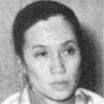
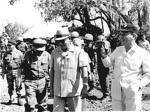
On Apr. 8, 1969 (noon) Univ. Hall at Harvard U. (main admin. bldg.) is seized by 300 students, mainly SDS members, causing Harvard U. pres. (since 1953) Nathan Marsh Pusey (1907-2001) to call the pigs on Apr. 9, who club the pussies, er, students, arresting 184 and injuring 45; the backlash causes Pusey to retire early in 1971 - I didn't want to seem a pusey? On May 3-4 the Battle of Ben Het in the Central Highlands of South Vietnam is the first time since the Korean War that U.S. troops engage Commie tanks. On May 8 North Vietnamese foreign minister Mme. Nguyen Thi Binh (1920-) announces a 10-Point Peace Program in Paris, actually a non-peace program calling for unification of Vietnam under Communist rule - get all 10 of your toes out of our country, Yankees? On May 10-20 the Battle of Hamburger Hill (Hill 937) (Dong Ap Bia) (Ap Bia Mountain) in the Ashau Valley becomes the last big U.S. ground combat operation in the Vietnam War; U.S. and South Vietnamese troops finally capture it after 675 of 1.5K North Vietnamese and 72 of 1.8K U.S. soldiers are KIA, and 372 U.S. soldiers ground, er, wounded; only three North Vietnamese soldiers are captured alive - ground round? On May 20 U.S. Nat. Guard helis spray stinging powder on anti-Vietnam War protesters in Calif. On May 22 about 100 SDS members who had taken over two bldgs. at Columbia U. in New York City flee after arrest warrants are issued for them. In May former PM (1964-5) Tran Van Huong becomes PM of South Vietnam again; on Aug. 22 he resigns under pressure from Pres. Thieu, and on Aug. 23 is replaced by Deputy PM Gen. Tran Thien Khiem (1925-) (until 1975).
On June 2, 1969 Australian aircraft carrier Melbourne slices the destroyer USS Frank E. Evans in half off the shore of South Vietnam in the South China Sea, killing 74 U.S. crew members. On June 8 Pres. Nixon meets with Pres. Thieu of South Vietnam in Midway, and announces that 25K U.S. troops will pull out by the end of Aug. as the new "Vietnamization" policy (take care of it yourself or drop dead) kicks in.


On June 18-22, 1969 after reaching a membership of 100K, the Nat. Convention of the Students for a Dem. Society (SDS) in Chicago, Ill. collapses, and the Weatherman faction seizes control of the SDS nat. office, changing their name to Weather Underground Org. (WUO), from the Bob Dylan song Subterranean Homesick Blues ("You don't need a weatherman to know which way the wind blows"), going on to bomb eight govt. and corp. office bldgs. in New York City this year to protest the Vietnam War., incl. Grace Pear on July 27, Marine Midland Bldg. on Aug. 20 (19 inuries), Federal Place Office Bldg. (Sept. 19), Army Induction Center on Whitehall St. (Oct. 7), Standard Oil offices in the RCA Bldg. (Nov. 11), Chase Manhattan Bank (Nov. 11), Gen. Motors Bldg. (Nov. 11), New York City Criminal Courts Bldg. (Nov. 12); on Nov. 12 leader Samuel Joseph "Sam" Melville (Grossman) (1934-71), his Swarthmore College-educated babe (who never joined the Weather Underground?) Jane Lauren Alpert (1947-), and two others (George Demmerle, Dave Hughley) are arrested; Melville dies in the 1971 Attica Prison riots, and Alpert skips bail in May 1970, turning herself in on Nov. 17, 1974 and receiving 27 mo. in prison after deciding to become a feminist instead, uttering the soundbyte "For now, I only want to set the scene of my renewed acquaintance with the Weather Underground by saying that when it occurred, I was decisively through with the left and had, at least mentally, rededicated myself to the cause of a revolution made by and for women." On June 25 the U.S. Senate votes 70-16 to pass the Nat. Commitments Resolution, asking the executive branch of the govt. not to commit men or funds to a foreign country without the express approval of both houses of Congress - they can ask? On July 2 fence-sitting Cambodia resumes diplomatic relations with the U.S. (severed in 1965). On July 8 the first U.S. troops to withdraw from Vietnam leave Saigon as 814 infantrymen are flown to Tacoma, Wash. On July 25 U.S. Pres. Richard Nixon declares the Nixon Doctrine, named by the press after he makes a casual statement during a stopover in Guam on a return trip from Vietnam; in the future the U.S. will expect Asian allies to assume responsibility for their own defense, "except for the threat of a major power involving nuclear weapons". On July 30 U.S. Pres. Richard Nixon makes an unscheduled visit to South Vietnam, and meets with Pres. Nguyen Van Thieu and U.S. military cmdrs. to explain his slip, er, new Nixon Doctrine - learn to resist temptation, someday you'll wake up and I'll be far away?



On Aug. 4, 1969 German-born Jewish-Am. nat. security adviser Henry Kissinger (1923-) of the U.S. and none-of-the-above Xuan Thuy (1912-85) of North Vietnam begin secret peace negotiations in the Paris apt. of French intermediary Jean Sainteny (Roger) (1907-78), but they fail to agree on any terms. On Aug. 6 the Green Beret Affair sees the U.S. Army announce the arrest of eight Green Berets, incl. the cmdr. of the Fifth Special Forces Group (Airbone) on suspicion of premeditated murder of a Vietnamese double agent. On Aug. 12 U.S. installations at Quan Loi in Vietnam come under Viet Cong attack. On Aug. 13 Gen. Lon Nol is unanimously elected PM of Cambodia, replacing the ailing Penn Nouth.

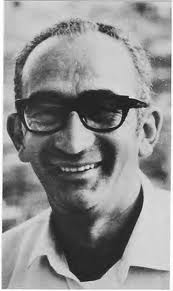
On Aug. 15-18, 1969 the Rock and Roll Decade ends appropriately with the Woodstock Music and Art Fair, which is held on the muddy 600-acre farm of dairy farmer Max B. Yasgur (1919-73) (who dies of a heart attack in Fla. in 1973) in the Catskill Mts. near Bethel in upstate New York; "What we have in mind is breakfast in bed for four hundred thousand"; 300K-500K drugged-and-sexed-out mainly Baby Boomer gen. people (biggest live entertainment audience in history?) endure 20-mi. traffic jams and cruddy weather to hear rock acts, take drugs, and go naked.





On Sept. 1, 1969 the last U.S. troops leave the Mekong Delta, leaving the South Vietnamese army to fu, er, fend for itself. On Sept. 3 Ho Chi Minh (b. 1890) dies in Hanoi from a heart attack after 15 years as North Vietnamese pres., and on Sept. 24 nat. assembly vice-pres. Ton Duc Thang (1888-1980) succeeds him as pres. #2 (last) of the Dem. Repub. of Vietnam (until July 2, 1976); Indochina Communist Party founding member (1930) Le Duan (1907-86) (#2 behind Ho since 1958 and driving force behind the Vietnam War), gen. secy. of the Vietnam Communist Party since Sept. 10, 1960 forms a triumvirate with Truong Chinh (1907-88) (Chin. "long march") and PM (1955-87) Pham Van Dong (1906-2000); Alexei Kosygin meets at Beijing (Peking) Airport with Zhou Enlai (Chou En-lai) en route home from Ho Chi Minh's funeral in Hanoi, and they discuss Sino-Soviet border clashes earlier in the year in E and C Asia.
On Sept. 5, 1969 Lt. William Calley is charged with six counts of premeditated murder for the deaths of 109 Vietnamese civilians in My Lai. On Sept. 12 Pres. Nixon orders a resumption of bombing in North Vietnam; duh, while the B-52 were not being used there, they carpet-bombed the pesky tunnels in the Iron Triangle, causing some to cave in, and if they had kept it up, they might have turned the tide? On Sept. 16 Pres. Nixon announces the withdrawal of 35K more U.S. troops from South Vietnam by Dec., and signs a bill increasing the salaries of the vice-pres., speaker of the House, and other congressional leaders - sounds like a lost puppy story?

On Sept. 23, 1969 (Tues.) the ABC Movie of the Week debuts on ABC-TV, helping it achieve parity with CBS and NBC in audience ratings with 90-min. made-for-TV films venturing into cool areas avoided by Hollywood such as drugs, homosexuality, and the Vietnam War, launching the meteoric rise of Jewish-Am. studio exec Barry Diller (1942-), who becomes chmn. of Paramount Pictures in 1974.

On Oct. 8, 1969 Norodom Sihanouk permits 40K North Vietnamese forces to invade Cambodia and advance into the center of the country - so much for neutrality? On Oct. 12 Pres. Nixon utters the soundbyte: "I will say confidently that looking ahead just three years the war will be over... on a lasting basis that will promote lasting peace in the Pacific." On Oct. 15 the first Vietnam Moratorium Day, organized by the New Mobilization Committee to End the War draws 750K protesters in Washington, D.C., becoming the largest protest in U.S. history to date, demanding that troops be brought back immediately but forming no consensus as to the best or fastest means of achieving peace.

On Nov. 3, 1969 Pres. Nixon gives his Silent Majority Speech on nat. TV, written by his speechwriter Patrick Joseph "Pat" Buchanan (1938-), announcing his Vietnamization Program to shift the fighting from U.S. to South Vietnamese troops, and asking the "great silent majority of my fellow Americans" to join him in solidarity with the Vietnam War effort and to support his policies, causing millions of Dems. to end up supporting him; he delivers the speech from his Wilson Desk at the White House, claiming it was used by Pres. Woodrow Wilson (1856-1924), when actually it was only used by Pres. Grant's vice-pres. Henry Wilson; meanwhile on Oct. 19 vice-pres. Spiro Agnew, scripted by Buchanan begins a campaign against liberal bias in the media in New Orleans, La., uttering the soundbyte: "A spirit of national masochism prevails, encouraged by an effete core of impudent snobs who characterize themselves as intellectuals"; on Nov. 13 he delivers his No More Than a Dozen Anchormen speech, with the soundbyte: "Now how is this network news determined? A small group of men, numbering perhaps no more than a dozen anchormen, commentators, and executive producers, settle upon the 20 minutes or so of film and commentary that's to reach the public... from the 90 to 180 minutes that may be available... They decide what 40 to 50 million Americans will learn of the day's events in the nation and in the world... read the same newspapers... draw their political and social views from the same sources... talk constantly to one another, thereby providing artificial reinforcement to their shared viewpoint".
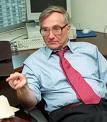


On Nov. 12, 1969 Jewish-Am. investigative journalist Seymour Myron "My" Hersh (1937-) breaks the 1968 My Lai Massacre story, and on Nov. 20 explicit photos of the corpses are pub. in the Cleveland Plain Dealer, and the U.S. Army admits to it - let me finish before you begin booing? On Nov. 14 the Second Vietnam Moratorium Day sees 250K in Washington, D.C. and 100K in San Francisco stage a "March Against Death", causing police to surround the White House with D.C. Transit buses parked bumper-to-bumper, while Pres. Nixon watches a football game on TV inside; police use tear gas to disperse demonstrators gathered in front of the U.S. Justice Dept., and the anti-Vietnam War left charges the FBI and the CIA with spying on them and breaking into their offices. On Nov. 19 Congress amends the U.S. Selective Service Act of 1967 to permit the pres. to use a "random selection" for the draft based on birthday, and on Dec. 1 the U.S. govt. holds its First Draft Lottery since World War II (1942), setting the order of selection for military service in 1970; 19-y.-o. males are now eligible, along with those with expired college deferments; all numbers lower than 196 are later called to report; too bad, on Jan. 4, 1970 the New York Times pub. the article Statisticians Charge Draft Lottery Was Not Random, exposing a flaw that causes men born in the later months of the year to be more likely to be drafted - duh, TLW was born in January, leave it alone? On Nov. 20 the Cleveland Plain Dealer pub. explicit photos of Dead Villagers from the My Lai Massacre in Vietnam. On Nov. 20 Henry Cabot Lodge Jr. and his chief deputy Lawrence E. Walsh resign as U.S. delegates to the Paris peace talks, effective Dec. 8; Philip Charles Habib (1920-92) (born in Brooklyn, N.Y. of Lebanese Marionite Christian parents) replaces Lodge. On Nov. 25 John Lennon returns his OBE (Order of the British Empire) to protest British govt. support of the U.S. Vietnam War.

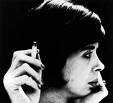
In early Dec. 1969 a recession begins in the U.S as the war no longer invigorates the economy and German and other imports affect major industries. The U.S. Army really knows how to get you judged by your peers? On Dec. 2 the U.S. Army Board of Inquiry, headed by Lt. Gen. William R. Peers (1914-84) begins closed hearings in Washington, D.C. on the Mar. 16, 1968 My Lai (Song My) Massacre, and ends up charging 14 with crimes, incl. Capt. Ernest Medina and Lt. William Calley, after which all but Calley are acquitted, who ends up with 10 years. On Dec. 13 Pres. Nixon announces that 50K U.S. troops will be pulled out of Vietnam by next Apr. 15, becoming his 3rd troop cut. On Dec. 14 Laotian PM Souvanna Phouma admits the presence in N Laos of 4-5 battalions of Chinese Communists hooking up with North Vietnamese forces; Phouma's troops with U.S. air support eventually drive them back from the Plaine des Jarres. On Dec. 16 Pres. Nixon endorses a Senate amendment to a military appropriations bill prohibiting the use of combat troops in Thailand and Laos. On Dec. 21 U.S. draft evaders gather for a holiday dinner in Montreal, Canada - did they serve chicken? In Dec. Am. New York Times reporter Gloria Emerson (1929-2004) interviews John Lennon and Oko Yono, er, Yoko Ono at their Apple Records HQ in London, and disputes the effectiveness of their anti-Vietnam War campaign despite the personal and prof. cost to them, pissing Lennon off, and later being used as an example of establishment resistance to their peace movement, although Emerson is anti-establishment and claims the Beatles "could have stopped the war" by performing for U.S. troops in Vietnam. "Leave It To Beaver" star Jerry Mathers (1948-) is reported dead in Vietnam by AP and UPI, only to turn out to be somebody else with the same name.
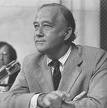


On Jan. 19, 1970 U.S. vice-pres. Spiro Agnew concludes his 21-day Asian Tour of 11 Pacific and Asian countries. On Feb. 10-13 U.S. defense secy. Melvin R. Laird visits South Vietnam to discuss U.S. troop withdrawals with cmdrs.; at this point the South Vietnamese are winning the war with U.S. air support as the North Vietnamese become exhausted - scram light, and leave the hardware behind? The Laotian War gets out of hand? On Feb. 12 the North Vietnamese launch a major offense in NE Laos, driving the Laotians back from the Plaine des Jarres despite heavy U.S. air bombardment, and on Feb. 21 they capture their last military stronghold there; on Feb. 13 South Vietnamese troops invade S Laos, only to be driven back within six weeks with heavy casualties; by the end of the year 70K North Vietnamese troops occupy Laos, creating nearly 1M refugees, esp. from the highlands; despite congressional prohibition against the use of U.S. ground forces in Laos, on Feb. 25 liberal U.S. Sen. (R-Md.) (1969-87) Charles McCurdy "Mac" Mathias Jr. (1922-) r eports that the CIA has hired hundreds of ex-Green Berets to fight there; only a few hundred students protest the U.S. invasion, causing the Nixon. admin. to believe that its strategy for pacifying the home front is working; on Mar. 11 U.S. Sen. (D-Ark.) (1945-75) James William Fulbright (1905-95) utters the soundbyte: "The Senate must not remain silent now while the president uses the armed forces of the United States to fight an undeclared and undisclosed war in Laos." On Feb. 21 secret peace talks are held between U.S. nat. security advisor Henry Alfred Kissinger (1923-) and North Vietnamese diplomat Gen. Howard the Duck, er, Le Duc Tho (1911-90). On Feb. 26 five U.S. Marines are arrested on charges of murdering 11 South Vietnamese women and five children in Da Nang on Feb. 19.


On Mar. 13, 1970 Cambodia officially requests North Vietnamese and Viet Cong troops (invited in 1969) to get out, but they prefer to polish their nails, causing conferences and peaceful protests to be held; on Mar. 18 Cambodian king ("head of state") (since 1960) Norodom Sihanouk (1922-2012) is deposed and ousted while visiting Beijing, and right-wing PM (since 1969) Gen. Lon Nol (1913-85) takes over as PM (until 1975), attempting to drive the 400K North Vietnamese Communist troops out of Cambodia, and inviting U.S. and South Vietnamese forces to enter. On Mar. 17 the U.S. Army charges 14 officers with suppression of facts in the My Lai Massacre case. On Mar. 31 U.S. forces in Vietnam down a MiG-21, the first since Sept. 1968 - God bless America? In Mar. the Nat. Mobilization Committee to End the War in Vietnam organizes a trip to Hanoi to meet with the PM of North Vietnam, where Doug Down and Noam Chomsky are indirectly informed that the U.S. has invaded Cambodia. By spring there have been 174 bombings on U.S. college campuses since last fall.


On Apr. 1, 1970 the U.S. Army charges Capt. Ernest Medina (1936-) in connection with the My Lai Massacre; he is acquitted next Sept. 22. On Apr. 4 thousands of demonstrators stage a pro-war rally in Washington, D.C. - yep, the 60s are over? On Apr. 10 the music dies for millions of Beatlemanics as the Beatles officially break up, ending an era; all four go on to separate musical careers; on Apr. 17 Paul Mcartney's debut solo album McCartney is released in Britain, and he forms the group Wings with his wife Linda and Denny Laine in 1971 (until Apr. 1981); on Nov. 23 George Harrison's My Sweet Lord becomes the first #1 single by an ex-Beatle, and on Aug. 1, 1971 he stages the Concert for Bangladesh at Madison Square Garden in New York City; John Lennon (while undergoing primal therapy with Dr. Arthur Janov?) poses with Yoko in front of a poster showing a U.S. flag with the stars replaced by skulls and crossbones, and the stripes replaced by a political message: "U.S.A. surpasses all the genocide records", noting that Kublai Khan massacred 15% of the pop. of the Near East, Spain 15% of the Am. Indians, Stalin 5% of the Russians, the Nazis 5% of occupied Europeans and 75% of European Jews, and the U.S. wins with 6.5% of South Vietnamese and 75% of Am. Indians. On Apr. 23 Pres. Nixon ends draft deferments for fathers and special occupations. On Apr. 27 the North Vietnamese govt. proclaims support for ousted prince Norodom Sihanouk, and Communist forces advance toward Phnom Penh; on Apr. 29 a large South Vietnamese force invades Cambodia with U.S. aerial support; on May 5 Sihanouk forms a govt. in exile in Beijing; on Apr. 30 Pres. Nixon announces that the U.S. is sending 32K U.S. and 48K South Vietnamese troops into Cambodia to clear their "headquarters" and "sanctuaries" near the South Vietnamese border to save U.S. lives and help his Vietnamization plan, with the soundbyte: "If, when the chips are down, the world's most powerful nation, the United States of America, acts like a pitiful, helpless giant, the forces of totalitarianism and anarchy will threaten free nations and free institutions throughout the world", adding "It is not our power but our will and character that is being tested tonight. The question all Americans must ask and answer tonight is this: Does the richest and strongest nation in the history of the world have the character to meet a direct challenge by a group which rejects every effort to win a just peace?"; the announcement sparks massive campus protests, which finally penetrate the more conservative and Roman Catholic campuses; the troops capture supplies and stop Cambodian seaports from supplying the Vietnamese Communists, causing the latter to rely more heavily on the portions of the Ho Chi Minh Trail in Laos; vice-pres. Spiro Agnew calls the invasion "the finest hour in the Nixon presidency", but defense secy. Melvin R. Laird and secy. of state William Rogers are opposed to it; on May 1 Nixon calls campus radicals who oppose his policies "bums"; the truth doesn't come out until 2005, when relevant documents are declassified; meanwhile the Khmer Rouge of Red Queen Pol Pot grows from 2K to 70K members. In Apr. the Pentagon stops the use of Agent Orange (dioxin). In Apr. Free the Army (FTA) is founded by actors Jane Fonda and Donald Sutherland, and mgr. Fred Gardner to stage countershows to the USO shows of Bob Hope. In Apr. the Dump Nixon Movement is launched by liberal ex-rep. (D-N.Y.) (1969-71) Allard Kenneth Lowenstein (1929-80).
On May 1, 1970 the Days of Rage, a week of widespread protests against the U.S. invasion of Cambodia begin in Seattle, Wash., and spread nationwide to 441 colleges and univs., eventually causing the closure of 75 U.S. colleges for the rest of the term; meanwhile deputy White House counsel Tom Huston proposes the Huston Plan to engage in wiretapping, burglary, and other illegal activities to spy on anti-war groups, and Pres. Nixon approves it, but flops five days later after FBI dir. Hoover opposes it; his approval is later used as an article of impeachment by Congress?

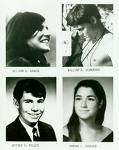


Four dead in O-Hi-O brings Pres. Nixon down from his high horse? On May 4, 1970 (Mon.) (noon) 1K students stage a Days of Rage protest at Kent State U., and after throwing rocks, four students are killed and nine wounded by Ohio Nat. Guardsmen firing M-1 rifles (67 shots in 13 sec.), sparking outrage and disorder, escalating the existing rage and causing many U.S. campuses to be closed; the Kent State Martyrs incl. Allison Krause (b. 1951), Jeffrey Glenn "Jeff" Miller (b. 1950), Sandra Lee Scheuer (b. 1949) (pr. like Shawyer), and William Knox Schroeder (b. 1950); a photo by student John Paul Filo of the Valley Daily News showing 14-y.-o. Mary Ann Vecchio (1956-) kneeling beside dead Miller stirs worldwide indignation; on May 4 Robert Curtis "Bob" Lewis (1947-) graduates from Kent State U. with its first anthropology degree, then develops the theory of De-Evolution and in 1973 co-founds the New Wave group Devo; in May U.S. interior secy. (since 1969) Walter Joseph "Wally" Hickel (1919-) writes a Letter to Pres. Nixon critical of his Vietnam War policy and his views on students, as well as the views of vice-pres. Spiro Agnew, getting him fired on Nov. 25. On May 8 the Hard Hat Riot sees construction worker rednecks break up a Days of Rage protest on New York City's Wall St. and force City Hall officials to raise the U.S. flag back to full staff after they had lowered it to half staff in memory of the Kent State Martyrs, making a statement that it's not just hippies vs. the govt. anymore? - trust the Gorton's fisherman? On May 9 a Days of Rage Student Protest in Washington, D.C. brings 75K-100K peaceful protesters pissed-off at the Kent State Massacre; that night, after having trouble sleeping, Pres. Nixon drives to the Lincoln Memorial at 4:15 a.m. and talks with amazed student protesters for an hour, becoming known as the Nixon Pre-Dawn Visit, uttering the parting soundbyte: "I know you want to get the war over. Sure you came here to demonstrate and shout your slogans on the ellipse. That's all right. Just keep it peaceful. Have a good time in Washington, and don't go away bitter." On May 9 after making progress in Laos, the 70K-man North Vietnamese army approaches Luang Prahang. On May 13 the Beatles movie Let it Be (dir. by Michael Lindsay-Hogg) debuts with an eerie timing? On May 14-15 after a Days of Rage protest turns into a riot, police open fire on a dormitory at Jackson State College in Miss., killing black students Phillip Lafayette Gibbs (b. 1948) and James Earl Green (b. 1952), and wounding 15. On May 20 100K stage a Pro-Vietnam War Demonstration in New York's Wall Street district. On May 22 Pres. Nixon's hatchet man Vice-Pres. Spiro Theodore "Ted" Agnew (1918-96) gives a speech in Houston, Tex., with the soundbyte: "The young... at the zenith of physical power and sensitivity, overwhelm themselves with drugs and artificial stimulants... Education is being redfined at the demand of the uneducated to suit the ideas of the uneducated. The student now goes to college to proclaim, rather than to learn. The lessons of the past are ignored and obliterated in a contemporary antagonism known as the generation gap. A spirit of national masochism prevails, encouraged by an effete corps of impudent snobs who characterize themselves as intellectuals"; on Sept. 11 he tells an audience at the Repub. State Convention in San Diego, Calif.: "We have more than our share of the nattering nabobs of negativism"; both of the clever characterizations of the press corps were written for him by etymology-loving speechwriter William Lewis Safire (1929-2009), who goes on to add alliterative phrases like "pusillanimous pussyfooting" and "hopeless hysterical hypochrondriacs of history" along with fellow speechwriter Pat Buchanan. On May 26 (Tue.) the NYSE records its biggest 1-day decline since the assassination of JFK, ending an 8-year world bear market; the Dow Jones Industrial Avg. of 30 blue chips drops 20.81 points to 631; on May 27 (Wed.) the Dow jumps from 631 to 663.20 (32.04 points), becoming the largest 1-day increase so far; volume is 11.6M shares, vs. 3M in 1960 and 2.6M in 1955, causing brokerage houses to attempt to automate their back rooms. On May 28 Buddhists and students demonstrate in Saigon against the war and govt. repression. On May 30 Pres. Nixon secretly meets his top military and nat. security aides at the Western White House in San Clemente, Calif., telling them to keep some 14K troops hunting down North Vietnamese in Cambodia, but to lie to the public that it's "all but over", and that they are merely providing support to South Vietnamese forces as necessary to protect U.S. troops; he also tells them to plan an offensive in officially neutral (but anything but) Laos, and work on a summer offensive in South Vietnam, saying, "Publicly we say one thing; actually, we do another"; Naval Ops. Chief Adm. Thomas H. Morrer comments that "If the enemy is allowed to recover this time, we are through"; 2 mo. later he becomes chmn. of the Joint Chiefs.

On June 5, 1970 the U.S. unemployment rate is announced as 5% (highest since 1965), caused by the winding down of the Vietnam War. On June 7 the U.S. TV industry strikes back at vice-pres. Spiro Agnew and his attack on slanted journalism by presenting a special Emmy award to three network news chiefs "for their leadership... against forces which strike at journalism's duty to preserve the free flow of information". On June 13 the Warren, er, President's Commission on Campus Unrest is appointed, with former Penn. Repub. gov. (1963-7) William Warren Scranton (1917-) as chmn., holding its first meeting on June 25, followed by 13 days of hearings at Jackson State in Miss., Kent State in Ohio et al.; no arrests of sacred cow pigs are ever made. On June 15 in Welsh v. U.S. the U.S. Supreme Court broadens the definition of conscientious objector to incl. people without belief in God who profess ethical or moral convictions against war - there were atheists in foxholes before? On June 17 North Vietnamese troops cut the last operating rail line in Cambodia. On June 24 the U.S. Senate votes overwhelmingly to repeal the Aug. 7, 1964 Gulf of Tonkin Resolution, on which U.S. govt. involvement in the Vietnam War was largely based; the House follows suit next Jan. 13.
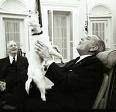
On July 1, 1970 Pres. Nixon names aristocratic Va.-raised ambassador David Kirkpatrick Este Bruce (1898-1977) as head of the U.S. peace delegation in Paris. On July 1 the U.S. Selective Service System in Washington, D.C. holds its first lottery drawing since Nov. 1969. On July 4 thousands attend Honor America Day in Washington, D.C., backed by Pres. Nixon. In July the 57-mo. Japanese Izangi Boom (begun Oct. 1965) (longest expansion since WWII) ends as U.S. orders for the Vietnam War begin waning.
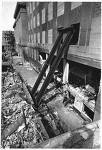


On Aug. 24, 1970 (3:42 a.m.) a bomb consisting of over a ton of ammonium nitrate fertilizer and fuel oil (most powerful car bomb in history until the 1993 Marine Barracks bomb in Lebanon) inside a stolen 1967 Ford Deluxe Club Wagon explodes outside Sterling Hall at U. of Wisc. in Madison, housing the U.S. Army Mathematical Research Center at the U. of Wisc. in Madison, damaging 26 bldgs., killing 33-y.-o. researcher Robert E. Fassnacht (b. 1937), injuring four, and destroying a $1.5M computer; the violent Weathermen faction of the SDS claims responsibility, but actually it's four campus radicals called the New Year's Gang, incl. Karleton Armstrong (1953-), Dwight Armstrong (1952-), David Fine (1952-), and Leo Burt (1948-); on Feb. 17, 1972 leader Karleton "Karl" Armstrong (1953-) is arrested, and pleads guilty to 2nd degree murder; Am. activist-writer Richard Anderson Falk (1930-) writes a letter to the New York Times citing the Nuremberg Trials as a precedent that private citizens have "a right, and perhaps a duty" to actively oppose war by any means incl. "by creating a lesser crime"; Burt is not caught (until ?). On Aug. 29 30K march in East Los Angeles for the Chicano Moratorium, a coalition of Mexican-Am. groups who oppose the Vietnam War. On Sept. 9 U.S. Marines launch Operation Dubois Square, a 10-day search for North Vietnamese troops near Da Nang. On Sept. 26 the President's Commission on Campus Unrest (Scranton Commission) investigating the Kent State killings finds that "The indiscriminate firing of rifles into a crowd of students and the deaths that followed were unnecessary, unwarranted, and inexcusable"; too bad, a tape emerges, on which some claim they hear a Guard officer issue the command "Right here - get set - point - fire!" - he really said, "Write here, get some fire-red poinsettias?
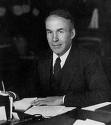



On Oct. 3, 1970 Hampshire College in Amherst, Mass. opens; Am. poet Archibald MacLeish (1892-1982) gives the inaugural address, with the soundbyte: "The only confident educational pronouncements of this troubled time have issued, not from the colleges or universities, but from Mr. Spiro Agnew. And all Mr. Spiro Agnew has had to tell us is that the whole thing is the doing of wicked boys and girls egged on by 'the disgusting and permissive attitude of the people in command of the campuses', by which Mr. Agnew means that the troubles would go away if only the troublemakers were eradicated." On Oct. 7 Pres. Nixon gives a televised speech proposing a ceasefire-in-place. On Oct. 9 the anti-Communist pro-U.S. Khmer Repub. of Cambodia declares independence; Son Ngoc Thanh (1908-77), cmdr. of the Khmer Serei guerrillas becomes PM, but is sacked on Oct. 15 Oct. 1972 by Gen. Lon Nol, who begins to rule with an iron hand in an attempt to stop the emerging Communist Khmer Rouge, which is trained and equipped by North Vietnam. On Oct. 12 Pres. Nixon announces the pullout of 40K more U.S. troops from Vietnam by Christmas. On Oct. 26 Doonesbury, by New York City-born cartoonist Garretson Beekman "Garry" Trudeau (1948-), about Michael J. Doonesbury (who comments on U.S. military involvement in Vietnam) begins pub. (until ?), starting in the Yale Daily News under the title "Bull Tales", then spreading to 25 newspapers through the new Universal Press Syndicate (UPS), founded by John McMeel and Jim Andrews, ultimately reaching over 300, and later becoming the first comic strip to win the Pulitzer Prize (1975).

On Nov. 3, 1970 Pres. Nixon promises gradual troop removal from Vietnam. On Nov. 11 U.S. Army Special Forces raid the Son Tay Prison Camp in North Vietnam but find no POWs - a security leak? On Nov. 21 U.S. planes stage widespread bombing raids in North Vietnam - turn on the Wagner, boys? Welcome to Last Comic Standing? The once almighty Roman Catholic Church is reduced to soundbyte artists? In Nov. anti-war anti-desegregation human rights activist (dean of Boston College Law School since 1956) Rev. Robert Frederick Drinan (1920-2007) (a Jesuit who just returned from a trip to Vietnam where he claims to have discovered that the number of political prisoners being held in South Vietnam is rapidly increasing) becomes the first Roman Catholic priest elected to serve as a voting member of the U.S. Congress, over the objections of his superiors, after defeating longtime Dem. Rep. Philip J. Philbin in a primary; after urging the Church to condemn the Vietnam War as "morally objectionable" and becoming the first member of Congress to call for Nixon's impeachment (for the undeclared war against Cambodia) he steps down in 1980 after Pope John Paul II issues a worldwide directive barring priests from holding public office; he later testifies against Clinton's impeachment, saying that it should be for an official not private blow, er, act; the only other Roman Catholic priest to serve in Congress is Robert John Cornell (1919-) of the White Canon Norbertine Order, who is elected to two House Terms in Wisc. and serves from Jan. 1975-Jan. 1979. On Dec. 24 nine GIs are killed and nine wounded by friendly fire in Vietnam - SNAFU? In Dec. a poll shows that 84% of Americans favor some kind of plan to withdraw U.S. troops from Vietnam, and 38% are willing to do it slowly or wait until the South Vietnamese are ready to take over, but almost 50% want it done immediately or at most within 18 mo.; meanwhile Pres. Nixon says that a quick withdrawal "would be a disaster not only for South Vietnam but for the United States and for the cause of peace", and would be the "first defeat in our nation's history and would result in a collapse of confidence in American leadership... throughout the world", wanting it to end "with honor"; privately he blames them *!?!? liberals, saying "They hate us, the country, themselves, their wives, everything they do - these liberals", and tells Henry Kissinger "They are a lost generation. They have no reason to live anymore" - soon he'll be saying that about himself?

U.S. troops in Vietnam by end 1971: 200K (vs. a peak of 534K in mid-1969); Henry Kissinger talks Pres. Nixon out of withdrawing all of them because it might cost him reelection next year. On Jan. 1, 1971 a 3-day New Year's ceasefire marked by sporadic fighting ends in Vietnam. On Jan. 13 after efforts by liberal Repub. Md. Sen. (1969-87) Charles McCurdy "Mac" Mathias Jr. (1922-2010), Congress repeals the Aug. 7, 1964 Gulf of Tonkin Resolution, ending the president's unlimited war powers along with the de facto declaration of war on North Vietnam, with a House vote of 414-0 and a Senate vote of 88-2; by the end of the year 6.2M tons of bombs have been dropped on lovely Vietnam by U.S. aircraft, 3x the amount dropped in all of WWII. On Jan. 22 Communist troops shell Phnom Penh, Cambodia for the 1st time. On Jan. 22 Pres. Nixon delivers his 1971 State of the Union Address, with the soundbyte: "In these troubled years just past, America has been going through a long nightmare of war and division, of crime and inflation. Even more deeply, we have gone through a long, dark night of the American spirit. But now that night is ending. Now we must let our spirits soar again. Now we are ready for the lift of a driving dream. The people of this nation are eager to get on with the quest for new greatness. They see challenges, and they are prepared to meet those challenges. It is for us here to open the doors that will set free again the real greatness of this nation, the genius of the American people." On Jan. 31-Feb. 2 the Vietnam Veterans Against the War (VVAW) (founded 1967) hold their Winter Soldier Investigation in a Howard Johnson motel in Detroit, Mich., with vets and civilians testifying about Vietnam War atrocities; U.S. Sen. (R-Ore.) Mark Hatfield enters the testimony into the Congressional Record, and causes a Senate Committee on Foreign Relations hearing in Washington, D.C. on Apr. 22 where VVAW leader, Yale grad., and decorated Vietnam vet John Kerry (1943-) (who on Jan. 6, 2009 becomes chmn. of the committee as Dem. Sen. from Mass. since 1985) alienates many Vietnam vets with his insistence that atrocities are commonplace, calling the Vietnam War "the biggest nothing in history", with the immortal soundbyte: "How do you ask a man to be the last man to die for a mistake?" - did he mention he had lost his glasses?

On Feb. 8, 1971 South Vietnamese ground forces commanded by Gen. Hoang Xuan Lam (19282017-), backed by U.S. air power begin Operation Lam Son 719, a 17K man incursion into Laos, amid internat. debate; too bad, it ends on Mar. 25 in a disaster, with the ARVN losing half its forces, turning from a graduation exercise in taking charge of the war to proof they're not ready; somehow Lam keeps his job; too bad, Pres. Nixon lies to the Am. people, claiming the ARVN is now ready. March becomes the Month of the U.S. College Student as they score epic Vs against their own all-powerful government, cutting it down to size, starting with getting them where they live? On Mar. 1 (1:32 a.m.) the 1971 U.S. Senate Bombing sees a ground floor restroom in the Senate wing of the U.S. Capitol bldg. bombed in protest of U.S. involvement in Laos, causing $300K in damage after a 30-min. telephone warning; the Weather Underground claims responsibility; Capitol police begin searching all visitors - which Lethal Weapon episode was that? On Mar. 7 approx. 1K U.S. planes bomb Cambodia and Laos. On Mar. 8 the U.S. Supreme Court rules 8-1 in Gillette v. U.S. that conscientious objectors must show that they are opposed to all wars not just the Vietnam War to get draft exemption. The U.S. govt. gets another lesson that the media is a powerful sword with two edges, that cuts both ways? On Mar. 8 anon. activists in Media, Penn. break into the local FBI office and steal 1K documents that reveal the agency's illegal spying, infiltration, and media manipulation activities against radical groups, then send them anonymously to the er, media, causing the Washington Post to break the story on Mar. 24 despite a power play by U.S. atty. gen. John Mitchell; despite compiling a 33K-page file, the FBI doesn't figure out who broke in (until ?). On Mar. 14 Sen. Edward Kennedy estimates that 25K Vietnamese civilians were killed in 1970. On Mar. 15 (00:45 hours) an enlisted man frags the officers barracks, killing white lts. Richard Harlan and Thomas Dellwo, and wounding a 3rd in the U.S. army base in Bien Hoa, Vietnam, after which black Pvt. Billy Dean Smith (1948-) (from Watts, and known for hating the army and the war) is court-martialed for it, and held in a cage for over a year before being found innocent, with Pres. Nixon refusing to intervene like he did for white Lt. Calley; 96 fragging cases were reported in 1969, and 209 in 1970, killing 101 total. On Mar. 21 two U.S. platoons in Vietnam refuse orders to advance. On Mar. 29 Army 1st Lt. William L. Calley Jr. is convicted of murdering at least 22 Vietnamese civilians in the My Lai Massacre, and on Mar. 31 is sentenced to life in prison at hard labor, after which on Apr. 6 Pres. Nixon frees him to appeal, after which he ends up spending three years under house arrest - learning how to eat with chopsticks and like rice noodles?



A legitimate concern for the leaking of U.S. defense secrets causes Tricky Nixon to go too far and authorize crimes, leading to his downfall when the same press he has pissed-off goes in for the kill? In Mar. 1971 U.S. Defense Dept. employee Daniel Ellsberg (1931-) obtains a copy of the Pentagon Papers (United States - Vietnam Relations, 1946-1967: A Study Prepared by the Department of Defense) AKA "History of the United States Decision-Making Process on Vietnam Policy", a secret 3K-page 47-vol. official history of the Vietnam War commissioned in 1967 by U.S. defense secy. Robert McNamara from his former Pentagon colleagues, and gives it to New York Times reporter Cornelius Mahoney "Neil" Sheehan (1936-), who writes a series on the secret history of the Vietnam War from it, incl. how U.S. officials have been lying to the public, telling them thaty were trying to help South Vietnam but actually working to contain Red China, winning him a Pulitzer Prize; meanwhile the NYT begins pub. excerpts on June 13 giving a history of U.S. involvement Vietnam from the end of WWII to 1968, pissing-off U.S. atty.-gen. John Mitchell, who asks them to stop, saying that the info. in it will cause "irreparable injury to the defense interests of the United States"; after they tell him to buzz off, a federal judge issues the first-ever prior restraint order on the press, causing a legal battle to the U.S. Supreme Court; meanwhile on June 16 the Washington Post gets a copy, and begins pub. excerpts on June 18, causing the Nixon admin. to come down on them too; on June 26 the U.S. Justice Dept. issues a warrant for Daniel Ellsberg, and he surrenders in Boston, Mass., admitting his heroic deeds, getting indicted on Dec. 29 along with co-worker Anthony J. "Tony" Russo Jr. (1936-2008) for espionage and conspiracy; meanwhile on June 30 the U.S. Supreme Court rules 6-3 against the govt., allowing the pub. of the Pentagon Papers to proceed, pissing-off Pres. Nixon, who the same day tells his chief of staff H.R. Haldeman and his White House Plumbers to break into the Brookings Inst. and bring out files collected on the Vietnam War; after prosecutors discover the hanky-panky, they get the charges dismissed; on June 13, 2011 the entire document is declassified and published - no funnies in the back?
On Apr. 7, 1971 Pres. Nixon pledges a withdrawal of 100K more men from Vietnam by Dec., and announces an increase in the withdrawal rate. On Apr. 15 North Vietnamese troops ambush a co. of Delta Raiders from the 101st Airborne Division near Fire Support Base Bastogne in Vietnam. On Apr. 19-23 Operation Dewey Canyon III is carried out by the Vietnam Veterans Against the War in Washington, D.C., a mock "limited incursion in the country of Congress", with 1.1K veterans marching across the Lincoln Memorial Bridge to the Arlington Cemetery and the Tomb of the Unknown Soldier, where a bunch of Gold Star mothers are locked out, placing their wreaths at the gate; on Apr. 20 200 veterans listen to hearings of the U.S. Senate Foreign Relations Committee on proposals to end the war; on Apr. 21 50+ march to the Pentagon and unsuccessfully attempt to surrender as war criminals; on Apr. 22 a large group of veterans demonstrate on the steps of the U.S. Supreme Court, saying that they should have ruled on the Vietnam war's constitutionality, after which 110 are arrested; on Apr. 23 (Fri.) 800+ veterans throw their medals away on the steps of the U.S. Capitol.
On May 1, 1971 the 1971 May Day Protests begin in Washington, D.C. leading to mass arrests and cries of civil rights violations, disturbing the Nixon admin. as damaging. On May 3 All Things Considered debuts on U.S. public radio (until ?), hosted by Robert Conley, with daily in-depth news analyses supposedly not controlled by the govt. or major corps.; the first broadcast to 90 stations is about anti-Vietnam War protests in Washington, D.C. On May 3-5 thousands of anti-Vietnam War protesters calling themselves the Mayday Tribe stage demonstrations in Washington, D.C. aimed at (duh?) shutting the govt. down; on Jan. 16, 1975 the ACU wins a $12M damage suit on behalf of 1.2K protesters whose rights were violated when they were arrested during the demonstrations. On May 31 a proposal is made to the North Vietnamese by the U.S. that incl. a ceasefire-in-place, U.S. withdrawal, and the return of POWs; it is made public next Jan. 25. In June after two U.S. congressmen visit Vietnam and report that 15% of U.S. servicemen (up to 16% of whom are black) are addicted to heroin, Pres. Nixon announces that his admin. will give drugs top priority, with emphasis on treatment centers.
On July 9, 1971 the U.S. turns over complete responsibility for the Demilitarized Zone (DMZ) to South Vietnamese units. On July 9-11 nat. security affairs advisor Henry Kissinger makes a Secret Trip to China, meeting with Zhou Enlai and promising to normalize relations in Nixon's 2nd term, incl. stabbing Taiwan in the back and withdrawing two-thirds of U.S. military forces after the Vietnam War ends, causing Pres. Nixon on July 15 to announce an unprecedented visit to China planned for next year to seek a "normalization of relations" - wowing everybody? On July 20 the U.S. Selective Service System sets a new draft lottery to pick 19-y.-o. inductees for induction in 1972 - TLW's neck is on the chopping block? On July 28 the U.S. army command in South Vietnam announces that servicemen returning to the U.S. will be tested for heroin use - come on fellows, don't let fear stand in your way? On Aug. 5 the 1971 draft lottery picks TLW's birthday of Jan. 18 as #51, and on Feb. 2, 1972 the 1972 lottery picks his birthday as #72, but he lucks out as they shut off the draft at the same time that he reaches the magic age of 20 in 1973; just kidding, he woulda got a college deferment? On Aug. 20 the Cambodian military launches a series of operations against the Khmer Rouge. On Sept. 10 Pres. Nixon is informed and approves of John Ehrlichman's plan to steal Vietnam War records from the Nat. Archives Bldg. On Sept. 21 the U.S. Congress extends military conscription through June 1973, renewing the draft which had expired on June 30.
On Oct. 3, 1971 Nguyen Van Thieu (the only candidate) is reelected to a 2nd 4-year term as pres. of the Repub. of (South) Vietnam, with 91.5% of the 6.3M votes cast (largest turnout ever); Tran Van Huong is reelected as vice-pres.; a demonstration by 3K students on Oct. 2 causes the U. of Hue to be closed; Nguyen Cao Ky and Gen. Duong Van Ming announce their candidacy but withdraw, charging that the election is rigged; Thieu is inaugurated on Oct. 31, releasing the first of 3K Viet Cong prisoners given amnesty earlier in the year. On Oct. 31 Saigon begins the release of 1,938 POWs to Hanoi.


On Nov. 8, 1971 4-star Gen. John David Lavelle (1916-79), 7th Air Force cmdr. in Vietnam markedly increases the number of bombing raids against North Vietnam, which last until Mar 8, 1972; too bad, the Pentagon and Congress accuse him of ordering the bombing without authorization, demoting him to Maj. Gen. and forcing him to retire in disgrace; he is posth. cleared in 2010, and Pres. Obama asks the Senate to restore his honor and stars. On Nov. 12 Pres. Nixon announces the withdrawal of 45K more troops from Vietnam by Jan. 1972. On Nov. 17 PM (since 1963) Field Marshal Thanom Kittikachorn (1911-2004) seizes the govt. of Thailand in a bloodless coup as a precaution against Communist infiltration (until Oct. 14, 1973), then abolishes the constitution and declares martial law - kiddy porn? On Dec. 17 U.S. Col. Oran K. Henderson (1920-98), the last soldier to be tried for the My Lai Massacre is acquitted of attempting to cover it up. On Dec. 18 North Vietnamese troops capture the Plain of Jars in Laos. On Dec. 26-29 U.S. Air Force and Navy planes bomb military installations in North Vietnam, becoming the 1st time since 1968 that they bomb them for more than two straight days.
In 1972 the world spends $200B supporting 23M people in various armed forces, plus $25B for R&D; only $4B is spent on medical research. On Jan. 13, 1972 Pres. Nixon announces a reduction of troop strength in Vietnam to a record low of 69K, supporting a decimated ARVN. On Feb. 12 Sen. Edward Kennedy advocates amnesty for Vietnam draft resisters. On Feb. 13 enemy attacks in Vietnam decline for the 3rd day as the U.S. continues its intensive bombing strategy.
Only Nixon can visit China? On Feb. 17, 1972 (Thur.) Pres. Nixon, having ordered on Feb. 14 that U.S. trade with the PRC be put on the same basis as trade with the Soviets, and taking advantage of China's troubles with India and the Soviet Union, and saying that the U.S. has no "permanent enemies" departs for China on a surprise Journey for Peace, which was arranged during a secret (from secy. of state William P. Rogers) trip made by Henry Kissinger, who hoped to get Chinese help to get the U.S. out of Vietnam in exchange for supporting them against the Soviet Union, and played sick during a trip to Pakistan then snuck off to a plane at night wearing a floppy hat and dark glasses, using Nixon's image of anti-Commie strongman to advantage, along with residual Chinese respect for the U.S. for standing up for them at the end of WWI in keeping their country from being carved up into foreign zones of influence, plus prior visits by Chinese-speaking mining engineer Herbie Hoover before he became pres., all ending the U.S. hostility toward Red China that began in 1949; on Feb. 21 (Mon.) Nixon becomes the first U.S. pres. to visit China as he and his wife Pat arrive in Shanghai, beginning "the week that changed the world"; on Feb. 22 he meets with shorter-older tired-looking Mao Tse-tung (Mao Zedong) and Chou En-Lai (Zhou Enlai) in Beijing, then visits Hangzhou; CBS newsman Walter Cronkite wears electric socks while accompanying Nixon to the Great Wall, where they malfunction and shock him; on Feb. 28 Nixon and Chou issue the Shanghai Communique at the conclusion of the historic visit, in which both nations promise to work towards improved relations (read: economic takeover of U.S. imports?), and the U.S. acknowledges China's right to Taiwan and to a foothold against the Soviets, pissing-off William F. Buckley, also Patrick J. Buchanan, who had opposed the recognition of Mongolia in 1969, and calls it a "sell-out"; Nixon's approval rating soars to 56%, and a Gallup poll reveals that 98% of Americans know of the visit, the highest since the Pearl Harbor attack; German-born Jewish Am. journalist Max Frankel (1930-) wins the 1973 Pulitzer Prize for his coverage of the trip, and goes on to become exec ed. of The New York Times from 1986-94 - if only he hadn't bungled the Watergate burglary, he'd go down in history as one of the greatest U.S. presidents ever? On Feb. 24 Hanoi negotiators walk out of the peace talks in Paris to protest U.S. air raids on North Vietnam.


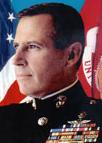
On Mar. 23, 1972 the U.S. calls a halt to the Vietnam peace talks in Paris. On Mar. 30 after deciding that another Tet Offensive could demoralize U.S. public opinion and discredit the Vietnamization campaign, the North Vietnamese launch the Nguyen Hue (Easter) Offensive (ends Oct. 22), a 3-pronged invasion of South Vietnam with 120K-150K troops and 500 tanks (first massive use of Soviet T-54 tanks) (biggest in Vietnam since 1968, and biggest invasion since the Korean War); on Apr. 2 (Easter Sun.) USMC Capt. John Walter Ripley (1939-2008) destroys the Dong Ha Bridge by attaching 500 lb. of explosives to it while under heavy fire and chanting "Jesus, Mary, get me there", stopping the invasion; on May 1 30K North Vietnamese cross the DMZ and take Quang Tri City, becoming their first major V, causing 80 U.S. advisors to be evacuated, and the green South Vietnamese 3rd Div. to flee S to the Thach Han River, leaving Hue unguarded, after which the cmdr. resigns and/or is fired, and deserters loot Hue, causing 150K to flee, after which pres. Nguyen Van Thieu visits it and gives military police authority to shoot looters and arsonists; on May 8 Pres. Nixon orders Operation Linebacker I, massive B-52 raids on North Vietnam to punish it for agression, and orders U.S. planes to mine Haiphong and other North Vietnamese ports, causing many U.S. troops to balk at criminal genocide; meanwhile the ARVN beefs up to 742K soldiers, and on May 2 capable Lt. Gen. Ngo Quang Truong (1929-2007) replaces incompetent Gen. Hoang Xuan Lam (1928-), giving an order to execute all deserters (I require both shoes and shirt?); meanwhile the North Vietnamese send a 2nd wave out of Cambodia targeted at An Loc 60 mi. N of Saigon, which takes Loc Ninh on Apr. 5 and An Loc Airport on Apr. 7, and attempts to invade An Loc on May 11-12, only to be repelled by massed B-52 bombing, plus a 3rd wave that on May 14 attacks Kontum (gateway to the sea, allowing them to cut South Vietnam in half), intending to attack Pleiku, from which the U.S. 52nd Combat Aviation Battalion AKA the Flying Dragons had evacuated in Apr., only to be zonked bigtime by B-52 Stratofotress bombers, each of which can carry 108 500-lb. MK82 bombs; after all the B-52 strikes devastate them, the NVA goes into gen. retreat by May 17; on June 17 U.S. ground combat in Vietnam ends; on Dec. 18 for good measure Nixon orders a nice little 12-day Xmas bombing campaign in North Vietnam; too bad, the dependence of the South Vietnamese on U.S. air power is exposed, and when the U.S. pulls out they are left naked and defenseless against a new offensive.

On Apr. 7, 1972 Vietnam heli pilot Richard Floyd McCoy Jr. (1942-74) hijacks United Airlines Flight 855 (727) in Denver, Colo. with an unloaded pistol and toy grenade and extorts $500K; on Apr. 9 he is captured after he flies a heli for the Nat. Guard looking for the hijacker, and a driver who had picked him up earlier wearing a jumpsuit and carrying a duffel bag IDs him; after being given a 45-year sentence, he escapes on Aug. 10, 1974, then is killed in a shootout with police on Nov. 9, 1974 in Virginia Beach, Va.; in 1991 FBI agents Bernie Rhodes and Russell P. Calame pub. D.B. Cooper: The Real McCoy. On Apr. 15 bombing of North Vietnam by the U.S. resumes. On Apr. 16 U.S. B-52 planes bomb Haiphong and Hanoi in North Vietnam, becoming the first major raids since 1968; on Apr. 19 North Vietnamese MiG-21s attack U.S. destroyers as they shell coastal positions, causing heated debate in the U.S. Senate. On May 9 U.S. rep. (D.-N.Y.) Bella Abzug introduces a resolution calling for the impeachment of Pres. Nixon for mining North Vietnamese harbors. On May 19 North Vietnamese, Chinese, Soviet, and Mongolian reps. meet in Beijing to speed aid to North Vietnam.

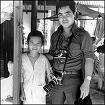
On June 8, 1972 U.S. heli pilot Capt. John Plummer (1947-) (an operations officer) orders the bombing of the village of Trang Bang, Vietnam 25 mi. W of Saigon; AP photographer Huynh Cong "Nick" Ut (1951-) takes a photo of screaming children suffering from napalm, incl. cute little naked 9-y.-o. Phan Thi Kim Phuc (1963-), drawing internat. attention; the injured children are taken to a hospital in Saigon, and Phan returns home after 14 mo. and 17 operations, after which she becomes a North Vietnamese propaganda tool, studies medicine, converts to Christianity in 1982, and emigrates to Canada in 1992; after seeing it pub. in the newspaper on June 12, 1972 Tricky Dicky tells H.R. Haldeman that he thinks the photo was "fixed"; in 1998 Plummer, a pastor at Bethany United Methodist Church in Purcellville, Va. meets with Phuc at the Vietnam Veterans Memorial in Washington D.C., and she forgives him, after which he admits that he lied about ordering the attack, because the plane that dropped the bombs was piloted by a South Vietnamese pilot, meaning that it was Vietnamese burning their own countrymen, and it was the Americans that saved her - with all these subliminal kiddie porno associations it's a sure winner?

On June 20, 1972 Pres. Nixon names Gen. Creighton Williams Abrams Jr. (1914-74) (known as "Colonel Abe" in WWII for his brilliant tank tactics) as CIC of the U.S. armed forces; the Senate holds up the appointment until Oct. to protest the war in Cambodia; after all the trouble, he dies of lung cancer in Sept. 1974 after beginning the transition to an all-dope, er, all-volunteer army. On June 28 Nixon announces that no new draftees will be sent to Vietnam - TLW Day? On July 11 U.S. forces break the 95-day siege at An Loc in Vietnam.

On Aug. 12, 1972 the last U.S. ground troops withdraw from Vietnam; the same day U.S. B-52s make their largest strike of the war - and take that? On Aug. 22 Oscar-winning Am. actress Jane Seymour Fonda (1937-) gives a bad performance for once when she gives an antiwar radio address in English on Radio Hanoi from a hotel room in Hanoi, then sits behind an anti-aircraft gun emplacement as if she's ready to shoot down all Yankees in sight, causing her to be branded as a traitor by Americans, "Hanoi Jane"; after years of denial, she finally apologizes in 1988 in a 20/20 TV interview with Barbara Walters; she had gone to Hanoi because the U.S. govt. was bombing dikes in the Red River Delta, threatening 200K Vietnamese civilians with drowning, and claims the Communists tricked her into the AA gun photo op by singing a song with the lyrics "We hold these truths to be self-evident"; false rumors circulate that her visit causes U.S. POWs to be killed. On Aug. 27 the U.S. bombs Haiphong, North Vietnam. On Sept. 16 South Vietnamese troops recapture Quang Tri Province in South Vietnam from the North Vietnamese Army. On Oct. 11 a French mission in Vietnam is destroyed by a U.S. bombing raid. On Oct. 17 peace talks between the Pathet Lao (Lao People's Rev. Party) and Royal Lao govt. begin in Vietnam. On Oct. 21 U.S. nat. security advisor Henry Kissinger and Le Duc Tho of North Vietnam reach a ceasefire agreement; it is signed on Jan. 27, 1973; on Oct. 22 Operation Linebacker I, the bombing of North Vietnam by B-52 bombers ends, along with the Easter Offensive (begun Mar. 30), with 40K North Vietnamese killed and 60K wounded or missing, vs. 10K South Vietnamese killed, 33K wounded, and 3.5K missing; on Oct. 24 in secret unauthorized talks in Paris Henry Kissinger proposes to end the Vietnam war immediately, but is urged by Pres. Nixon to stretch the timing a few mo. so as to insure his re-election in Nov.; on Oct. 26 Kissinger declares that "Peace is at hand" in Vietnam, and that Hanoi has dropped all its political demands for dismantling the South Vietnamese govt.; meanwhile the U.S. risks nuclear war to coerce the negotiations by circling armed bombers for three days over the polar cap near Russia? On Nov. 14 the Dow Jones closes above 1K for the 1st time, ending the day at 1,003.16, up 6.00; the Wall Street Journal says that "little market significance" should be attached to it; on Dec. 11 it climbs to 1036.27, then falls sharply on Dec. 18 after Vietnam peace talks break down. On Nov. 22 the U.S. loses its first B-52 in Vietnam - thanks to Jane Fonda? On Nov. 30 White House Press secy. Ronald Louis Ziegler announces that there will be no more public announcements about U.S. troop withdrawals from Vietnam since they are down to a piddling force of 27K. On Dec. 18-29 Operation Linebacker II, ordered by "Mad Bomber" Pres. Nixon becomes the heaviest bombing of North Vietnam so far, dropping 20K tons of bombs on Hanoi and Haiphong, killing 1.6K civilians, with 70 U.S. airmen killed or captured; smart bombs make their appearance, giving the North Vietnamese defenders fits, but they down 15 B-52D and B-52G bombers with Soviet-made SA-2 SAMs, leaving the wreckage of one where it fell near the Hanoi Botanical Gardens as a monument; even so, they cry uncle and rush to the negotiating table in Paris while licking their wounds. On Dec. 22 Bac Mai Hospital in Vietnam is bombed by U.S. B-52s when they miss an air base on the outskirts of Hanoi, killing 18 hospital workers and patients; meanwhile a peace delegation incl. singer Joan Baez and human rights atty. Telford Taylor visit Hanoi to deliver Xmas mail to U.S. POWs. On Dec. 24 the 1972 Christmas Bombings of North Vietnam stink the U.S. up; Hanoi bars all peace talks with the U.S. until the air raids stop; on Dec 26 the bombing over Hanoi resumes after a cynical 1-day Xmas day respite, and ends on Dec. 29 after the North Vietnamese agree to resume talks; on Dec. 24 Swedish PM Olof Palme compares the bombings to Nazi massacres at Treblinka, causing the U.S. to break diplomatic contact with Sweden. In Dec. a U.S. commando group plants a tap on a communications link at Vinh, N of the DMZ, and later pulls out details of the North Vietnamese positions at the Paris peace talks.
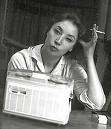
In 1972 Italian journalist Oriana Fallaci (1929-2006) interviews Henry Kissinger, getting him to admit that the Vietnam War is a "useless war", and to compare himself to "the cowboy who leads the wagon train by riding ahead alone on his horse", after which he writes that it was "the most single most disastrous conversation I have ever had with any member of the press" - because he was thinking with his johnson?

In 1972 New York City-born journalist-historian Frances FitzGerald (1940-) pub. Fire in the Lake: The Vietnamese and the Americans in Vietnam (Pulitzer Prize), a landmark book giving the South Vietnamese side of the Vietnam War (first book by an American on America in Vietnam), incl. how their traditions don't jive with Western notions of democracy, progress, and technology, dooming the U.S. effort from the start, along with the U.S. penchant for supporting gangsters who sell-out for U.S. money instead of patriotic George Washingtons like Ho Chi Minh, turning the pop. against them; "But the American officials in supporting the Saigon government insisted that they were defending 'freedom and democracy' in Asia. They left the GIs to discover that the Vietnamese did not fit into their experience of either 'communist' or 'democrats.' Under different circumstances this invincible ignorance..."; "Whatever strategy the American government uses to carry on the war, it will only be delaying the inevitable."

In 1972 David Halberstam (1934-2007) pub. The Best and the Brightest, about the U.S. entry into the Vietnam War under the JFK admin.; "If there was ever anything that bound the men... together, it was the belief that their intelligence and rationality could answer and solve everything."

In 1972 Am. activist writer Mary Therese McCarthy (1912-89) pub. Medina, about the 1968 My Lai Massacre and Ernest Medina, in whom she sees "no traces whatever of the crime and its aftermath either in Medina, joking and whispering with counsel", or the others who testify.

Early in 1973 the U.S. attempts to prop up Lon Nol's Khmer Repub. by dropping twice as many bombs on Cambodia as it dropped on Japan in WWII; by the time the protests back home cause the U.S. Congress to force an end to it, it backfires and alienates the Cambodian pop. and makes it easy for the Khmer Rouge to get new recruits, giving them control of two-thirds of the country, incl. the ruins of Angkor Wat. On Jan. 2, 1973 the U.S. admits to the accidental bombing of a Hanoi hospital - just one? On Jan. 8 secret peace talks between the U.S. and North Vietnam resume near Paris. On Jan. 15 Pres. Nixon announces the suspension of all U.S. offensive action in North Vietnam, citing progress in peace negotiations, and not revealing that the South Vietnamese don't want to sign a peace treaty for fear that it will doom them, causing Nixon to threaten Pres. Nguyen Van Thieu with a halt to U.S. aid, uttering the soundbyte to Henry Kissinger "I don't know whether the threat goes too far or not, but I'd do any damn thing, that is, or to cut off his head if necessary." On Jan. 23 a Vietnam Cease-Fire Agreement between the U.S. and Vietnam is announced in Paris, is signed on Jan. 27, and goes into effect on Jan. 28 (Sun.), ending the U.S. military draft (until ?) as the U.S. military pulls out of Vietnam while the North Vietnamese Christmas bombing victims are still fresh in the ground; the North Vietnamese are given 60 days to return U.S. POWs, and the first are released on Feb. 11; on Mar. 29 the last U.S. troops leave South Vietnam, but the bombing of Cambodia continues; the Vietnam War results in 58K U.S., 250K ARVN (South Vietnamese), and 1.1M Viet Cong troops, and 2M civilians killed. On Jan. 30 Elliot Lee Richardson (1920-99) becomes U.S. defense secy. #11; on May 25 Pres. Nixon appoints reappoints him as U.S. atty. gen. #69 (to Oct. 20) to coverup, er, oversee the Watergate investigation.

On Feb. 5, 1973 services are held at Arlington Nat. Cemetery for Army Lt. Col. William Benedict Nolde (1929-73), the last U.S. combat casualty before the Vietnam ceasefire, who was killed on Jan. 27 at An Loc by an artillery shell 11 hours before the truce began - that schnooze alarm would have bought him a few extra minutes? On Feb. 12 Operation Homecoming begins with the first of 591 U.S. POWs from the Vietnam conflict being handed over near Hanoi; 660 of 725 POWs held in Vietnam survived, the first and longest-held being Everett Alvarez Jr. (1937-); future Ariz. Repub. Sen. (1987-2018) John Sidney McCain III (1936-2018) is released on Mar. 14; the last to be released is Robert Thomas White (1940-) on Apr. 1 after three years in solitary. On Feb. 14 the U.S. and Hanoi set up a group to channel reconstruction aid directly to Hanoi.

On Mar. 17, 1973 a bomb goes off that is meant for Cambodian pres. Lon Nol, killing 20 but missing him. On Mar. 29 the last U.S. combat troops leave South Vietnam; between 14.7%-30.9% of Vietnam vets develop Post-Traumatic Stress Disorder (PTSD), depending on the study, e.g. one reported on Aug. 18, 2006 in Science claiming 18.7%, with 9.1% still suffering from it by the end of the 1980s; 2006 studies suggest that from 11%-17% of U.S. soldiers in Iraq had symptoms of PTSD upon their return. On Mar. 30 U.S. ambassador to South Vietnam (since Apr. 5, 1967) Ellsworth Bunker resigns, and on June 21 is succeeded by Graham Anderson Martin (1912-90) (until Apr. 29, 1975) (last). On Apr. 1 the last U.S. Vietnam POWs are supposedly handed over, after which persistent rumors cause a Rambo, er, movement to rescue remaining POWs. On Apr. 28 a huge explosion of 6K bombs headed for Vietnam occurs at the Southern Pacific Railroad yard at Roseville, Calif. On June 19 the U.S. Case-Church Amendment prevents further U.S. involvement in Southeast Asia - wasn't Frank Church the guy who wrote Virginia that there is a Santa Claus? On June 27 Pres. Nixon vetoes a U.S. Senate ban on bombing of Cambodia. On Aug. 7 a U.S. plane accidentally bombs a Cambodian village, killing 400 civilians. On Aug. 15 U.S. warplanes cease bombing missions in Cambodia and all of Indochina, originally begun in 1961; the U.S. pullout is complete, leaving the South Vietnamese to defend themselves. On Sept. 21 Henry (Heinz) Alfred Wolfgang Kissinger (1923-) is confirmed as U.S. secy. of state #56 by the U.S. Senate, and takes office on Sept. 22 (until Jan. 20, 1977), becoming the first Jew and Kraut, er, naturalized citizen to hold the office, winning the Nobel Peace Prize on Oct. 16 along with Le Duc Tho, who refuses to accept it because there's no actual peace in Vietnam yet - ah look, we're on the guest list, it's the menu? On Nov. 7 the U.S. Congress overrides Pres. Nixon's veto of the U.S. War Powers Act (Resolution), giving the U.S. pres. 60 days freedom of action against a perceived enemy to the U.S. before Congress can call them back, but requiring the pres. to consult with Congress before sending troops, and to report to them within 48 hours of deployment; after Nixon, presidents begin ignoring the act on the grounds that Nixon called it unconstitutional - just think of your Congressman's face, how he's the kind of whimp you'd beat up at school... and then thinks he can suddenly push you around in student council?

On Apr. 16, 1974 Ga.-born Dem.-turned-Repub. U.S. Army Secy. #11 (1973-5) Howard Hollis "Bo" Callaway (1927-) halves the 10-year sentence of former Army Lt. William L. Calley Jr., allowing him to receive parole without serving any prison time, only house arrest; in 1976 Callaway becomes Gerald R. Ford's campaign mgr., and stages an unsuccessful bid for the Colo. Sen. seat of Dem. Gary Hart in 1980, after which his son-in-law Terry Considine does ditto for the Colo. Sen. seat of Dem. Ben Nighthorse Campbell in 1992; Calley finally breaks his silence and apologizes in Aug. 2009.




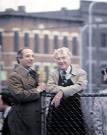
8-8-7-4, King Richard is no more? On Aug. 8, 1974 (Thur.) (same day he was nominated for pres. in 1968?) after being told by Repub. Senators Barry Goldwater, Hugh Scott and John Rhodes on Aug. 7 that there are enough votes to convict and remove him, and flopping on his earlier assertions that he would fight to the bloody end, Pres. Tricky Dicky Nixon goes on TV and admits "some" wrong judgments, then announces his resignation, effective at noon EST Aug. 9 (first U.S. pres. to resign), taking the Sea King VH-3A Marine One heli from the White House South Lawn to Andrews AFB in Md., then taking Air Force One to El Toro Marine Corps Air Station in Calif., then traveling to his new hideaway home in San Clemente, Calif. along with loyal-to-the-end press secy. Ronald Ziegler, who later utters the soundbyte "I was the only one on that plane to San Clemente with Nixon when power changed hands. I was there with Nixon in exile. I will publish a good book someday"; Nixon later writes "As the helicoper moved on to Andrews, I found myself thinking not of the past, but of the future. What could I do now?"; during his presidency Nixon viewed more than 500 movies in the White House (Jimmy Carter later comes in 2nd with 465); Johnny Carson's nightly jabs at him help cement his fall; his approval rating in Calif. has dropped to 24%; his daughter Julie says, "Now I can wear hot pants"; Ziegler also utters the soundbyte "Thank goodness, I was one of the few members of the Nixon White House staff who was never indicted and I was not part of the coverup", and in 1988 he becomes CEO of the Nat. Assoc. of Chain Drug Stores; future U.S. pres. George Herbert Walker Bush was not only involved in JFK's assassination but in Nixon's ouster, which he engineered to get him out of the way? The President that Ford Motor Company built? On Aug. 9 (Fri.) (noon) Neb.-born U. of Mich. All-American football center and Yale Law School grad. ("The right sort of sports fan" - McGeorge Bundy, pres. of the Ford Motor Co. Foundation) Gerald Rudolph "Jerry" Ford Jr. (1913-2002) (not "Gerry") becomes the 38th U.S. pres. (until 1977) in the 56th U.S. Pres. Inauguration, becoming the first unelected "25th Amendment President", AKA the "Accidental President" (895-day term of office), and the first person to serve as pres. and vice-pres. without winning election to either office (first in a position to make deals to get himself the job with pure backroom politics?); 4th lefty U.S. pres. (last Truman, next Reagan); 5th pres. who was never elected to the office (John Tyler, Millard Fillmore, Andrew Johnson, Chester Arthur); 25th atty. to become pres. (next ?); Ford's Inauguration Address takes pains to say that it is not an inauguration address, and incl. the soundbyte "Our long national nightmare is over. Our Constitution works. Our great republic is a government of laws and not of men... I am acutely aware that you have not elected me by your ballots, and so I ask you to confirm me as your president with your prayers"; wanting to be known for his Washington-like integrity rather than his brains, he adds "I'm not a Lincoln I'm a Ford"; he has the U.S. Marine Corps Band play the U. of Mich. fight song instead of Hail to the Chief, and doesn't "change" after being pres.; he orders a truck with Nixon's White House papers stopped, and Congress passes an act authorize their seizure on behalf of the U.S. people, and ordering pub. of parts not containing state secrets or purely personal matters. The reason private gold ownership was legalized so fast after he took office? On Sept. 8 new U.S. pres. Gerald R. Ford grants a "full, free, and absolute" pardon to Richard Nixon for all federal crimes "he committed or may have committed or taken part in" while in office, which proves unpopular with the public, stirring rumors of a secret deal, although he denies it and claims it was needed to heal the country's divisions and spare Tricky D and the nation from further punishment; he asks Congress for $850K to facilitate Nixon's transition to private life, which they cut down to $200: on Sept. 8 Ford's press secy. (since Aug. 9) Jerald Franklin "Jerry" terHorst (1922-) resigns in protest, saying he couldn't stomach it after he had been told to deny he would do it to reporters, and that Ford refuses to pardon Vietnam War draft evaders; NBC reporter Ronald Harold "Ron" Nesson (1934-) becomes Ford's White House press secy. (until 1977), uttering the soundbyte "Nobody believes the official spokesman... but everybody trusts an unidentified source"; Ford does it knowing that the decision ultimately will cost him the 1976 election? - the rich man Rockefeller appointment didn't have something to do with it?
On Sept. 16, 1974 Pres. Ford (in a pardoning mood) announces a limited Clemency Program for Vietnam War Deserters and draft evaders; 22.5K of 124K men who are eligible take advantage of it. In Sept. the U.S. Congress approves a measly $700M for South Vietnam, dooming it to North Vietnamese takeover. On Oct. 30 South Vietnamese Pres. Thieu fires three top military corps cmdrs. for corruption - it's just another day? On Dec. 12 a military heli crashes in South Vietnam, killing 54 soldiers. The U.S. shows its Achilles heel of a limited attention span to the world? On Dec. 13 North Vietnam tests American resolve by attacking Phuoc Long Province in South Vietnam; when no military response is forthcoming, they plan the final assault - me you Phuoc Long time?

Beginning in 1975 large numbers of SE Asians (Vietnamese) begin immigrating to the U.S. On Jan. 20, 1975 the Hanoi Politburo approves the final military offensive against South Vietnam by 200K fresh NVA troops. Commies acting bravely? On Mar. 10 the North Vietnamese Army launch their march on Saigon by attacking the South Vietnamese town of Ban Me Thout; on Mar. 18 South Vietnam abandons most of the Central Highlands; on Mar. 21 Hue and other towns in N South Vietnam are evacuated; on Mar. 25 Hue is captured and Da Nang is endangered, and the U.S. orders a refugee airlift to remove those in danger; NVA CIC Gen. Vo Nguyen Giap (b. 1912) is diagnosed with Hodgkin's Disease, and replaced by Van Tien Dung (1917-2002) (veteran of the 1954 Battle of Dien Bien Phu), who establishes his HQ in Loc Ninh only 75 N of Saigon, launching the 55-day Ho Chi Minh Campaign.



Commies behaving badly? On Apr. 1, 1975 Cambodian pres. Lon Nol is forced to leave the country with a few advisors and the U.S. embassy staff as the Communist Khmer Rouge, led by Pol Pot (Saloth Sar) (1928-98) advance on the capital of Phnom Penh; on Apr. 17 (final day of the Cambodian New Year) the U.S.-backed Lon Nol govt. surrenders after a 5-year war to the Khmer Rouge, who rename the country Dem. Kampuchea, and, spurred on by chief ideologue Nuon Chea (Long Bunruot) (Lau Ben Kon) (1926-) proceed to begin the Pol Pot (Cambodian) Genocide (Massacre) (ends 1979), emptying Phnom Penh of its 3M pop. in 72 hours and marching them off to rural shithole communes, murdering 1.7M people (35% of the pop.) in 450 killing fields to create their Third World Commie paradise, while the U.S. and the rest of the world look the other way; everyone over age 10 has to work in the fields; families are separated, and marriage, religion, formal education, and money are abolished; being educated or wearing glasses is a death sentence; they destroy the Cambodian Nat. Library, wiping out much of the country's history archive; horror stories are told for decades; religion is outlawed, and all but a few hundred of the 60K Buddhist monks are murdered - pass another pot along the empty Commie salad bar?

On Apr. 2, 1975 57 orphaned or abandoned children are evacuated from Saigon to the U.S. on a World Airways cargo DC-8 (red and white markings) as part of Operation Babylift, led by Cherie Clark (1945-) et al., under which 2.6K Vietnamese children are relocated to the U.S. (until Apr. 14); the airline defies U.S. authorities at first, but public support causes the govt. to back off; on Apr. 4 a USAF C-5A Galaxy transport plane crashes shortly after takeoff, experiencing explosive decompression at 23K ft., killing 206 and wounding 76 of the 382 passengers, most of them children.
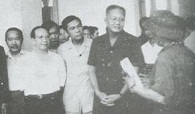

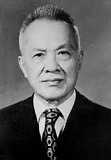
On Apr. 12-20, 1975 the Battle of Xuan Loc, (last stop before Saigon) is won by the NVA, and the South Vietnamese army disintegrates as the NVA heads for Saigon; on Apr. 21 pres. (since 1965) Nguyen Van Thieu resigns, condemning the U.S. for selling him out, and flees to Taiwan with millions of dollars of gold, later moving to Surrey, England; vice-pres. Tran Van Huong becomes pres.; on Apr. 23 NVA forces reach artillery and rocket range of Tan Son Nhut Air Base; on Apr. 25 former foreign minister Vu Van Mau (1914-98) is named new South Vietnamese PM, and the Australian embassy is closed 10 years after the first Australian troop commitments to South Vietnam; on Apr. 27 Saigon is encircled by North Vietnamese troops, causing Graham A. Martin, U.S. ambassador to South Vietnam to ask Washington to protect Saigon with an "iron ring" of B-52s from Guam, saying on Saigon TV "I, the American ambassador, am not going to run away in the middle of the night... I give you my word"; too bad, on Apr. 29 Henry Kissinger sends him a cable telling him to evacuate, and after Tran Van Huong resigns and Tan Son Nhut comes under NVA attack, Martin orders the the preset signal "The temperature in Saigon is 112 degrees and rising" sent on the radio, followed by the playing of Bing Crosby's "White Christmas", which is blasted on loudspeakers throughout the city, and Operation Frequent Wind begins, and U.S. helis evacuate 1,373 U.S. civilians and 5,595 Vietnamese refugees in an 18-hour period (largest heli rescue in history until ?), while a city crammed with 2M-3M heads for the U.S. embassy hoping to get a ride out; as the NVA close in on the airport, during the day and night Marine CH-53 Sea Stallion and smaller UH-1B Huey helis (who land on the embassy roof) dodge sniper fire to fly 638 sorties and take 6,236 passengers to ships of the Seventh Fleet, who make room by pushing helis into the sea; the embassy roof is illuminated by a 35mm slide projector; only 1.5K are airlifted from the embassy, plus a few from the roof, while 4.5K are airlifted from the Defense Attache Office (DAO) (created Jan. 28, 1973) at the airport, which is attacked by South Vietnamese A-37 Dragonfly attack planes commandeered by North Vietnamese pilots; the embassy gets all the publicity, so that when Marine Cpl. Otis Lamar Holmes (1955-2008) is wounded by shrapnel from a rocket attack that kills Lance Cpl. Darwin Lee Judge (b. 1956) and Cpl. Charles McMahon (b. 1953) on Apr. 29 (the last two U.S. servicemen to die in the war), he doesn't get his Purple Heart until 2005; on Apr. 30 at 4:58 a.m. CH-46 heli "Lady Ace 09" takes gung-ho U.S. ambassador Graham Martin and his Marine squad to the fleet, and "as his heli banked over Highway One, the ambassador could see the headlights of trucks of the People's Army of Vietnam, waiting"; by 8 a.m. the last 11 Marines are airlifted out, stiffing several hundred Vietnamese promised evacuation; at 12:15 p.m. after tank crews stop and ask for directions, Pres. Duong Van Minh surrenders without a shot, and the flag of the Nat. Liberation Front is raised above the Pres. Palace, officially signalling the Fall of Saigon; Gen. Duong Van "Big" Minh (1916-2001), South Vietnam's last leader announces its unconditional surrender, giving the Commies a big V to celebrate on May Day (May 1), AKA Gen. Dung's Great Spring Victory; the Vietnamese People's Army captures 41 F-5 Tiger jet airplanes; 200K-350K possible troublemakers (incl. military officers, politicians, and intelligentsia) are sent to reeducation camps, where thousands die, and 1M are sent to New Economic Zones, where starvation and disease kill thousands more; meanwhile 1.2M Vietnamese boat people flee in leaky overcrowded vessels, drowning 600K; former PM Nguyen Cao Ky flees to Norwalk, Calif., where he buys a liquor store; Saigon is renamed Ho Chi Minh City, with Nguyen Huu Tho (1910-96) as the first mayor; on May 3 Pres. Ford declares the war "finished", and calls upon Americans "to avoid recriminations about the past, to look ahead to the many goals we share"; the Vietnam War (never officially begun?) ends; death toll: U.S.: 58,209 dead, 153,300 wounded, 2,124 MIA; Communists: 1M dead, 300K MIA; civilians: 1.3M-2M dead (14% of the pop.); U.S. aid to South Vietnam: $141B; Congress appropriates $405M to settle 130K Vietnamese refugees in the U.S.; Thailand demands that the U.S. withdraw its military personnel, and establishes diplomatic relations with China; in 1985 Graham bitches "In the end we simply cut and ran; the American national will had collapsed" - maybe Ford just pardoned the Viet Cong?



On Apr. 2, 1976 the Khmer Rouge force Prince Norodom Sihanouk out of office and into retirement, and on Apr. 11 Khmer Rouge leader Khieu Samphan (1931-) becomes chmn. of the state presidium of Dem. Kampuchea (Cambodia) (until Jan. 7, 1979), succeeding Norodom Sihanouk as head of state; on May 13 strongman Pol Pot (Saloth Sar) (1928-98) becomes PM (until Jan. 7, 1979). On July 2, 1976 the Socialist Repub. of Vietnam is officially proclaimed, reuniting North and South Vietnam, with Ho Chi Minh City (Hanoi) as the capital, and North Vietnamese pres. #2 (since Sept. 2, 1969) Ton Duc Thang (1888-1980) as pres. #1 (until Mar. 30, 1980), and Ho Chi Minh's successor (since 1969) Le Duan (Le Dung) (1907-86) remaining secy.-gen. of the Vietnamese Communist Party (until July 10, 1986); ethnic Chinese merchants in Ho Chi Minh City and other cities resist assignment to "new economic zones" in the countryside. In Aug. Thailand and Vietnam establish diplomatic relations. On Sept. 13 the U.S. announces that it will veto Vietnam's U.N. membership bid. On Oct. 6 former dictator Thanom Kittikachom returns from exile under the excuse of becoming a Buddhist monk, triggering a student protest at Thammasat U., during which a mock hanging of a student protester uses a photo looking too much like the crown prince, pissing-off the right-wingers and resulting in the 1976 Thailand Massacre, killing 46+; three years of civilian govt. in Thailand ends with a military coup and military rule under the excuse of danger from Vietnam, Laos, and Cambodia; the constitution and parliament are abolished, and political parties banned; Kittikachom retires from both politics and monkhood.


On Jan. 21, 1977 new Pres. Carter pardons almost all Vietnam War draft evaders (about 10K), except those involved in violent acts, and deserters, causing the Nat. Council for Universal and Unconditional Amnesty to complain that the resisters are "essentially white, middle-class, and well-educated", while the deserters are "primarily and disproportionately from the poor and minority groups". On Sept. 20 the 1st wave of Vietnamese Boat People arrive in San Francisco, Calif. under a new U.S. resettlement program; after the new regime imposes Socialist economic measures, the tide grows next year, with Taiwan, France, West Germany, Canada, and Malaysia also accepting refugees; W Denver's Federal Blvd. in Colo. is bought-up and soon sprouts Vietnamese restaurants and Asian groceries, which TLW patronizes. In Oct. after Communist students in jungle bases threaten the regime, the Thailand military stages another coup, appointing gen. Kriangsak Chomanand (1917-2003) as PM of Thailand on Nov. 12 (until Feb. 29, 1980); meanwhile refugees from Laos, Cambodia, and Vietnam pour into Thailand starting next year. On Dec. 3 the U.S. State Dept. proposes that 10K Vietnamese boat people be admitted, adding to the 165K already admitted since 1975. On Dec. 31 Cambodia breaks diplomatic relations with Vietnam.

In 1977 Gloria Emerson (1929-2004) pub. Winners and Losers: Battles, Retreats, Gains, Losses, and Ruins from the Vietnam War, bemoaning the "absence of the effect" of the Vietnam War on some Americans; "Americans cannot perceive - even the most decent among us - the suffering caused by the United States air war in Indochina and how huge are the graveyards we have created there. To a reporter recently returned from Vietnam, it often seems that much of our fury and fear is reserved for busing, abortion, mugging, and liberation of some kind... As Anthony Lewis once wrote, our military technology is so advanced that we kill at a distance and insulate our consciences by the remoteness of the killing."
On Jan. 1, 1978 border clashes between Cambodia and Vietnam lead to 8K deaths. On Jan. 3 Vietnamese troops occupy 400 sq. mi. of Cambodia, causing it to send ex-king Norodom Sihanouk to the U.N. to speak out against them; after his speech, he seeks refuge in China then North Korea. In May expulsion of ethnic Chinese by Vietnam produces an open rupture with Communist China as Beijing sides with Cambodia in border fighting with Vietnam, and charges Hanoi with aggression. On July 3 China cuts off economic and technical aid to Vietnam. On Oct. 1 Vietnam attacks Cambodia along the border. On Dec 4. after hundreds drown after being refused entry, Malaysia finally allows entry of Vietnamese boat people since they're mostly ethnic Chinese. On Dec. 25 after making an announcement early in the year that it will begin socializing industry and agriculture in S Vietnam, causing hundreds of thousands of ethnic Chinese and Vietnamese to flee, and getting tired of border attacks, the Soviet-supplied Vietnamese army invades Cambodia to drive out the Khmer Rouge, becoming the first full-scale war between the two countries since 1917; 400 are killed in initial clashes.

On Dec. 8, 1978 Michael Cimino's The Deer Hunter debuts, about Russian Orthodox Catholic steel workers from Clairton, Penn. who go to the Vietnam War in 1967 and come back totally messed-up stars Robert De Niro as S/Sgt. Michael "Mike" Vronsky, John Savage as Steven Pushkov, and Christopher Walken as Cpl. Nikanor "Nick" Chevotarevich, who leave behind friends Stanley "Stosh" (John Cazale), John Welch (George Dzundza), Peter "Axel" Axelrod (Chuck Aspegren), and Linda (Meryl Streep); redefines the Vietnam War in human terms, and makes a star out of wacked-out Christopher Walken, who goes nuts after a controversial Russian roulette scene in a tiger cage prison, playing it for money in Saigon; music by Stanley Myers and John Williams.


In 1979 160K+ boat people flee Vietnam, up from 100K in 1978. On Jan. 5-7, 1979 170K Vietnamese troops (14 divs.) occupy Phnom Penh and the seaport of Kompong Som, and oust the 35K Khmer Rouge and Pol Pot, who flee to sanctuaries along the Thai border, where they fight back for the next 12 years allied with the 9K non-Commie troops of Prince Sihanouk and another 15K non-Commie troops under Son Sann (1911-2000), while the Khmer Rouge continue the murder of Cambodians with any "bourgeois" past; the Vietnamese install a people's rev. council led by Heng Samrin (1934-) along with foreign minister Hun Sen (1951-), who becomes PM on Nov. 30, 1998; the Soviets congratulate Vietnam, but Romania breaks with the Warsaw Pact and denounces it, calling it a "heavy blow to the prestige of socialism", and China prepares an invasion of Vietnam to teach them a lesson about who's da boss, them or the Soviets. On Jan. 15 the Soviet Union vetoes a U.N. proposal calling for withdrawal of Vietnamese troops from Cambodia. On Feb. 17 in response to its occupation of Cambodia, China invades North Vietnam in the short and bloody "pedagogical" Sino-Vietnamese War, withdrawing on Mar. 16, with both sides claiming a V, although Vietnamese occupation of Cambodia continues, becoming the last war in Indochina in the 20th cent. On Mar. 1 deputy PM Deng Xiaoping visits the U.S. as embassies open in the capitals of China and the U.S.; on his return, 200K-300K Chinese troops invade Vietnam to avenge alleged violations of Chinese territory and retaliate for Vietnam's invasion of Cambodia; on Mar. 8 China withdraws them. On Apr. 11 Chinese diplomats to Cambodia cross into Thailand after a 15-day, 125-mi. escape from the Vietnamese Army. On Nov. 24 the U.S. admits that thousands of troops in Vietnam were exposed to the toxic substance Agent Orange.
By the end of June 1980 130K refugees from Laos and Vietnam are living in Thailand along the Cambodian border, and invasions of Thai territory by Vietnamese troops fighting the Pol Pot govt. drive 100K more Cambodian refugees into Thailand, joining the 200K Cambodians already there, causing the Thais to appeal to the U.S. for military aid; in July 35 reconditioned tanks and other weapons are flown to Thailand, and the Carter admin. pledges help in the event of a larger attack.
On Feb. 14, 1981 Australia withdraws recognition of the Pol Pot regime in Cambodia. In 1982 Norodom Sihanouk becomes pres. of the Coalition Govt. of Dem. Kampuchea (CGDK), which incl. his own Funcinpec Party and the lovely Khmer Rouge, and works to oust the hated Vietnamese from Cambodia.

In 1981 Robert Olen Butler (1945-) pub. his first novel The Alleys of Eden, the first of his Vietnam War Trilogy (1982, 1985); a Vietnam deserter decides to stay in Vietnam "because, with all its troubles, Vietnam seems to him to retain more of its integrity, its sense of self, than the America he has left behind"; rejected by 21 publishers until Horizon Press takes a chance on it.

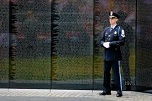
On Mar. 26, 1982 groundbreaking ceremonies are held for the black granite Vietnam Veterans Memorial in Washington, D.C., designed by architecture student Maya Ying Lin (1959-), who last May 6 was selected from 1,422 entries; on Nov. 10 it is opened to its first visitors, then dedicated on Nov. 13; it displays the names of all 57,692 (later 58,318) killed or missing.

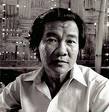
On May 7, 1984 an out-of-court settlement is announced in the Agent Orange (Dioxin) Class-Action Suit brought by Vietnam veterans against Dow Chemical and six other manufacturers, who agree to create a $180M fund for Vietnam vets harmed by the herbicide. On May 28 Pres. Reagan leads a state funeral at Arlington Nat. Cemetery at the Tomb of the Unknowns for an unidentified U.S. soldier killed in the Vietnam War. On Nov. 2 Roland Joffe's The Killing Fields debuts, based on New York Times reporter Sydney Schanberg's (Sam Waterston) account of his friendship with Cambodian interpreter Dith Pran, played by Cambodian physician Haing Somnang Ngor (1940-96), and the aftermath of the May 1973 fall of Phnom Penh features John Malkovich's screen debut and Joffe's dir. debut.

On Feb. 14, 1985 Hanoi troops surround the main Khmer Rouge base at Phnom Malai, and on Feb. 15 drive the rebels from the last of their bases despite secret support from the U.S. via China. On Sept. 2, 1985 former Cambodian ruler Pol Pot retires from the Khmer Rouge to a military advisory role. On July 10, 1986 Vietnamese Communist strongman leader Le Duan (b. 1907) dies, opening the door for the Doi Moi (Renovation) Reforms, departing from the old Stalinist-Maoist model, incl. privatization; the Sixth Party Congress of the Communist Party of Vietnam announces liberal economic reforms, ostensibly aiming the country towards capitalism. On Jan. 7-9, 1987 a Chinese-Vietnamese border fight in Vi Xueyen District, Ha Tuyen Province kills 1.5K Chinese troops. On Jan. 10, 1988 Soviet media report on an interview given to Chinese journalists by Gorbachev, who praises the state of Sino-Soviet relations and calls for a summit, which the Chinese refuse until Soviet-backed Vietnamese forces withdraw from Cambodia. In Sept. 1989 Vietnam recalls its troops from Cambodia, leaving behind the pro-Vietnamese People's Repub. of Kampuchea (PRK) (founded 1979) under ex-Khmer Rouge man (who was wounded in Apr. 1975 and ended up with a glass eye) Hun Sen (1951-), who has been PM since Jan. 14, 1985, and continues in power behind various puppet coalitions until ?

On Dec. 19, 1986 Oliver Stone's Platoon debuts, starring Charlie Sheen as college-educated Vietnam volunteer Chris Taylor, who joins Bravo Co. 3rd Battalion 22nd Infantry Regiment 25th Div. and learns the facts of life from scarfaced Sgt. Barnes (Tom Berenger) and Sgt. Elias (Willem Dafoe), a G.I. Joe killer Christ complete with crucifixion, recreating the 1968 photo by Art Greenspon, all to Samuel Barber's "Adagio for Strings"; "The last casualty of war is innocence"; does $138.5M at the box office.


In 1988 Neil Sheehan (1936-) pub. A Bright Shining Lie: John Paul Vann and America in Vietnam (Pulitzer Prize), about the life of U.S. Lt. Col. John Paul Vann (1924-79), who blew the whistle on the inept handling of the Vietnam War and was booted out of the Army in 1963, returning as a civilian to stick it out, dying in a heli crash and being awarded the Medal of Freedom by Pres. Nixon, and becoming the only civilian to be awarded a Distinguished Service Cross for Vietnam.

On Dec. 20, 1989 Oliver Stone's Born on the Fourth of July debuts, starring Tom Cruise as Ron Kovic, who goes from a gung-ho Vietnam War recruit to a paraplegic anti-war protester pissed about losing his dream girl Kyra Sedgwick to Kevin Bacon?; "A story of innocence lost and courage found".
In Dec. 1989 the Vietnam Center and Archive is founded at Texas Tech U., becoming the first U.S. institution to sign a formal exchange agreement with the Vietnamese govt. on Aug. 17, 2007.
On Mar. 27, 1991 PM Kaysone Phomivihan opens the Fifth Congress of the Laotian Communist Party in Vientiane, vowing to continue economic reforms aimed at "our gradual advance toward Socialism" without political reforms, a strategy that has garnered them $180M in internat. aid.
In Sept. 1993 the Clinton admin. begins relaxing the U.S. embargo on Vietnam, virtually ending it by the end of the year.
In Jan. 1994 the Clinton admin. formally lifts its trade embargo against Vietnam after 19 years, put in place over allegations of harboring MIAs - welcome to our world?





On June 10, 1997 Pol Pot (1925-98) has his key aide Son Sen (b. 1930) potted, along with his 13-member family, causing a split in the Khmer Rouge, and on June 20 he is captured in the jungle by forces of co-PM Hun Sen (1952-) (a Cambodian Baby Boomer?), who seizes seizes power on July 5, defeating coalition partner Prince Norodom Ranariddh (1944-) (2nd son of Norodom Sihanouk), and promising to restore democracy incl. an opposition party; on July 25 Pol Pot is put on show trial and sentenced to life in priz; too bad, Hun Sen keeps the same old same old, incl. former Khmer Rouge cmdr. and myriad-butcher Ke Pauk. On July 30/31 Bao Dai (b. 1913), the last emperor of Vietnam (1945-9) dies in exile in Paris, and his son Bao Long becomes crown prince of Vietnam in exile in France. On Dec. 29 Gen. Le Kha Phieu (1931-) succeeds Do Muoi as gen. secy. of the Communist Party of Vietnam, and campaigns against political corruption; Tran Duc Luong (1937-) becomes PM (until 2006) - striving to make the top 20 list of the world's worst dictators?


In June 1998 the remains of the Vietnam War veteran in the Tomb of the Unknowns at Arlington Nat. Cemetery in Va. are identified as those of 1st Lt. Michael Joseph Blassie (1948-72), an Air Force pilot shot down in South Vietnam on May 11, 1972; his remains were buried there in 1984, then removed in May, DNA-tested, identified, and reinterred in a cemetery in St. Louis, Mo. in July. In Aug. 1998 Vietnam announces that it will release 5,219 prisoners as part of a gen.amnesty, incl. pro-democracy dissidents Doan Viet Hoat (1942-) ("the Sakharov of Vietnam") and Nguyen Dan Que (1943-), on condition they move to the U.S.; too bad, Que remains in Vietnam, where he lives under virtual house arrest until being rearrested on Mar. 17, 2003, being released on Feb. 2, 2005 and moving to Ho Chi Minh City to go at it again. On Nov. 11 a bronze statue honoring the 11K+ U.S. women who served in the Vietnam War is dedicated in Washington, D.C.
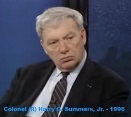
In 1999 Harry G. Summers Jr. (1932-99) pub. The Vietnam War Almanac, containing the soundbyte: "One of the great tragedies of the Vietnam War is that although American armed forces defeated the North Vietnamese and Viet Cong in every major battle, the United States still suffered the greatest defeat in its history. A clue to how this could happen was provided by Sun Tzu... 'If you know... not the enemy,' he wrote, 'for every victory gained, you will suffer a defeat'."
On Nov. 16, 2000 Pres. Clinton becomes the first sitting U.S. pres. to visit Vietnam - where's the pretty boy sushi? In 2000 Vietnam opens the Vietnam Stock Exchange in Ho Chi Minh City, listing two cos. and two bonds; in 2005 it expands to Hanoi, and by 2006 trades 26 stocks and funds with a total capitalization of $3.5B.
On Sept. 29, 2001 South Vietnamese pres. (1965-75) Nguyen Van Thieu (b. 1923) dies in Foxborough, Mass., leaving the soundbytes "You ran away and left us to do the job that you could not do"; "To live without freedom is to have already died."
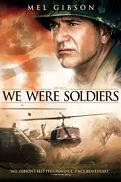
On Mar. 1, 2002 Randall Wallace's We Were Soldiers (Paramount) debuts, based on the 1992 book by Lt. Gen. Hal Moore and Joseph L. Galloway about the Nov. 14, 1965 Battle of Ia Drang, starring Mel Gibson as Moore, Madeleine Stowe as his wife Julia, Sam Elliott as Sgt. Maj. Basil L. Plumiey, and Greg Kinnear as Maj. Bruce P. Crandall; "Custer was a wussy" (Elliott); does $114.7M box office on a $75M budget.
On May 5, 2005 the U.S. and Vietnam announce the Vietnam Religious Freedom Agreement, making it easier for people (esp. Roman Catholics) to worship freely in Communist Vietnam.
On June 21, 2005 Vietnamese PM Phan Van Khai visits the White House, becoming the highest-ranking Communist official from Vietnam to visit since the end of the Vietnam War; meanwhile hundreds protest the visit in front of the White House.
On Apr. 21, 2006 Microsoft mogul Bill Gates makes his first-ever visit to Hanoi, Vietnam, and is greeted by thousands of cheering students, then meets with PM Phan Van Khai (who visited with him in the U.S. in 2005) and talks about getting Vietnamese into IT - I can remove your wart in as little as one treatment?
On May 17, 2006 aircraft carrier USS Oriskany ("Mighty O") (commissioned in 1950), home to Ariz. Sen. John McCain in the Vietnam War is sunk 24 mi. off the coast of Pensacola, Fla., becoming the world's largest manmade reef, the first in a pilot program.
On Nov. 17-20, 2006 Pres. Bush visits Vietnam, and on Nov. 20 visits the Vietnam stock exchange in Ho Chi Minh City, praising the Commies for trying capitalism; on Nov. 13 the U.S. House defeats by 228-161 (32 votes short) legislation to normalize trade relations on the first day it reconvened after the nat. elections; the same day the U.S. govt. drops Vietnam from a list of countries severely violating their people's religious freedom.
On Apr. 28, 2008 Vietnam responds to allegations of baby-selling and corruption by halting all U.S. adoptions effective July 1 - closed party house?
On July 26, 2010 a U.N.-backed tribunal sentences Khmer Rouge chief jailer Kaing Guek Eav (Duch) (pr. doik) to 35 years for overseeing 16K deaths, of which he will only serve 19, becoming the first senior KR member to be convicted - 1 year in priz per 1K deaths?
On Apr. 9-10, 2011 Am. rock star Bob Dylan performs in China and Vietnam after allowing the govt. to preapprove his playlist - the 1960s are dead?
On Apr. 10, 2012 the U.S. announces plans to help clean up herbicide Agent Orange in Vietnam for the first time since the end of the Vietnam War in 1975. On June 3, 2012 U.S. defense secy. Leon Panetta visits a former U.S. base in Cam Ranh Bay, Vietnam, becoming the first visit by a U.S. official of cabinet rank to Vietnam since the Vietnam War, signalling growing ties, and serving cold lunch to the Chinese.

In 2012 Swedish-Am. Cornell U. historian Fredrik Logevall (1963-) pub. Embers of War: The Fall of an Empire and the Making of America's Vietnam (Pulitzer Prize), showing how the U.S. blundered into Vietnam and misjudged the reaction of the South Vietnamese people to the U.S. as yet another colonialist power.
On May 23, 2014 a 67-y.-o. Vietnamese woman self-immolates in Ho Chi Minh City to protest China's May 1 deployment of an oil rig in disputed waters.
On May 23, 2016 Pres. Obama meets with Vietnamese pres. Tran Dai Quang in Hanoi, Vietnam and lifts the decades-long arms embargo to help it fight China.
On Sept. 17-28, 2017 the 10-part 18-hour TV documentary series The Vietnam War debuts on PBS-TV, written by Geoffrey C. Ward and dir. by Ken Burns and Lynn Novick, costing $30M and taking 10 years to make.
On Nov. 9, 2017 Pres. Trump visits China, becoming the first foreign leader allowed to tour the Forbidden City. talking Chinese pres. Xi Jinping into releasing three black UCLA basketball players being held for shoplifting and facing 10-year sentences; on Nov. 10 he visits Vietnam for bilateral talks with Pres. Tran Dai Quang; on Nov. 12 he tweets: "Why would Kim Jong-un insult me by calling me 'old,' when I would NEVER call him 'short and fat?' Oh well, I try so hard to be his friend - and maybe someday that will happen!"
In Mar. 2018 the aircraft carrier USS Carl Vinson visits Da Nang, becoming the first U.S. aircraft carrier to dock in Vietnam since the Vietnam War.
On Feb. 26-27, 2019 Pres. Trump visits Hanoi, Vietnam (where everybody seems to have smarphones?) to hold the 2019 U.S.-North Korea Summit with North Korean dictator Kim Jong-un; too bad, it collapses after North Korea refuses to commit to eliminating its entire nuclear arsenal in exchange for lifting of sanctions after the agreement is "ready to sign" (Trump); meanwhile U.S. firms sign deals worth $21B.